 14/04/2013 18:32 14/04/2013 18:32 |
|
| | | OFFLINE | | Post: 26.562
Post: 9.049 | Registrato il: 28/08/2005
Registrato il: 20/01/2009 | Administratore | Utente Master | |
|


ALWAYS AND EVER OUR MOST BELOVED BENEDICTUS XVI


See preceding page for earlier entries today, 4/14/13...


Two days away from B16's 86th birthday, we look back at the countdown last year to his 85th:

A book for the Pope's 85th birthday
Translated from the 4/10-4/11/12 issue of

Benedikt XVI — Prominente über den Papst (Benedict XVI: Famous people speak about the Pope) is the title of a book presented to the Pontiff on Angel's Monday, April 9 in Castel Gandolfo after the Regina calei prayers, by Edmund Stoiber, who was Minister President of Bavaria from 1993-2007.
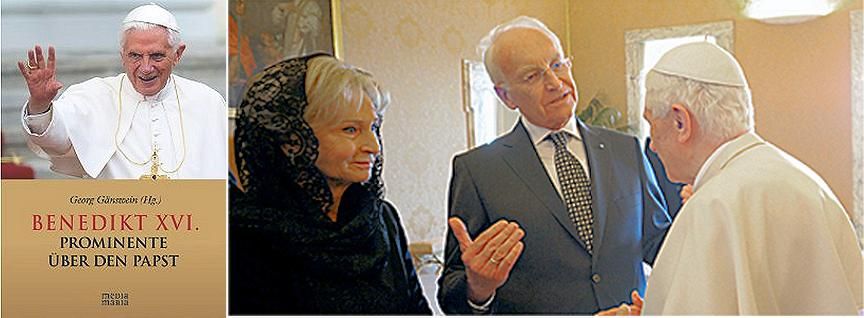
We publish herewith a translation [in Italian, from the German] of the Preface of Mons. Georg gaenswein, Benedict XVI's private secretary, who wrote one of the testimonials and edited the book published by Media Maria Verlag of Germany.
NB: As this book was conceived for the German market, the prominent personalities who give their testimonials in the book are all German.
Twenty persons speak out
about Pope Benedict XVI
Foreword
by Georg Gaenswein
On April 19, 2005, three days after his 78th birthday, cardinals assembled in Conclave in the Sistine Chapel elected the prefect of the Congregation for the Doctrine of the Faith, Cardinal Joseph Ratzinger, to be the head of the Catholic Church. He chose to be called Benedict XVI.
On April 16, 2012, Pope Benedict XVI will turn 85 and will then be completing seven years of his Pontificate.
This book - which some readers may find rather sweeping and 'promotional' - was not meant to be anything showy or sensational, but simply a modest birthday gift for the Holy Father.
Twenty personalities from the Church, politics, culture, economy and sports each agreed to write a short contribution expressing their personal view of the person and work of the Pontiff.
As diverse as the biographies and activities of the authors are their experiences and perspectives from which emerge a portrait of the Supreme Pastor of the Church.
Appropriately, not just Catholics have expressed themselves but also evangelical Christians. They do not hide their religious faith, nor do they fear to indicate certain desiderata from their own personal viewpoints.
Every contribution is like a piece in a mosaic which ultimately contributes to a multicolored image in which it is possible to identify the essential contours of Pope Benedict XVI's Pontificate.
The titles of the various essays follow a thread and offer a panoramic view of the contents. The presentations are such that the reader will not just take note of the book but become truly immersed in what it says. And I cannot but invite you from the heart to do so. It is certainly worth reading.
It might be superfluous to note but for reasons of correctness, it must be underscored expressly that this work is not anything obliging produced by commission 'from the top'.
The writers were not given any instructions - everyone had full freedom to say what they wished. Nor was there any censorship at all. Each one wrote what he had in his mind and in his heart, and each naturally takes responsibility for what he says.
But one thing that they all had in common was the sincere desire to do justice to Pope Benedict, but without blinders. Moreover, there was no room here for 'political correctness'.
Stated positively, what served as an orientation for the authors was 'that initial goodwill without which there can be no understanding', to use the words of the Holy Father in his Foreword to Jesus of Nazareth, Volume 1.
All the contributors did feel themselves committed to such a request by conviction and by inclination.
The authors wish the Holy Father, on his 85th birthday, health in body and in spirit, and the abundant blessings of God in everything he does: Beatissimo Pater, ad multos annos, ad multos et felicissimos annos!

The following article this time last year was almost typical of the standard commentary made in connection with Benedict XVI's double annivereary which considered the possibility of his resignation but concluded it was most unlikely. [As did most of us Benaddicts, I think...]
Papal milestones next week
prompt celebration and speculation
By Francis X. Rocca

VATICAN CITY, April 12 (CNS) -- Pope Benedict XVI's 85th birthday, April 16, and the seventh anniversary of his election, April 19, are obviously occasions for wishing the Pope well and reflecting on the events of his reign thus far.
Inevitably, however, these milestones also prompt speculation about what Vatican officials and observers refer to diplomatically as "papal transition."
Pope Benedict, after all, is already the sixth-oldest Pope since the 1400s, when records became available. It has been almost two years since he told a German interviewer, "My forces are diminishing" and that, when it comes to public appearances, "I wonder whether I can make it even from a purely physical point of view."
Last fall, the Pope stopped walking in processions up the main aisle of St. Peter's and started riding a mobile platform instead; in March, it was revealed that he sometimes walks with a cane.
The Pope's schedule grew lighter last year, as he stopped meeting one-on-one with most visiting bishops. During this year's Holy Week liturgies, television viewers around the world could see unmistakable signs of fatigue on the pontiff's face.
While none of this suggests that the Pope does not have years of life ahead of him, a number of commentators have asked in print, and many more have done so off the record, if he might be getting ready to step down. [I personally think all the speculation is intended only to generate headlines and fuel further speculation, rather than a genuine conviction on the part of the speculators that this Pope is contemplating to resign at all, lacking any valid reason or force majeure.]
Pope Benedict himself has said that a Pope might have an "obligation to resign" once he "is no longer physically, psychologically, and spiritually capable of handling the duties of his office."
Americans may be especially inclined toward such speculation at the moment, encouraged by last month's English release of the 2010 Italian movie "We Have a Pope," in which a fictional pontiff flees from the demands of office.
As tempting as filmmakers and journalists might find so dramatic a scenario, the evidence for it is less persuasive when seen in proper context.
Consider, for example, that the public first saw Pope Benedict walking with a cane as he was about to board a plane for a 14-hour flight to Mexico, the first stop on a six-day trip that also took him to Cuba.
Less than 78 hours after returning from Havana to Rome, the presumably still-jet-lagged Pope was offering Palm Sunday Mass in St. Peter's Square, the first celebration in his busiest week of the liturgical year.
No clear-eyed observer can deny that Pope Benedict is unusually robust for his age. He is reportedly at work on the third volume of his bestselling "Jesus of Nazareth" series and is presumed to be writing at least one encyclical: on the theological virtue of faith, to follow his works on charity ("Deus Caritas Est") and hope ("Spe Salvi").
The Pope will be traveling to Lebanon this September, and the Vatican has done nothing to discourage the widespread assumption that he will follow established papal precedent by attending World Youth Day celebrations next summer in Rio de Janeiro.
As the Pope told former Cuban leader Fidel Castro, also 85, at a meeting in Havana in March: "Yes, I'm old, but I can still carry out my duties."
Pope Benedict's vitality is strikingly clear when one compares his physical and mental state with that of his predecessor. The current Pontiff is already older than Blessed John Paul II was when he died in 2005, after a long struggle with Parkinson's disease and other ailments.
The contrast between the two men is especially significant when one considers that Blessed John Paul seriously considered resigning on at least two occasions, his 75th and 80th birthdays, according to books by his former personal secretary and the postulator for his canonization.
The postulator, Msgr. Slawomir Oder, has written that Blessed John Paul sought the guidance of experts as he pondered resignation, "consulting in particular then-Cardinal (Joseph) Ratzinger," now Pope Benedict.
Whatever Cardinal Ratzinger may have advised, Blessed John Paul finally decided that it was, in his own words, his "duty to continue to carry out the job for which Christ the Lord has called me, as long as he, in the mysterious designs of his providence, will want."
If a leader as traditional as Pope Benedict does not consider Blessed John Paul's example a binding precedent, he clearly sees it as an inspiring standard for his own conduct. Concluding his homily at Blessed John Paul's beatification Mass last May, Pope Benedict paid a personal tribute to his predecessor's "witness in suffering."
"The Lord gradually stripped him of everything," Pope Benedict recalled, "yet he remained ever a 'rock', as Christ desired. ... In this way he lived out in an extraordinary way the vocation of every priest and bishop to become completely one with Jesus, whom he daily receives and offers in the Church."
[In the only videotaped English language interview he ever gave, Cardinal Ratzinger told EWTN's Raymond Arroyo back in 2004, who asked him about his repeated attempts to resign from the CDF, that seeing how John Paul II was carrying on despite his illness, it was out of the question for him to insist on quitting!]

April 13, 2012
AVVENIRE, the newspaper of the Italian bishops' conference, is coming out with a special on Benedict XVI on Monday, April 16, nad has opened a window for readers to post birthday and papal anniversary wishes for the Pope at the ff link:
http://www.avvenire.it/Chiesa/Pagine/compleanno-papa.aspx
On Monday, April 16, Joseph Ratzinger.Benedict XVI - 'simple and humble worker in the vineyard of the Lord", as he called himself shortly after his election to the Chair of Peter - will turn 85.
It is a day of celebration for the Church, for Catholics and for so many who have learned to appreciate a pastor who is gentle but firm, and a man who wins people over by the clarity of his thinking and the kindness of his personality.
To honor the Pope's birthday, many initiatives have been announced. Avvenire, too, wishes to express the gratitude and affection of so many Italians with a special edition which will be in newsstands and in the parish churches on Sunday, April 15.
Visitors to www.avvenire.it can send their birthday greetings to the Holy Father with a brief text in the window provided for the purpose.
http://www.avvenire.it/Chiesa/Pagine/compleanno-papa.aspx
And there is another, imminent occasion for joy: April 19 will be the seventh anniversary of the Pontificate of Papa Ratzinger - a father to all, and a Pontiff that is ever more loved around the world.


[Modificato da TERESA BENEDETTA 16/04/2013 18:04] |
| |
|
| |
 14/04/2013 20:42 14/04/2013 20:42 |
|
| | | OFFLINE | | Post: 26.563
Post: 9.050 | Registrato il: 28/08/2005
Registrato il: 20/01/2009 | Administratore | Utente Master | |
|
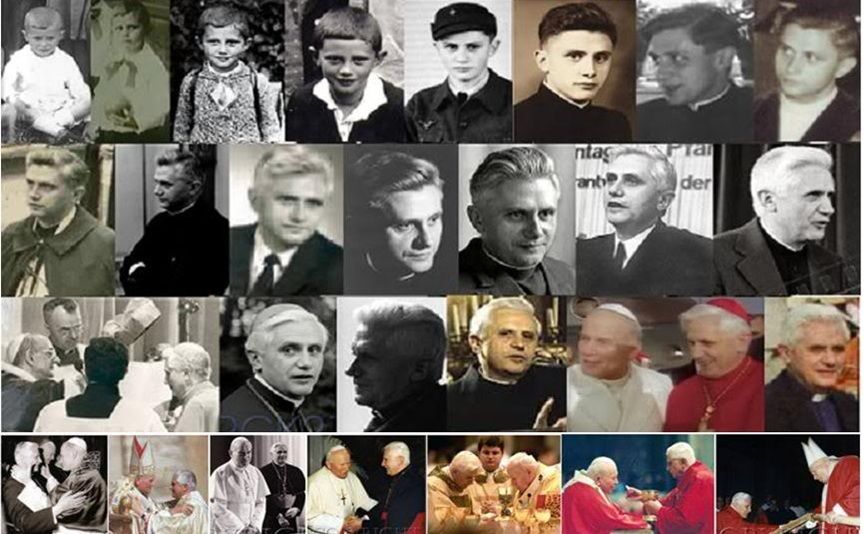 I have been re-reading Peter Seewald's September 2005 biography of Joseph Ratzinger entitled BENEDICT XVI: AN INTIMATE PORTRAIT, by a man who has known him since 1992, when he was first assigned to write a profile on someone he had to research thoroughly through what the media had wirtten about him and from the testimony of his colleagues, friends and enemies. Eventually, he would come to produce two book-lenth interviews with Cardinal Ratzinger and the unprecedented sit-down interview with a Pope published in 2010 as LIGHT OF THE WORLD... In INTIMATE PORTRAIT, I keep being surprised by new details I had forgotten, so I thought I would quote some excerpts from time to time, in an opportune way. And I find that his very Preface is most opportune at this time, indeed almost prophetic, in his choice of what he emphaisized in the Preface, which corresponds to the very themes evoked by the man who was elected to succeed Benedict XVI as Pope...
I have been re-reading Peter Seewald's September 2005 biography of Joseph Ratzinger entitled BENEDICT XVI: AN INTIMATE PORTRAIT, by a man who has known him since 1992, when he was first assigned to write a profile on someone he had to research thoroughly through what the media had wirtten about him and from the testimony of his colleagues, friends and enemies. Eventually, he would come to produce two book-lenth interviews with Cardinal Ratzinger and the unprecedented sit-down interview with a Pope published in 2010 as LIGHT OF THE WORLD... In INTIMATE PORTRAIT, I keep being surprised by new details I had forgotten, so I thought I would quote some excerpts from time to time, in an opportune way. And I find that his very Preface is most opportune at this time, indeed almost prophetic, in his choice of what he emphaisized in the Preface, which corresponds to the very themes evoked by the man who was elected to succeed Benedict XVI as Pope...
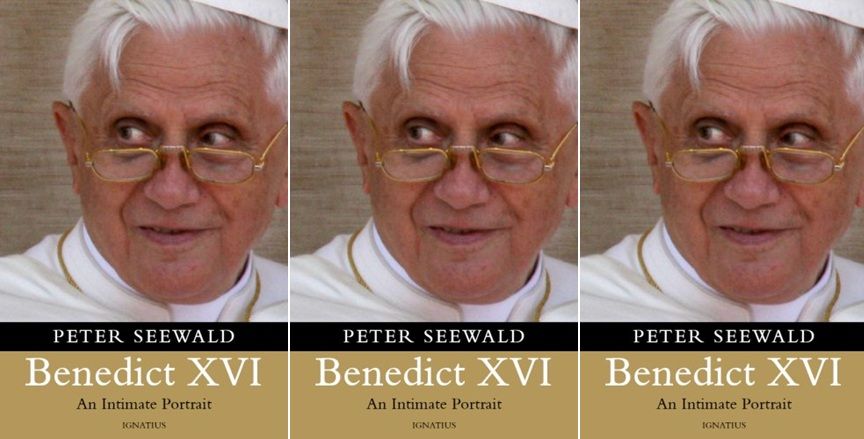
...I came to know Joseph Ratzinger as a great man for patience, as aspiritual master who can give answers. Here was someone who simply understood people, who had retained the liveliness of youth. Someone who did not burn out quickly but in some way remained whole - and most impressive in his attitude of humility, with which he makes small things in others seem great.
Joseph Ratzinger is a born teacher, but he did not want to become Pope. Even after the Conclave, on the loggia of St. Peter's, his face showed he traces of an inner struggle. And he probably felt like crying, so disturbingly moved was he by the condescension of the greta God who entrusted him, at the end of his lifepath, with the keys of the kingdom.
The man from bavaria - contary to all the projections dumped onto his shoulders - is a revolutionary of the Christian type. Seeking out what was lost and saving it is the constant element in his life.
An inconvenient man who cna seize on the spirit of the times, who warns people against the aberrations of modern life.
Anyone who really wants change, he cries out, needs a change in his consciousness and in his personal behavior - anything tlse is insufficient.
Now as Benedict XVI, the most powerful German at the beginning of the new millennium may offer a new opportunity for Europe, and especially, for his homeland.
Peter's Sucessor has given an exciting motto for this: That would mean something like a 'Benedictizing' [referring to St. Benedict] of the Catholic Church, a healthy revitalization of mercy, of the origin of the mystery.
This is an approach cased not on activism or consdierations of feasibility, but on faith. And the Pontifex in Rome could find himself helped not only by a reawakened longing for meaning and a new consciousness that truth is indispensable, but also by a new generation of young Christians whose desire is to live out their fiath in all its vitality and fullness once more, piously and without inhibitions. [We saw them in Cologne and Sydney and Madrid, and will see them in Rio... and very likely in our own parishes.]
"The Church is certainly not old and immobile", declared the new Pope enthusiastically [in his installation homily]. "No, she is young and alive".
It was also untrue, he said that young people are merely "materialistic and egotistic: young people want and end to be put to injustice. They want inequality to be overcome and for everyone to be given his share of the good things of the world. They want the oppressed to be given their freedom. They want great ness. They desire goodness. And that is why the young... are once again wide open for Christ".
And then he added, just like a rebel of earleir times, "Anyone who has come to Christ seeking what is comfortable has indeed come to the wrong address". And quite certainly, anyone who seeks that with Pope Benedict, too.
- Peter Seewald
Abbey of Benediktbeuern
September 2005
 |
| |
 15/04/2013 02:03 15/04/2013 02:03 |
|
| | | OFFLINE | | Post: 26.564
Post: 9.051 | Registrato il: 28/08/2005
Registrato il: 20/01/2009 | Administratore | Utente Master | |
|
 Since the event is potentially historic, here is how the AP reported Pope Francis's first concrete move towards reforming the Roman Curia...
Pope names cardinals to advise him
Since the event is potentially historic, here is how the AP reported Pope Francis's first concrete move towards reforming the Roman Curia...
Pope names cardinals to advise him
on running the Church and reforming
the Vatican bureaucracy
by Nicole Winfield

VATICAN CITY, April 13 (AP) - Pope Francis named eight cardinals from around the globe Saturday to advise him on running the Catholic Church and reforming the Vatican bureaucracy, marking his first month as Pope with a major initiative to reflect the universal nature of the Church in key governing decisions.
The advisory panel includes only one current Vatican official. The rest are cardinals from North, Central and South America, Africa, Asia, Europe and Australia. Many have been outspoken in calling for a shake-up of the Vatican bureaucracy, which was last reformed 25 years ago, while others have tried to clean up the Church from sexually abusive priests.
In the run-up to the conclave that elected Francis the first Latin American Pope one month ago, many cardinals demanded the Vatican be more responsive to their needs on the ground and said the Holy See bureaucracy itself must be overhauled. Including representatives from each continent in a permanent advisory panel to the Pope would seem to go a long way toward answering those calls.
In its announcement Saturday, the Vatican said Francis got the idea to form the advisory body from the pre-conclave meetings where such complaints were aired. "He has formed a group of cardinals to advise him in the governing of the universal church and to study a revision of the apostolic constitution Pastor Bonus on the Roman Curia," the statement said.
Pope John Paul II issued Pastor Bonus in 1988, and it functions effectively as the blueprint for the administration of the Holy See, known as the Roman Curia, and the Vatican City State. The document metes out the work and jurisdictions of the congregations, pontifical councils and other offices that make up the governance of the Catholic Church.
Pastor Bonus itself was a revision of the 1967 document that marked the last major reform of the Vatican bureaucracy, undertaken by Pope Paul VI.
A reform of the Vatican bureaucracy has been demanded for years, given that both John Paul and Benedict XVI essentially neglected in-house administration of the Holy See in favour of other priorities. But the calls for change grew deafening last year after the leaks of papal documents exposed petty turf battles within the Vatican bureaucracy, allegations of corruption in the running of the Vatican city state, and even a purported plot by senior Vatican officials to out a prominent Catholic as gay. [Please enlighten me as to why this short list of 'petty' concerns triggered such an exaggerated reaction where the serious matter of sex abuses committed by priests and the permissiveness of their bishops hardly received that kind of reaction from the local churches! Where is the sense of proportion here?]
Francis's advisory group will meet in its inaugural session Oct. 1-3, though Francis is already in contact with the group's members, the Vatican said. No other dates were announced, an indication that Francis is in no particular hurry to overhaul things.
The Vatican spokesman, the Rev. Federico Lombardi, stressed that the cardinals are a consultative body, not a decision-making one, and that they won't take the place of the Vatican bureaucracy.
His comments appeared aimed at reassuring Vatican bureaucrats that they weren't being sidelined by a counterweight advisory body that better reflects the geographic distribution of today's Church.
The Church is growing and counts most of the world's Catholics in the southern hemisphere, while it's shrinking in Europe. Yet the Vatican and the 200-strong College of Cardinals, traditionally the Pope's primary advisers, remain heavily European. [For which there are obvious historical reasons! You cannot expect the Third World countries where Catholic history counts just decades to instantly churn out as many cardinals as the Old World which has been doing that for centuries! In time, and not far off, the Third World will have its due share of eminences, literally and figuratively. And yet, even the present College of Cardinals, so criticized for not having proportional representation - as though it were a political parliament rather than an assembly of men who are supposed to be the best and the brightest in the Church - did decide to elect the first Pope to come from a non-European country.]
Lombardi said the fact that Francis selected cardinals from every continent indicated he wanted to reflect the universal nature of the church in Vatican decision-making.
"The Roman Curia retains all its fundamental functions helping the Pope in the daily governance of the universal Church," Lombardi told Vatican Radio. "The naming of this group adds to this, in a certain sense integrates it, with a universal point of view and voices from different parts of the world."
The members of the panel include Italian Cardinal Giuseppe Bertello, president of the Vatican city state administration — a key position that oversees, among other things, the Vatican's profit-making museums. [Yes, but what does the Museums' revenue have to do with the universal Church - it all goes to defray the expenses of running Vatican City State itself. Of course, some Italian media are already saying it means Pope Francis will probably name Cardinal Bertello as Secretary of State. Bertello happens to be among the Curial officials promoted to cardinal by Benedict XVI in the consistory of February 2012, for which he got unanimous flak, as though the persons he named cardinals were unworthy of the dignity and were only named because of the Curial offices they held (and because they were all said to be 'Cardinal Bertone's proteges'). As if Benedict XVI would have appointed them to those positions only on Bertone's say-so, even if they had been incompetent, ignoring better men in the process! No one in media has said that any of those Curial cardinals are incompetent, or that there were others better qualified for the positions they were given. So, could they have been so bad then, if now, the irreproachable Pope Francis is contemplating naming one of them his Secretary of State?]
The non-Vatican officials include Cardinals Francisco Javier Errazuriz Ossa, the retired archbishop of Santiago, Chile; Oswald Gracias, archbishop of Mumbai, India; Reinhard Marx, archbishop of Munich and Freising, Germany; Laurent Monsengwo Pasinya, archbishop of Kinshasa, Congo; Sean Patrick O'Malley, the archbishop of Boston; George Pell, archbishop of Sydney, Australia; and Oscar Andres Rodriguez Maradiaga, archbishop of Tegucigalpa, Honduras, who will serve as co-ordinator.
Monsignor Marcello Semeraro, bishop of Albano, Italy. will be the panel secretary.
O'Malley, a Capuchin friar, has spent his career cleaning up churches from sexually abusive priests. [Really, where did he do that outside of Boston????] Pell was outspoken in the run-up to the conclave about the need for reform in the bureaucracy. [Ugh! Remember that stab=in-the-back interview he gave the day Benedict XVI stepped down as Pope?] Maradiaga heads the Church's Caritas International charity federation and is a rare moderate in the College of Cardinals who hasn't shied from criticizing the failings of the Curia.
[For all the ongoing talk in the past year or more about the faults and failings of the Roman Curia, I have yet to read any specific complaint by any of these cardinals - or by anyone else, for that matter - against any specific office or official in the Curia, other than the generic charges directed at Cardinal Bertone, who, of course, has attempted specific foolish things thankfully foiled by Benedict XVI. How can the media just parrot blanket charges that have absolutely no specificity at all? It amounts to trial by lynching of the entire Curia.]
In theory, all popes have cardinals at their disposal to serve as advisers; advising the pope is a cardinal's main job aside from voting in conclaves. But neither John Paul nor Benedict made frequent use of their cardinal advisers, in part because they were so far away and numbered more than 200.
With such a small group of men hand-picked by the pope to specifically advise him in running the church and reforming the Vatican, it appears Francis wants a more collegial type of governance for his papacy. That also would meld with his reluctance to call himself pope in favour of his other main title, bishop of Rome.
That said, the former Cardinal Jorge Mario Bergoglio is on record saying that when it comes time to actually making decisions, he is very much a loner.
"One can ask for advice but, in the end, one must decide alone," he said in the 2010 book "The Jesuit" written by his authorized biographer. Doing so means making mistakes, and Bergoglio acknowledged he had made plenty in his lifetime.
"That's why the important thing is to ask God," he said.
[Wasn't that the case with Benedict XVI, who got all sort of relentless missile hits for making final decisions by himself? But what was 'objectionable' in him is seen as a virtue for his successor!]
In the run-up to his election, cardinals were very clear that the status quo of the Vatican was untenable. [Yeah, a conclusion based mostly, it seems, on a totally a-critical acceptance of Vatileaks on the terms defined by Vigano and Gabriele! Simply because the two miscreants provided them the cover to say "Me, too!" without having to go into any specifics![ Naming a commission of advisers including those most critical of the status quo indicates major reform could be on the horizon.
Some cardinals said they wanted term limits on Vatican jobs to prevent priests from becoming career bureaucrats. [But there are no term limits of cardinals who are metropolitan bishops - are they claiming that there wouldn't be any 'bureaucratic risk' with them whereas there would be with Curial cardinals?]
They wanted consolidated financial reports to remove the cloak of secrecy from the Vatican's murky finances. [Excuse me, Benedict XVI, with the assistance of Moneyval, has already done that! Or are they not reading the news at all?]
And they wanted regular Cabinet meetings where department heads actually talk to one another to make the Vatican a help to the Church's evangelizing mission, not a hindrance. [That's sheer baloney! What individual congregations could possibly impact the evangelizing work of the local Churches [other than the yet-to-be-fully-functional Pontifical Council for the New Evangelization], since local churches have total autonomy within their respective dioceses? Did Cardinal Bergoglio, for instance, ever complain that some Curial office was hindering him from carrying out his pastoral work? If so, which one? The Curial offices are all so specifically defined by Pastor bonus that overlapping functions are minimal, so with Curial offices that are autonomous of each other, what is served by 'regular cabinet meetings' other than a chance to clear out communications channels among them? The Curia certainly does not provide any material assistance to the local Churches, only guidelines to implement the Magisterium.]
They also said they wanted the Vatican to serve the bishops in the field, and not the other way around. [Ummm, let's see: The CDF needs the input of the bishops in the field to do what they have to do against abusive priests, for instance, or priests who want to be laicized, or theologians who are out of line. The Congregation for Saints needs local input before it can take a sainthood cause to the Vatican level. Divine Worship provides guidelines to bishops, but the latter are supposed to have local autonomy in terms of liturgy, so they can ignore the Vatican in this respect, as many have ignored Benedict XVI on Summorum Pontificum. The Congregation for the Clergy cannot supervise a bishop's priests for them - it simply provides guidelines. The Congregation for Bishops processes candidates for the episcopacy - they need local input to do that. We can go down the line, and see that bishops are not asked to 'serve' the Curia other than with information they need to provide anyway in order to process their requests to the Vatican, from causes for sainthood to requests for marriage annulments...So you see how easy it is to puncture a generic accusation once you try to reduce it to specifics, which is what accusations must be.]
"It just doesn't work either very quickly or very efficiently," U.S. Cardinal Francis George, the archbishop of Chicago, said in an interview soon after Francis was elected. "Take marriage cases: People shouldn't have to be asked to wait three, four, five, six years to get a response" for a request for an annulment. [Ah, so! at last, we have one specific complaint - against the Roman Rota. But how does a delay in granting a marriage annulment hinder evangelization at all? What percentage of the faithful in a diocese are requesting for a marriage annulment anyway????]
Aside from Saturday's announcement, Francis has made one Vatican appointment so far, naming a member of his namesake Franciscan order to the important No. 2 spot at the Vatican's congregation for religious orders.
His most eagerly-watched appointment has yet to come: that of the Vatican secretary of state, who runs the day-to-day administration of the Holy See. Currently, the position is held by Cardinal Tarcisio Bertone, a 78-year-old canon lawyer whose administrative shortcomings have been blamed for many of the Vatican's current problems today.
George Weigel, a papal biographer who interviewed Bergoglio last May for his new book "Evangelical Catholicism," said Francis understands well the problems of the Curia, saying he "displayed a shrewd, but not cynical, grasp of just what was wrong with the church's central bureaucratic machinery, and why."
"I think we can expect the new pope to lead the church in a purification and renewal of the episcopate, the priesthood, the religious life, and the curia, because he understands that scandal, corruption, and incompetence are impediments" to the mission of spreading the faith, Weigel wrote in a recent essay. [And that's supposed to be the sum of Pope Francis's insight into the Curia? Isn't that obvious even to an ordinary person? 'Scandal, corruption and incompetence' need to be documented, however - they cannot just be flung out like cooked pasta to make it stick!]
Cardinal Timothy Dolan of New York, who has become something of the ringleader of the reform group, said he had high hopes that Francis would turn the Holy See into a model of good governance given his background and no nonsense style.
"Sometimes in the past the curia has been an example of what not to do, instead of what to do," Dolan said in an interview after Francis's installation. "We need to look to the Holy See and the Roman Curia as a model of good governance, of honesty, of simplicity, of frugality, of transparency, of candour, of raw Gospel service, of a lack of careerism, of people who are driven by virtue."
[All very noble sentiments, but isn't it uncharitable of cardinals to make generic statements without substantiating them? At least, Cardinal George gave one example - though it is far from showing careerism or corruption or dishonesty, not even incompetence, because there may be other explanations for delaying a decision on a marriage annulment. How different are these cardinals then from Paolo Gabriele saying 'there is evil and corruption everywhere in the Vatican?]
Dolan suggested that one crucial area of reform would be imposing term limits on Vatican bureaucrats to prevent them from becoming lifers. He said there was also no reason why more laymen and women couldn't be brought into the Vatican bureaucracy, and that the administration itself could shrink.
Archbishop Claudio Mario Celli, who heads the Vatican's social communications office, wants greater communication within the various Vatican departments, including regularly scheduled meetings of department heads. [Great resource person to cite! - considering that, in practical terms, the only thing he appears to have accomplished in his office is to open a Twitter account for the Pope. Even the highly reputed Mons. Foley was unable to do anything in two decades with the Pontifical Council for Social Communications - which appears to have no jurisdiction at all over the actual Vatican media outlets, and whose rationale for being I still do not comprehend.]
"We need a more synergetic activity," Celli said in an interview. "If we want to have a more effective service in the church, we need to have a symphonic approach." [He is, of course, quoting from one of Benedict XVI's last addresses as Pope, but off-context.]
George, the archbishop of Chicago, dismissed speculation that one area of Francis' reforms would involve closing the Vatican bank, the Institute for Works of Religion, which has long been a source of scandal for the Vatican.
Doing so would be financial suicide for the Vatican, since it currently provides the Pope with about 50 million euros ($65 million) a year in investment income. The bank invests assets of its account holders, money that would have to be returned if it were to close.
Lombardi has said any speculation about the IOR's possible closure "is purely hypothetical and isn't based on any believable or concrete facts." [So, the Curia will stay, the bureaucracy will stay, the IOR will stay... i.e., no magic wand, after all, to make all the 'anomalies' under Benedict XVI vanish like a bubble, and make the Church pure and fresh after being so soiled and exhausted! The way the cardinals talked about it after Benedict XVI resigned, you'd think he had left the Church in ruins and was totally clueless about the damage he had done! God forgive them...WHAT THE HELL HAPPENED TO COMMON SENSE, HONESTY AND DECENCY?]
Now, for some realistic commentary from someone who worked for years in the Roman Curia:
Francis, the G8, and
reform of the Roman Curia:
Some musings
by Fr. John Zuhlsdorf
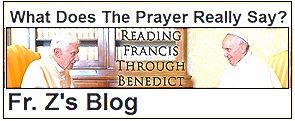
April 13, 2013
...I posted (earlier) about the new G8 that Pope Francis will call together in October. They are supposedly to help with alterations to the constitution called Pastor bonus, that governs the Roman Curia.
We all agree that reform of the Curia is necessary. We can all imagine that Francis was elected because the Cardinals thought he could and would do the job.
Let’s think about this.
First, the G8 (the group of 8 Cardinals) won’t meet until October. That means that not much will be done for about a year or so into this Pope’s pontificate. He has been Pope for about a month. The G8 meets for the first time over half a year from now. They won’t be leaping into action on the day after there meeting. They will have to ponder and consult and listen some more. They will have to draft proposals, which will need study and reflection and more consultation. [As the AP report noted, "Francis is in no particular hurry to overhaul things". OK, guys, you will still have the Curia to kick around some more! But can you do that without any ricochet on the Pope?]
A lot can happen in a year of a pontificate. Consider, for example, what happened in Benedict XVI’s first year after the famous Regensburg Address. Benedict was set to launch a reform of the Curia. He had even started in motion the combination of offices into a new location, hoisted the head of the dicastery for inter-religious dialogue, etc. After Regensburg, that crawled to a halt. A lot can happen in a year of a pontificate. Even six months.
[I get the point, but I respectfully disagree that Regensburg caused a 'halt' in the reform of the Curia. Benedict XVI had to wait for the Curial heads appointed by John Paul II to finish their terms. The last but one only retired less than two years ago! His appointments to replace them were a reform in themselves. And no one has accused him of appointing incompetent Curial heads. But once again, we must remember that most of the Curial offices have maybe 15-50 staff members. Only the Secretariat of State and the Governatorate have employees numbering in the hundreds. How much bureaucracy can there be that a competent Curial head could not handle in, say, a 50-man office like the CDF, where virtually every staff member must multi-task to deal with the variety of problems they have to handle?]
Second, when people start talking about structural reformation, they usually think about term limits. Term limits sweep out the undesirable chaff. That’s what we want in curial reform, right? Out with the chaff? The problem with term limits is that the wheat is also term limited. In the Roman Curia clerics are generally given 5 year appointments. They are appointed ad quinquennium, with possibility of renewal…or not. Fine.
The problem with giving pretty much everyone the heave-ho after 5 years is that you lose both institutional memory and you lose competence. If takes about 5 years to learn some of these complicated positions well.
Moreover, it takes a while to get language skill up to speed. If anyone is under the illusion that just because a man studied in Rome he speaks Italian well (much less writes it well), well… get over that. They live and study and work in their own little national ghettos where they don’t have to speak or write in Italian. In most of the universities, profs accept exams and papers in the major languages, since Latin is all but lost.
Furthermore, and this is not a secret, bishops are not always eager to let their brightest and best go: they are needed in the diocese. [Vittorio Messori identified the post-Vatican-II priest shortage as being responsible for the generally poorer quality of Curial staff who make up the 'dreadful bureaucracy'.] There is, therefore, a fairly small pool of men who can fill the jobs competently and they need time to get up to speed. In addition, if they are swept out every few years, it may be hard to motivate them.
Some might accuse me of defending “careerism”, which they will identify as a root of problems in the Curia. Term limits, however, might not produce the desired results: a lean but still competent, well-motivated Curia.
“But Father! But Father!”, some of you are itching to say, “What you are saying is an argument in favor of declericalizing the Curia. We need more lay men! And women! They would never be as incompetent and corrupt as those bad male clerics. And there are more of them, too! It’s a larger pool. There’s your solution!”
Curial reform doesn’t eliminate the effects of original sin.
If you are looking for the real corruption, the deep and serious curial corruption, forget about the clerics. For example, in the scandal about the vast overspending on things like flowers for papal events or the building of the Christmas presepio in St. Peter’s Square, the kickbacks and bribes and the differences in actual costs versus what was paid were not going into the pockets of clerics. Lay people are not the silver bullets for the curial werewolf. And the clerics who could name names were shown the door.
And, frankly, some matters have to be handled by clerics.
I don’t know what the G8 are going to recommend (if they recommend anything at all). Having been on the inside for a while, I can say with confidence that the reform of the Roman Curia won’t be among the easiest of many pending herculean labors.
[I'm trying to imagine how the Throne Council will work. If a bishop in the Philippines, say, had a major problem that was not getting the right attention in Rome, would he then have to call Cardinal Gracias in Bombay to present his problem, so that the good cardinal can present it to the Pope, or at least, to the right Curial authority? In effect, the local bishops would get intermediaries who will help them get heard by the Pope. Well, what about writing the Pope directly, especially since Pope Francis is who he is? (Oh, I forgot - Vatileaks has supposedly made it impossible for a bishop to even think of writing the Pope! How silly of me to forget such poppycock!)
As for the cardinal who represents a continent or major region on the Council, how is he expected to get an overview of the situation in his area of jurisdiction? Make each of the local bishops - and perhaps even the parish priests - of the continent report to him regularly about their problems? But can't they already do that with the Apostolic Nuncio in their country? So, anyway, instead of the local bishops having to report to the Pope once every seven years on their situation, or to the Nuncio when they have an urgent problem, they must now report once a year perhaps to their Council cardinal, who then processes all these hundreds of reports and conveys them directly to the attention of the Pope. The cardinal, of course, no matter how eminent, cannot do all that by himself, so he must hire a staff for the sole purpose of communicating and coordinating regularly with all the bishops in his jurisdiction. Hmmm, do we really think the national bishops' conferences are ready to submit themselves to another layer of bureaucracy - because that's what it is - between them and the Pope? Yup, 'tain't easy...
And yet after all this great and interminable hullaballoo over an 'incompetent, corrupt and burdensome Curia', not a single journalist or commentator has come up with an article to substantiate the generic charges, and that is the most maddeningly frustrating of all. The public has been sold a non-existent, or at least undefined and unspecified, rap sheet against an amorphous Curia, even if its offices are well-known and well-defined, and against anonymous 'criminals' with unspecified crimes or failings, tarring everyone with a broad brush.
My conclusion is that if it hasn't been written, it's because there isn't much to write about, and to try to be specific at all would bring down the whole house of cards. Like delayed marriage annulments could hinder the work of evangelization. Like any pastor in the field would use that as a pretext for failing to do what he ought to do. Just ask Cardinal Bergoglio if any 'Curial hindrance' kept him from doing what he did in Buenos Aires..Pope Francis spoke today about hypocrites in the Church detracting from the credibility of the Church. But men of God who bear false witness against their peers are even worse...WHAT IS THIS GENERAL COLLAPSE OF COMMON SENSE AMONG PEOPLE WHO ARE SUPPOSED TO BE AMONG THE MOST INTELLIGENT AND HOLIEST PERSONS IN THE WORLD? AND WHY?
[Modificato da TERESA BENEDETTA 15/04/2013 03:24] |
| |
 15/04/2013 05:16 15/04/2013 05:16 |
|
| | | OFFLINE | | Post: 26.565
Post: 9.052 | Registrato il: 28/08/2005
Registrato il: 20/01/2009 | Administratore | Utente Master | |
|
 More than a million visits???
More than a million visits???
I have no idea what the number represents - I suppose visits to the thread devoted to Benedict XVI - but the thread passed the million[mark some time tonight, counting from the time it opened on May 1, 2009, and I thank all who have followed it in some way, regularly or occasionally.
I started tracking the numbers on March 8, 2011 -at which time, it was 303,948, when the thread had been running since May 1, 2009, so that came to an average of 800-some visits a day. Between that day and February 10, the last day of 'normalcy' for me on the Forum, the number was up to 867,443, which represented a daily average of about 900-1000. February 11 and the days that followed threw me in such a state of distraction that I failed to take note of the daily tally until a few days ago, and I realized that for some reason the traffic had doubled to over 2,000 a day, and with the mark passed today, the average daily visits since February 11, 2013, is about 2300.
That puzzles me because I have felt inadequate about my post- February 28 postings on B16 - which are necessarily limited by the scant news and the scarce commentary we are getting about him. And I still have to work out the best way to present the 'Looking back' items.
Not to mention that I have yet to begin posting about Pope Francis in the Church and Vatican thread, as I had planned to do. And now I am realizing I would be unable to do that after all, because of sheer lack of time. I am incapable of doing something half way, and if I started to try to post regularly about the Pope, it shouldn't be half-way. Or half-hearted.
So, for now, I will stick to keeping the Forum fires warm for Benedict XVI - not that he needs it, but that I want to, whereas Pope Francis is more than amply covered elsewhere and everywhere, and I don't think the followers of this thread doubled because visitors have come in search of Francis fare.
[Modificato da TERESA BENEDETTA 15/04/2013 13:44] |
| |
 15/04/2013 14:04 15/04/2013 14:04 |
|
| | | OFFLINE | | Post: 26.566
Post: 9.053 | Registrato il: 28/08/2005
Registrato il: 20/01/2009 | Administratore | Utente Master | |
|

 Monday, April 15, Third Week of Easter
Monday, April 15, Third Week of Easter
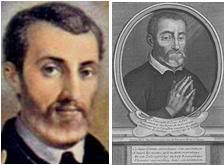 BLESSED CESAR DE BUZ (France, 1544-1607)
BLESSED CESAR DE BUZ (France, 1544-1607)
Jesuit, Founder of Fathers of Christian Doctrine
Born to wealthy parents, Cesar had a choice of careers before him - as a promising writer, or to join the army.
He chose the latter which also enabled him to be a royal courtier. In 1572, he fought with the French army in
the St. Bartholomew's Day massacre, which began with targeted assassination of French Protestant (Huguenot)
leaders and soon turned into mob violence by Roman Catholic groups, in which estimates of the dead ranged
from 5,000 to 30,000, It remains one of the most infamous of crimes imputed to Catholics. Inspired by the life
of St. Charles Borromeo, Cesar decided to become a priest, and was ordained in the Jesuit order in 1582. For
his apostolate, he chose to catechize villagers in out of the way places. This led him to found the Fathers of
Christian Doctrine in 1592 dedicated to family catechesis as a way to ward off heresy among the faithful. In
1666, five volumes of his 'Instructions for families' were published in Paris. St. Francis de Sales would later
call him 'a star of the first magnitude in the firmament of catechesis'. He was beatified in 1975, but his name
is still not included in any online list of Jesuit saints and blesseds, even those updated in 2010.
Readings for today's Mass:
www.usccb.org/bible/readings/041513.cfm
AT THE VATICAN TODAY
Pope Francis met with
- H.E. Mariano Rajoy Brey, President of the Government of Soain, with his spouse and delegation
- His Beatitude Fouad Twal, Latin Patriarch of Jerusalem, and his delegation
= Seven bishops of Italy's Troiveneto region, led by Mons. Francisco Moraglia, Patriarch of Venice,
on ad-limina visit.
One year ago today...
Initial greetings for Benedict XVI's double anniversary:

 Anniversaries: For seven years,
Anniversaries: For seven years,
the Church has been led by
a wise pastor and a courageous man
 Translated from the Italian service of
Translated from the Italian service of

April 14, 2012
On Monday and Thursday, Benedict XVI will be celebrating two important milestones, whose proximity in time serves to make them more extraordinary - his 85th birthday and the seventh anniversary of his Pontificate. Two dates that always call for a new appreciation of his person and his work, as our director Fr. Federico Lombardi does, in his editorial for 'Octavo Dies', the weekly newsmagazine of the Vatican's CTV:
85 years of age and seven years of a Pontificate.
When Cardinal Joseph Ratzinger was elected Pope at age 78, many wondered whether, after the final years of his predecessor that were marked by infirmity, the Pontificate that just begun could be as intense and lasting as one might desire, and if a theologian who for a long time had led a dicastery that was specifically doctrinal could undertake the very different task of pastoral governance of the universal Church.
In these seven years, we have seen Benedict XVI undertake 23 international trips to 23 countries [twice he visited two countries at a time, and he also visited Germany and Spain three times each], as well as 26 pastoral visits in Italy.
We have witnessed four Assemblies of the Bishops' Synod and three quadrennial World Youth Days.
We have received three encyclicals as well as countless other discourses and Magisterial texts.
We have taken part in a Pauline Year and a Year for Priests.
And we have seen the Pope face with courage, humility and determination - that is, with clear evangelical spirit - difficult situations such as the crisis attendant to the sexual abuses committed by priests.
We have read his work on JESUS OF NAZARETH, a story he has presented in a new and original way, as well as his book-length interview LIGHT OF THE WORLD.
Above all, we have learned from the consistency and constancy of his teaching that the priority of his service to the Church and to mankind is to orient human life towards God, the God that Jesus Christ made known to us; that faith and reason help us reciprocally in seeking the truth and in responding to the expectations and questions that each man has and that all mankind have in common; and that forgetting God and relativism are the the most serious dangers of our time.
For all this, we are immensely grateful. And we continue to make the journey with him: towards the next World Encounter of Families [the second with his attendance], towards the Middle East [his third trip to the region, after the Holy Land and Cyprus], towards the Synodal Assembly on the New Evangelization, and towards the Year of Faith - in the hands of God, in the service of God and his Church.
 The following text is the introduction to a book, Joseph Ratzinger; Teologo e Pontefice, that the financial newspaper Il Sole 24 Ore and L'Osservatore Romano will be publishing jointly on April 24. The book will include a dialog between Armando Massarenti and Giuliano Ferrara on secularity, an essay by Lucetta Scaraffia, and a chronology of Benedict XVI's first seven years as Pope, by OR editor Giovanni Maria Vian.
Happy birthday, Joseph!
The following text is the introduction to a book, Joseph Ratzinger; Teologo e Pontefice, that the financial newspaper Il Sole 24 Ore and L'Osservatore Romano will be publishing jointly on April 24. The book will include a dialog between Armando Massarenti and Giuliano Ferrara on secularity, an essay by Lucetta Scaraffia, and a chronology of Benedict XVI's first seven years as Pope, by OR editor Giovanni Maria Vian.
Happy birthday, Joseph!
by Giovanni Maria Vian
Translated from

April 15, 2012
When, on April 19, 2005, 78-year-old Joseph Ratzinger was elected Pope - after less than 24 hours of the most numerous Conclave so far in history - many were surprised.
For one reason primarily: He had been labelled a hardline conservative, and moreover German, a label attached to someone who had authoritatively led the former Holy Office for 23 years, and who had seemed destined to play the kingmaker in the difficult choice of a successor to John Paul II, who had called him to Rome where he became his closest collaborator.
The predictions and expectations turned out to be far from fact, just as the stereotyped image disseminated by many although totally unfounded.
What is certain was that the cardinal who emerged Pope from the Conclave, who had wanted for years to retire to his native Bavaria to devote himself fully to his theological studies, did nothing to get elected.
This was a development he had not sought nor expected. Just as the position that came to him in 1977 that changed the direction of the brilliant 50-year-old theologian's career, when he was named Archbishop of Munich and Freising by Paul VI, and one month later, made a cardinal
Fifteen years earlier, he came to Rome for the first time to take part in the sessions of the Second Vatican Council as the theological consultant to one of the outstanding figures of the German Church at the time, Cardinal Josef Frings of Cologne.
For the 85th birthday of Benedict XVI and the start of the eighth year of his Pontificate, the idea was born to gather together and update in this little book some little-known texts: a dialog, light-hearted but not superficial, between a mouse (Armando Massarenti) and an elephant (Giuliano Ferrara); an essay on how to read the works of Joseph Ratzinvger - not a specialized or systematic guide but an intelligent and comprehensive one from historian Lucetta Scaraffia; and a chronological synthesis of the life of the theologian who became Pope.
This joint initiative by two newspapers - Il Sole 24 Ore and L'Osservatore Romano - is meant to contribute to a 'first appreciation' of the person and the work of an intellectual who has dedicated and continues to dedicate his live to the inexhaustible search for truth, in a continuous dialog between faith and reason, in a language that speaks to everyone.
On the occasion of an important occasion for which one may use the greeting from Byzantine liturgy, èis ète pollà, more familiar in Latin: ad multos annos - May you have many more years! - to wish the Pope a happy birthday.
L'Osseervatore Romano itself came out with its 'birthday issue' one day early, on a Sunday, because last year, April 16 fell on a Monday, when the OR does not come out.
In the simplicity of prayer:
A birthday greeting
to the Holy Father
Translated from the 4/15/12 issue of

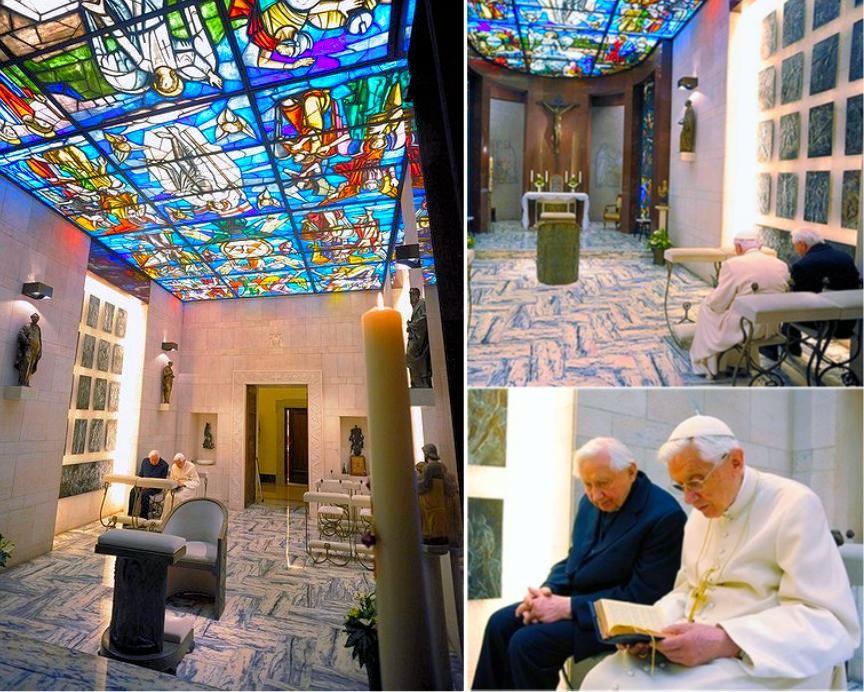
Benedict XVI returned to the Vatican Friday evening, April 13, after being in Castel Gandolfo since the afternoon of Easter Sunday.
The Pope advanced his return to Rome by 48 hours to welcome his brother, Mons. Georg Ratzinger, who arrived from Regensburg to celebrate two significant milestones with him: his 85th birthday on Monday, April 16; the seventh anniversary of his election to be the Successor of Peter on Thursday. April 19; and the anniversary of the inauguration of his Petrine ministry on April 24.
The pictures shown here were taken as the brothers prayed Lauds together Saturday morning in the Pontiff's private chapel, after morning Mass.
It is in the simplicity of prayer that L'Osservatore Romano joins its readers and many other persons throughout the world - men and women, beyond religious distinctions - who wish Benedict XVI a happy birthday.
He who believes is never alone, the Pope likes to repeat, expressing with this statement the mysterious and invisible reality - but not less real for this - of the communion of saints.
Benedict XVI is never alone because he is surrounded by the affection of persons near and far, and by the friendship of the saints [and Jesus, above all

[Modificato da TERESA BENEDETTA 24/04/2013 19:24] |
| |
 15/04/2013 14:20 15/04/2013 14:20 |
|
| | | OFFLINE | | Post: 26.567
Post: 9.054 | Registrato il: 28/08/2005
Registrato il: 20/01/2009 | Administratore | Utente Master | |
|
 I have yet to check what spin the MSM will give this story, considering that 'everyone', starting with the nuns concerned, had said after Pope Francis's election that he was going to take a more lenient line with them, As if there can be any leniency in upholding the doctrine of the faith. You stand by it, or you don't, as the LCWR superiors have failed to do in consistently advocating and practising their own ideas of what Catholic doctrine ought to be...
Pope Francis confirms CDF assessment
I have yet to check what spin the MSM will give this story, considering that 'everyone', starting with the nuns concerned, had said after Pope Francis's election that he was going to take a more lenient line with them, As if there can be any leniency in upholding the doctrine of the faith. You stand by it, or you don't, as the LCWR superiors have failed to do in consistently advocating and practising their own ideas of what Catholic doctrine ought to be...
Pope Francis confirms CDF assessment
of LCWR's doctrinal divergences,
and approves proposed reform program

The Vatican released this bulletin today:
COMMUNIQUE OF THE CONGREGATION FOR THE DOCTRINE OF THE FAITH CONCERNING A MEETING WITH THE PRESIDENCY
OF THE LEADERSHIP CONFERENCE OF WOMEN RELIGIOUS IN THE USA
Today the Superiors of the Congregation for the Doctrine of the Faith met with the Presidency of the Leadership Conference of Women Religious (LCWR) in the United States of America. Most Rev. J. Peter Sartain, Archbishop of Seattle and the Holy See’s Delegate for the Doctrinal Assessment of the LCWR, also participated in the meeting.
As this was his first opportunity to meet with the Presidency of the LCWR, the Prefect of the Congregation, Most Rev. Gerhard Ludwig Müller, expressed his gratitude for the great contribution of women Religious to the Church in the United States as seen particularly in the many schools, hospitals, and institutions of support for the poor which have been founded and staffed by Religious over the years.
The Prefect then highlighted the teaching of the Second Vatican Council regarding the important mission of Religious to promote a vision of ecclesial communion founded on faith in Jesus Christ and the teachings of the Church as faithfully taught through the ages under the guidance of the Magisterium (Cf. Lumen gentium, nn. 43-47).
He also emphasized that a Conference of Major Superiors, such as the LCWR, exists in order to promote common efforts among its member Institutes as well as cooperation with the local Conference of Bishops and with individual Bishops. For this reason, such Conferences are constituted by and remain under the direction of the Holy See (Cf. Code of Canon Law, cann. 708-709).
Finally, Archbishop Müller informed the Presidency that he had recently discussed the Doctrinal Assessment with Pope Francis, who reaffirmed the findings of the Assessment and the program of reform for this Conference of Major Superiors.
It is the sincere desire of the Holy See that this meeting may help to promote the integral witness of women Religious, based on a firm foundation of faith and Christian love, so as to preserve and strengthen it for the enrichment of the Church and society for generations to come.
Pope Francis supports
crackdown on US nuns
By NICOLE WINFIELD

VATICAN CITY. April 15 (AP) — The Vatican said Monday that Pope Francis supports the Holy See's crackdown on the largest umbrella group of U.S. nuns, dimming hopes that a Jesuit Pope whose emphasis on the poor mirrored the nuns' own social outreach would take a different approach than his predecessor. ['Dimming hopes'? It is a definitive putdown! What hopes? 'Social outreach' does not justify defying Catholic doctrine - that's exactly what was wrong with the Latin American socialist concept of liberation theology, and what Pope Francis has denounced as nothing more than acting like a 'pious NGO'!]
The Vatican last year imposed an overhaul of the Leadership Conference of Women Religious after determining the sisters took positions that undermined Catholic teaching on the priesthood and homosexuality while promoting "radical feminist themes incompatible with the Catholic faith." Investigators praised the nuns' humanitarian work, but accused them of ignoring critical issues, including fighting abortion.
On Monday, the heads of the conference met with the prefect of the Congregation for the Doctrine of the Faith, Archbishop Gerhard Mueller, who is in charge of the crackdown.
[What an odious and loaded journalistic term, conjuring images of slavemasters cracking the whip on miscreants and persecuting them in general!] It was their first meeting since Mueller was appointed in July.
In a statement, Mueller's office said he told the sisters that he had discussed the matter recently with Francis and that the pope had "reaffirmed the findings of the assessment and the program of reform."
The conference, for its part, said the talks were "open and frank," and noted that Mueller had informed them of Francis's decision.
"We pray that these conversations may bear fruit for the good of the Church," the conference said on its website.
The Vatican crackdown unleashed a wave of popular support for the sisters, including parish vigils, protests outside the Vatican's embassy in Washington, D.C., and a U.S. Congressional resolution commending the sisters for their service to the country.
Following Francis's election, several sisters had expressed hope that a Jesuit Pope devoted to the poor and stressing a message of mercy rather than condemnation would take a gentler approach than his predecessor, Benedict XVI. [And since when did Benedict XVI preach 'condemnation'? Even Pope Francis does not preach mercy for unrepentant sinners! God grants mercy infinitely but only if we ask for it with genuine repentance for our failings and sins.]
Francis has called for a more "tender" church and one that serves society's poorest — precisely a message American sisters have stressed in their ministry in hospitals, hospices, soup kitchens and schools that serve some of the most marginalized in the U.S.
The Rev. James Martin, a Jesuit author who has been a staunch supporter of the U.S. sisters, cautioned against reading too much into the Vatican statement. [What is there to read 'too much' about? The current Pope agrees with the doctrinal assessment rendered by visitators appointed by his predecessor who investigated the dissident nuns for at least three years. He also agrees with the reform program that the visitators recommended. There is no turning back here, or even, any soft-pedalling. Fr. Martin has chosen to be delusional, feigning 'it's no big deal' perhaps because he is among those who invested too much in the illusion that the new Pope would turn out to be less than orthodox, if not outright liberal.]
He noted that Francis' first appointment to the Vatican bureaucracy was that of the Rev. Jose Rodriguez Carballo as the No. 2 in the Vatican's congregation for religious orders. Rodriguez Carballo had been superior of the Friars Minor branch of the Franciscan order that was founded by the pope's namesake, St. Francis of Assisi, who devoted himself to helping the poor. [So? That's a non sequitur, and no argument at all. Naming the Franciscan superior to the Curia does not necessarily mean the new Pope was giving carte blanche to all religious orders to do as they please!]
Martin said it would have been unusual for Francis to undo a process that has been years in the works and that as a Jesuit he is "naturally going to be sympathetic" to the challenges faced by members of religious orders, such as those represented by the nuns' conference. [Gee, that's some spin, all right! Martin is as usual being overly self-indulgent, but beyond that, he chooses not to acknowledge the decision made by the Pope to confirm what was documented and verified under his predecessor and the program recommended to remedy the nuns' dissidence and lack of discipline. Sympathy for the nuns does not overrule the fact of their misbehavior and the need for the Church to set them straight. There is no way Martin and his ilk can downplay the Pope's decision]
As part of its imposed reforms, the Vatican appointed Seattle Archbishop Peter Sartain and two other bishops to oversee a rewriting of the conference's statutes, to review its plans and programs, approve speakers and ensure the group properly follows Catholic prayer and ritual.
The conference represents about 57,000 sisters, or 80 percent of U.S. nuns. It has argued that the Vatican reached "flawed" conclusions based on "unsubstantiated accusations." The group's officers have said they would participate in discussions with Sartain "as long as possible" but vowed they would not compromise their group's mission. [What exactly is their mission anyway? No one is keeping them from doing service to the poor as much as their bleeding hearts will let them. But if they define their mission as advocating that they are 'beyond the Church and beyond Jesus' as they have arrogantly proclaimed, then they should leave the Church and set up their own shop.]
And would you like to see the initial spin from the National Fishwrap? One supposes the title reference is to Pope Francis, in which case what is being defined here as a 'duck' - a Pope who is also proving to be an orthodox, i.e., straight-thinking, Catholic?
If it walks like a duck
by Ken Briggs

April 15, 2013
All the bread of good faith that American sisters have offered Francis has been returned with a stone.
The Pope won't reconsider the indictment against the Leadership Conference of Women Religious. He might have decided to hear arguments again, but he hasn't. The coerced outcome may be somewhat different, but the appeal on the charges is lost.
It's likely we'll hear many attempts to find glimmers of hope. There will be a renewal of calls for further talks and reports of cordial treatment by Vatican officials.
Perhaps talks will ensue, but unless the sisters adopt a more challenging strategy, the discussion will be confined to "how" discipline will be administered rather that "whether." A more benign chastisement is still chastisement.
The problem is false hope that anything of substance will change on the Vatican's side. And from Rome's point of view why should it? Either LCWR did go against the grain of papal pronouncements or it didn't. Benedict and Francis say it did and they have a reasonable case. The sisters can either agree without apology, as valid theology with which most American Catholics concur, or disagree with solid reasons.
A third option has gained ground too: keep on walking a fine line, ministering lovingly and justly without promoting dissenting theology, in the expectation that history will vindicate that theology. [Vindicate 'Beyond the Church and beyond Jesus'??? Besides, I don't see these smugly arrogant 'sisters' keeping their dissidence quiet at all!]
But Rome isn't going to do more than reiterate the charges. Popes don't contradict one another.
Still, note how restrained the polemic is, compared to the sulphur and brimstone called down by the Fishwrap on Benedict XVI when the CDF assessment and reform recommendations were first announced!
[Modificato da TERESA BENEDETTA 16/04/2013 18:07] |
| |
 16/04/2013 12:58 16/04/2013 12:58 |
|
| | | OFFLINE | | Post: 26.568
Post: 9.055 | Registrato il: 28/08/2005
Registrato il: 20/01/2009 | Administratore | Utente Master | |
|


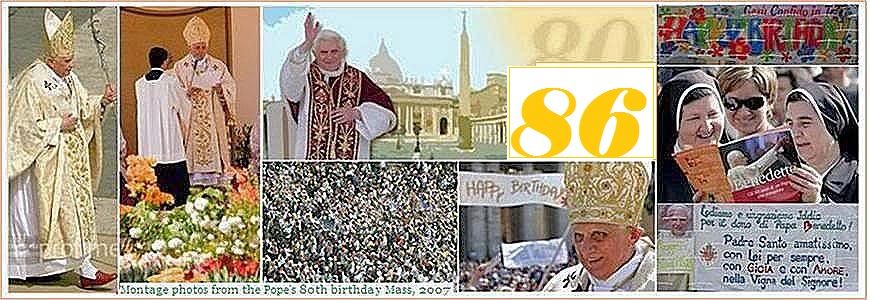
MORE THAN EVER -
ALL OUR LOVE AND PRAYERS
FOR OUR BELOVED BENEDICT XVI,
ROCK OF THE FAITH,
ON HIS 86th BIRTHDAY.
AD MULTOS ET FELICISSIMOS ANNOS!


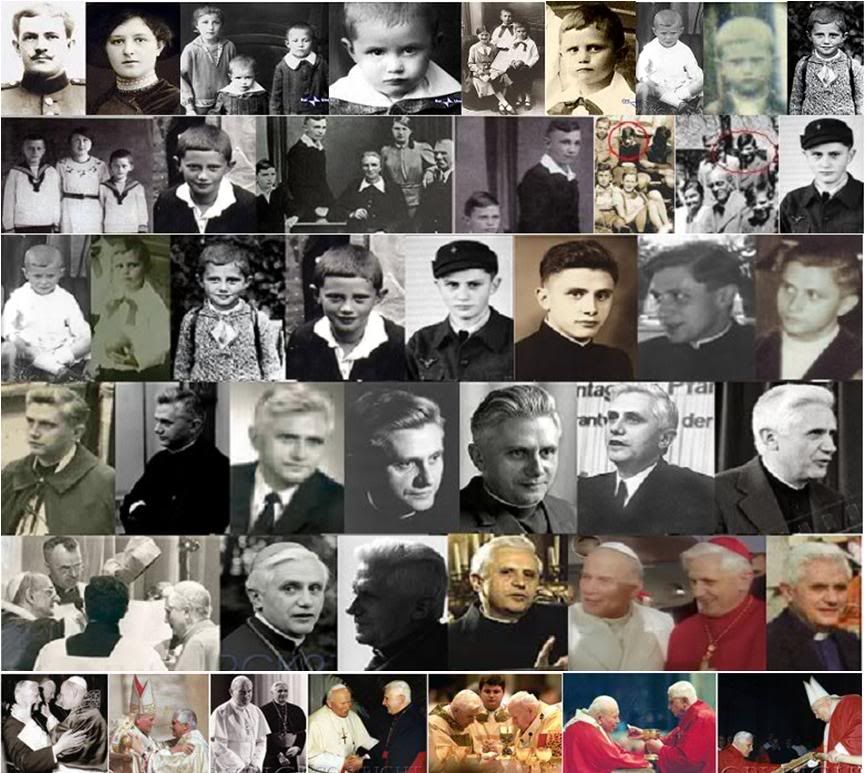




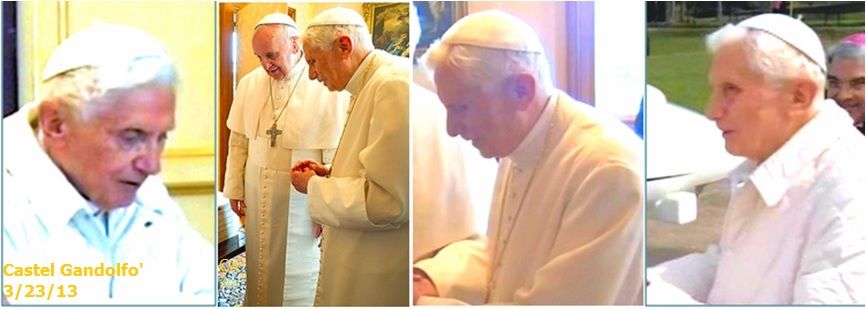



  Tuesday, April 16, Third Week of Easter
Tuesday, April 16, Third Week of Easter
 ST. MARIE BERNARDE (BERNADETTE) SOUBIROUS (France, 1844-1879), Visionary and Virgin
ST. MARIE BERNARDE (BERNADETTE) SOUBIROUS (France, 1844-1879), Visionary and Virgin
One of the most popular of modern saints, Bernadette was a virtuous and sickly peasant girl of 14 who had not even made her first Communion when 'a lady appeared to her on February 11, 1848, in a rocky grotto beside the river Gave in the Pyrenean village of Lourdes. She saw her 17 times more. The Lady identified herself on one of the earlier apparitions, 'I am the Immaculate Conception', a term which meant nothing to the unlettered girl. [Pope Pius IX would not declare the dogma of the Immaculate Conception until 1858). The Marian apparitions at Lourdes attracted worldwide attention. After initial skepticism, the Church gave credence to her story, and she soon was hounded for her fame. She entered a convent in Nevers where she worked humbly despite her chronic sickliness and professed her vows before she died at age 35. Meanwhile, Lourdes had grown into the most visited shrine on earth. Bernadette was canonized in 1935. When her body was exhumed before her beatification, it was found to be incorrupt and is venerated at the convent in Nevers.
Readings for today's Mass: www.usccb.org/bible/readings/041613.cfm
AT THE VATICAN TODAY
No events announced for the Holy Father.
Pope Francis offers prayer
and greets Benedict XVI
on his 86th birthday

April 16, 2013
On the occasion of Benedict XVI’s 86th birthday, the Holy Father, Pope Francis, began the celebration of Mass in the chapel of the Domus Santa Maria by inviting all present to pray for the Pope emeritus.
“Today is the birthday of Benedict XVI. Let us offer Mass for him, that the Lord might be with him, comfort him, and give him much consolation,” he said.
Later in the morning, Pope Francis called Benedict to offer him “best wishes” on his birthday. The Holy Father also greeted Benedict’s brother, Monsignor Georg Ratzinger, who has been staying at Castel Gandolfo to celebrate the occasion, and who, like Pope Francis [Jorge Mario Bergoglio] will celebrate his name day on April 23 – the feast of Saint George.
One year ago...


 THE POPE'S BIRTHDAY HOMILY
Translated from
THE POPE'S BIRTHDAY HOMILY
Translated from

April 17, 2012
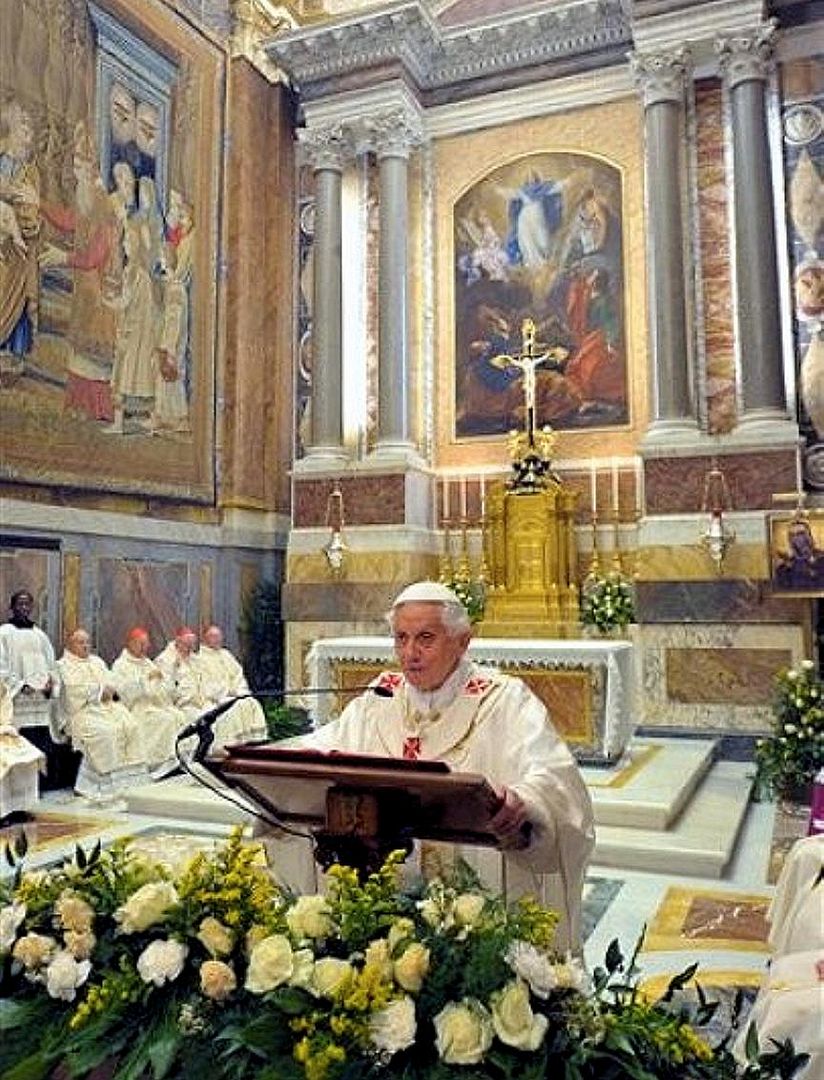
On the occasion of his 85th birthday, the Holy Father Benedict XVI presided yesterday morning at a Holy Mass concelebrated in the Pauline Chapel of the Apostolic Palace with his closest associates and a representative group of German cardinals, bishops and priests, including his brother Georg.
Here is a translation of the homily he delivered extemporaneously in German:
Dear Cardinals,
Dear Brothers in the Episcopate and Priesthood,
Dear Brothers and sisters:
The liturgy of the Church on April 16, my birthday and baptismal day, had three signposts that showed me where the road would lead and which would help me to find it.
First, there is the commemoration of St. Bernadette Soubirous, the visionary of Lourdes; then, there is one of the most unusual saints in the history of the Church, Benedict Joseph Labre; and above all, this day, always immersed in the Paschal mystery, the mystery of the Cross and the Resurrection - especially so in the year I was born, when it was Holy Saturday, the day of God's silence, of his apparent absence, the death of God, but also the day on which the Resurrection announced itself.
Bernadette Soubirous, the simple girl from the South of France, in the Pyrenees - we all know and love her. She was born in almost unimaginable poverty in 19th century Enlightenment France. A prison structure that had been abandoned because it was considered too unhealthy became the family home after much going back and forth, and that was where she spent her childhood.
She did not have much schooling, just some catechism to prepare for her First Communion. But this simple girl, who remained pure and innocent at heart, therefore had a seeing heart that made her able to see the Mother of the Lord. and in her, a reflection of the beauty and the goodness of God.
Mary could show herself to her, and through her, speak to her century, and to the centuries beyond hers. She could see with her pure and unspoiled heart. So Mary pointed her to the spring - so that she could discover this spring with its living, pure and uncontaminated water - water which is life, water which gives purity and health.
Through the centuries, this living springwater is a sign of Mary, a sign of where to find the waters of life, where one can become pure, where we can find what is not polluted.
In our time, when we see so much need in the world, in which the need for water - pure water - has emerged as a problem, this sign is all the more important. From Mary, from the Mother of the Lord, from her pure heart, comes pure uncontaminated life-giving water which purifies and gives us health.
I think we should also consider water an image for the truth that comes to us from faith: genuine uncontaminated truth. Because in order to be able to live, and to be pure, we need to yearn for pure living itself, for unfalsified truth, to be untainted by corruption, for a spotless existence.
Therefore on this day, this little saint has always been for me a sign of where the living water comes from, that which we need to purify us and give us life, and therefore a sign of what we must be - in all things, for all our knowledge and abilities, though they are necessary, we need a simple heart.
We should not lose the simplicity that makes the heart see what is essential, and we must always pray to the Lord so that he may keep in us the humility that allows the heart to be clear-sighted - to see the simple and the essential, the beauty and the goodness of God. Then we can always find the springs of purifying and life-giving water.
Then there is Benedict Joseph Labre, the pious 'beggar pilgrim', who after various vain attempts, finally found his vocation as a beggar - having nothing, no sustenance, never keeping whatever he received and what he did not need - wandering through Europe, to all the European shrines, from Spain to Poland, and from Germany to Sicily - a truly European saint.
We can say that he was a most unusual saint, who by begging, wandered from shrine to shrine, wanting to do nothing else but to pray and therefore give witness to what really counts in this life: God.
He is certainly not an example to emulate, but rather a road sign, a finger that points to the essential. He shows us that God alone is enough, that beyond everything in the world, everything that we need and everything we do, the decisive thing, the essential is to know God. He alone is enough, and this 'God alone' he showed us in a dramatic way.
At the same time, this truly European man who wandered the European continent from shrine to shrine showed that he who is open to God is not alienated from the world and from men. Rather, he found all men brothers because with God, all barriers fall - only God can do away with barriers, and with God, we are all brothers, we all belong to each other. Unity with God also means the brotherhood and reconciliation of men, bringing down barriers in order to unite and heal us.
And so, Benedict Joseph Labre was a saint of peace, because he was a saint who demanded nothing, who died with nothing, and yet was blessed with everything.
And finally, there is the Paschal mystery. On the day I was born, thanks to the foresight of my parents - I was also born again in water and the Spirit, as we have just heard in today's Gospel. First there is the gift of life, that my parents gave to me in a very difficult time and for which I must thank them.
But man's life itself is not always a gift. Can it really be a good gift? Do we know what can come to him in dark times, or even in the brighter times that may co,e? Can we say what troubles, what terrible events he may be exposed to? Can one just simply give life? Is it reasonable to do so or too uncertain? It is a questionable gift, by itself.
Biological life itself is a gift, but one that is surrounded by so many questions. it becomes a real gift when it is given with a promise that is stronger than every calamity that can threaten it, when it is immersed in a power that guarantees that - yes, it is good to be a man, that it is is good for this person whatever the future may bring.
Thus birth must come with rebirth - the certainty that, in fact, it is good to exist, since the promise is stronger than any threat. This is the sense of rebirth in water and the Spirit - to be immersed in the promise that only God can give: 'It is good that you exist, and you must know this for certain, whatever may happen'. I must live from this certainty, reborn of water and the Spirit.
Nicodemus asked the Lord: "Can an old man be born again?" Now, rebirth is given to us in Baptism, but we must continually grow in it, we must always allow God to immerse us in his promise, so that we are truly born again into the great and new family of God, which is stronger than all the weaker and negative powers that threaten us.
So this is a day to give great thanks. As I said, I was born and baptized on Good Saturday. At that time, the Easter Vigil was observed on Saturday morning, which would still be followed by the darkness of Holy Saturday, and so without the Hallelujah.
It seemed to me that this singular paradox, this rare anticipation of Light on a dark day, could be considered almost an image of the history of our time. On the one hand, there was still the silence of God and his absence. But there is already the anticipation of God's Yes in the Resurrection of Christ.
We live in this anticipation, and beyond the silence of God, we hear his voice. Beyond the darkness of his absence, we see the light. The anticipation of the Resurrection during a story that is still ongoing is the power that shows us the way and that helps us go on.
We thank the dear Lord that he has given us this Light, and we implore him that it may always be with us. I have reasons to give thanks on this day to him and to all who have always allowed me to feel the presence of the Lord and who have accompanied me so I may not lose the light.
I face the final stretch of my journey in life, and I do not know what awaits me. But I know that God's light is there, that Christ has risen, that the light of God is stronger than any darkness, that God's goodness is stronger than all the evil in the world. And that allows me to go on with certainty. It allows us to carry on, and at this time, I thank everyone from the heart who have given me the certainty of God's Yes through their faith.
Finally, I say to you, the dean of Cardinals - my sincere thanks for your words of fraternal unity, for your cooperation during all these years. And I say thank you to all the co-workers who in the 30 years that I have been in Rome have helped me to carry the burden of my responsibilities. Thank you. Amen.
 Papal portrait unveiled today
Papal portrait unveiled today

April 15, 2013
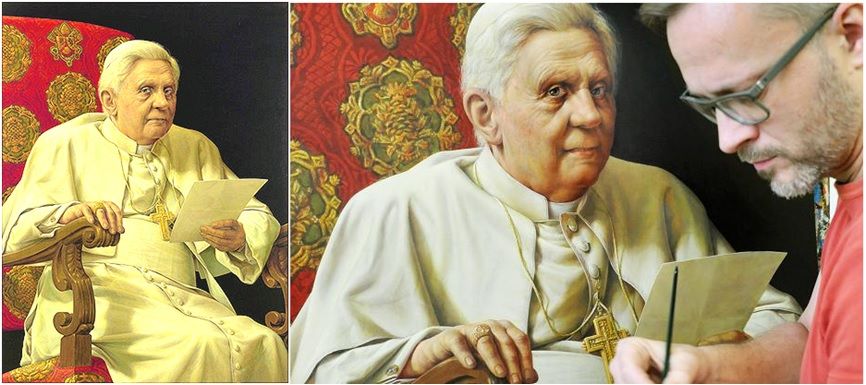 Sorry for the unmatched tones between the two photos, which were taken from different sources.
Sorry for the unmatched tones between the two photos, which were taken from different sources.
Pope-emeritus Benedict XVI is celebrating his 86th birthday on Tuesday. The German Embassy to the Holy See will be hosting a party which will unveil a new portrait of the former pontiff painted by German artist Michael Triegel. The painting is on permanent loan to the Embassy. A previous portrait of Benedict XVI by the same artist can be found at the Institute Benedict XVI in Regensburg.
I find it remarkable that no one at the English service of Vatican Radio even thought to add their own birthday greeting to the Pope Emeritus !
But it is heartening to note that Benedict XVI's birthday today has not been overlooked by many in the Italian media, in this sampling of headlines from Lella's new expanded blog (alongside the mother blog dedicated to Benedict XVI)

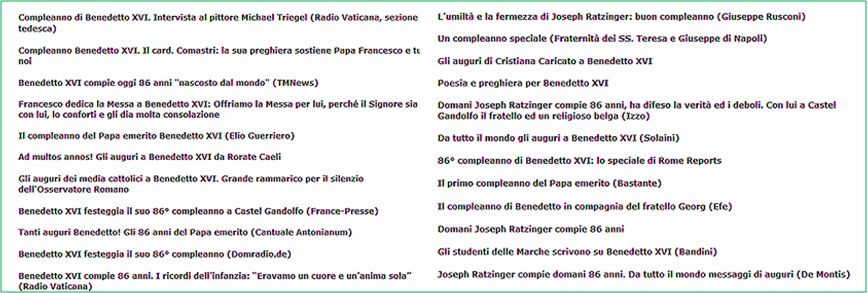
Then, there's this little-noted item from La Repubblica this weekend...
A German-speaking deacon
to assist Benedict XVI
while GG is at work in the Vatican
by Paolo Rodari
Translated from

April 13, 2013
A German deacon to assist Benedict XVI.
In Castel Gandolfo, the Emeritus Pope continues his monastic retirement begun on the evening of February 28.
But now, besides the four Memores Domini who have been taking care of his household, he has a new 'family member' - a German-speaking deacon chosen for him by Mons. Georg Gaenswein, his personal secretary, who can assist him in the daytime while Gaenswein is at the Vatican carrying out his duties as Prefect of the Pontifical Household. [An earlier report also said that Joseph Ratzinger's longtime transcribing secretary since he was at the Congregation for the Doctrine of the Faith, Birgit Wansing, a Schoenstatt lay nun, has also joined the household. In Rome, she had lived at the Schoenstatt mother house.]
The deacon will be with Benedict XVI even when he returns to the Vatican and his retirement home at the former Mater Ecclesiae monastery in the Vatican Gardens by the end of April or the start of May.
[Both of Benedict XVI's personal secretaries are now working for Pope Francis - Mons. Gaenswein in the Pontifical Household, and Mons. Xuereb, as the Pope's personal secretary. Now that he is without a valet, the 86-year-old Benedict XVI requires a male person to assist him with those routine personal needs for which a female assistant is inappropriate.]

[Modificato da TERESA BENEDETTA 16/04/2013 18:08] |
| |
 16/04/2013 13:17 16/04/2013 13:17 |
|
| | | OFFLINE | | Post: 26.569
Post: 9.056 | Registrato il: 28/08/2005
Registrato il: 20/01/2009 | Administratore | Utente Master | |
|



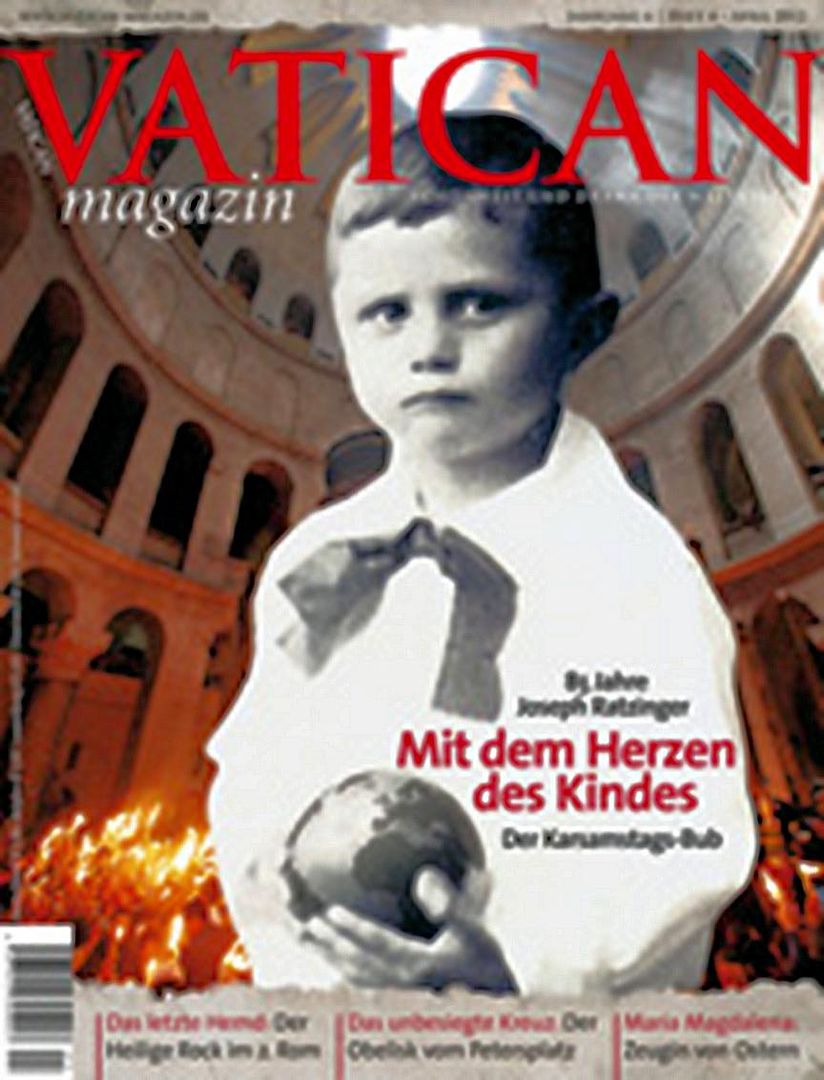 This is perhaps the most heartwarming picture to come out these days. It's the cover of the April 2012 issue of German-language VATICAN-Magazin, and the montage is explained in the editorial below. I particularly like the subtitle of this editorial as it appears on the cover - 'Der Karsamstags-Bub' (The Holy Saturday child).
With the heart of a child
This is perhaps the most heartwarming picture to come out these days. It's the cover of the April 2012 issue of German-language VATICAN-Magazin, and the montage is explained in the editorial below. I particularly like the subtitle of this editorial as it appears on the cover - 'Der Karsamstags-Bub' (The Holy Saturday child).
With the heart of a child
Editorial
by Guido Horst
Translated from
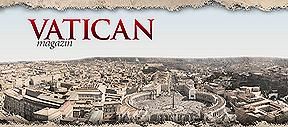
April 2012
How did he say it then? "Convinced that it is Christ who is the true measure of man, and knowing that in him we find the strength needed to face every trial, I wish to proclaim openly that Jesus Christ is the way, the truth and the life. In him everyone will find complete freedom, the light to understand reality most deeply and to transform it by the renewing power of love."
That was in Havana, in the Plaza de la Revolucion, in which far different voices and speeches of a completely different nature have often resounded. But Benedict XVI had the duty to speak this way, even in Cuba.
Fidel Castro himself seemed to have problem with it. Or he would not have gone on to pay a visit on the Pope before the latter left Havana for Rome. [And asking the Pope to recommend books for his spiritual reading!]
Whether in Mexico or Cuba, in Germany or in Africa, in his General Audiences or in his conversations with Roman priests and seminarians - Pope Benedict is not there to moderate a dialog nor to further elaborate on the many issues facing the Church. He is very good at listening, this German Pope.
But there is always that instant, when he professes his witness. "I wish to openly announce to you the Lord Jesus". And we will do that to his last breath.
"I am old, but I can still carry out my duties", he told Fidel Castro in Havana as TV cameras recorded their meeting. Which has caused a general retreat in the Italian media from all the discussion of his impending resignation that had developed as a background for the Vatileaks episode.
"Our days may come to seventy years, or eighty, if our strength endures", says Psalm 90. But with the progress of modern medicine, a man can look forward to living a good stretch beyond that.
But we also note that strenuous trips abroad demand much from Pope Benedict. For instance, even more than 24 hours after he took the 14-hour flight from Rome to Mexico, when he met the children of Guajanato in the late afternoon, it was still 2:30 in the morning by his body clock. That's quite a strain for a man his age.
But then he became radiant and seemed to bloom upon seeing all the many children, young people and the whole crowd, saying what was perhaps the most beautiful words of his just-begun trip: "Today we are full of jubilation, and this is important. God wants us to be happy always. He knows us and he loves us. If we allow the love of Christ to change our heart, then we can change the world. This is the secret of true happiness".
To change the world. That, Benedict XVI thinks, is the mission of the Church. Not through grand projects and humanitarian campaigns. But in that every one should purify his heart, having found in Christ the Way, the Truth and the Life. "I want to publicly announce the Lord Jesus to you".
What could have been in Joseph Ratzinger's heart as he accepted that he had been chosen by the cardinals?
No quiet retirement now with his beloved books at his own desk at home. No relaxing hours with his brother Georg. No peace after the strenuous years in the Roman Curia. All such plans and wishes gone in one fell swoop.
Rather, once more he was being led where he did not really wish or expect to be. Even through the dark valleys to come. Such as the assault of the international media after the 'Williamson case' and one year later, with the resurgence of outrage over sexual abuse by priests. These were dark days for the Pope.
But did he not first see the Light of the world beyond Holy Saturday when he was born? In the darkest times, he must have invoked God to grant him the purity of a child's heart.
And that is why our cover picture shows a collage of the five-year-old Joseph, and behind him, the Easter fire on Holy Saturday in the Church of the Holy Sepulchre in Jerusalem.
In his hand he holds the world, that which he believes is worth changing. It is a little birthday greeting from us to him in the Apostolic Palace. And also a reminder that Easter always follows the darkest of nights.
When he was hailed and cheered by the children in Mexico, Pope Benedict became one of them. 85 years is still 85 years, but that does not keep him from remaining ever young at heart.


 Rome Reports has a beautiful video looking back at B16's birthdays as Pope... Below is the accompanying text. I will insert appropriate videocaps later to illustrate the episodes descrtibed...
Rome Reports has a beautiful video looking back at B16's birthdays as Pope... Below is the accompanying text. I will insert appropriate videocaps later to illustrate the episodes descrtibed...
 www.youtube.com/watch?feature=player_embedded&v=hg6W8czw7to
www.youtube.com/watch?feature=player_embedded&v=hg6W8czw7to
April 15, 2013. (Romereports.com) One more candle on the birthday cake for Benedict XVI, and for the first time as Pope emeritus. He celebrates his 86th birthday in the intimacy of Castel Gandolfo.
Eight years ago, on April 16, 2005, then-Cardinal Joseph Ratzinger turned 78 just two days before the start of of the conclave where he was elected Pope.
During his pontificate, he celebrated seven birthdays with two concerts and Bavarian folk dances, but always working. In fact, in 2006, his first year as Pope, his birthday coincided with the Easter Sunday, where he asked for peace in Africa, Iraq, Israel and Palestine.
In 2007, Benedict XVI celebrated his 80 years at the tune of classical music. The Stuttgart Radio Symphonic Orchestra from Germany performed a concert for him at Paul VI Hall.
“At the end of this stupendous concert, which the Radio Symphonic Orchestra of Stuttgart gave us and elevated our spirits, I wish above all to greet all of you very cordially.”
One year later, in 2008 he packed his bags for the United States. In the morning of his birthday he met with President George W. Bush at the White House, and in the afternoon, with American bishops at the Basilica of the National Shrine of the Immaculate Conception.
In 2009, Benedict XVI was able to celebrate with family. He was joined by his brother Georg, as both enjoyed a concert at the Apostolic Palace at Castel Gandolfo.
But no birthday celebration is complete without cake. In 2010, the Papal Foundation gave Benedict XVI this confection which read “Happy Birthday Holy Father.” Well-wishers also congratulated him during the individual greetings.
“God bless you, thank you and Happy Birthday.” That moment was immortalized in a group photo.
Before traveling to the United Kingdom in September 2011, British Catholic bishops created a Facebook page and email where anyone could send well-wishes to the Pope for his 84th birthday.
His last celebration as Pope was in 2012, and it came with a German touch. Once again joined by his brother Georg, the two enjoyed traditional folk dances from his native Bavaria.
The young dancers congratulated the Pope individually. It was with this Bavarian delegation that Benedict XVI marked his 85th birthday, his last one as Pope.
[Modificato da TERESA BENEDETTA 16/04/2013 18:03] |
| |
 16/04/2013 15:54 16/04/2013 15:54 |
|
| | | OFFLINE | | Post: 26.570
Post: 9.057 | Registrato il: 28/08/2005
Registrato il: 20/01/2009 | Administratore | Utente Master | |
|
Social justice, Francis, Benedict,
and other things tragically misrepresented
by Jake Tawney

April 15, 2013
Overheard upon the election of Pope Francis: “Finally ‘social justice’ won’t be a bad word anymore.” It is astounding how many misconceptions can be packed into nine short words.
First, there is this constant misperception that Francis, because of some stylistic differences, is somehow light years apart from Pope Benedict XVI in substance.
Actually, a comment like the one above somehow suggests that Francis is radically different from most, if not all, of his modern predecessors. Here’s the rub: when people are asked to present evidence that Pope Francis is somehow “different,” they simply fall flat. They fall flat because there is no evidence.
Even if one were to reach back into his days as Cardinal Bergoglio, the evidence of continuity piles up left and right (pun intended). I will resist the urge tO quote extensively from Benedict, John Paul II, and others to demonstrate the continuity, mostly because I am getting weary of the task.
The more I talk with people who adhere to [the perception of= a sudden jolt of discontinuity brought about by the Bergoglio pontificate, the more I think that the onus of proof is on them. Those who see Francis as “different” or a “breath of fresh air” or as someone who will finally “bring the Church into the modern liberal world” owe us some evidence of the fact. They owe us a rational argument and examples of such a claim.
However, the opening quotation is about more than a perceived discontinuity. It is also about a mistaken understanding of “social justice” in the Church, on two accounts.
The first account is that “social justice” is somehow limited to poverty, immigration, the environment, and universal health care.
“Social justice” is much broader than just these issues. If we break down the two terms, “social” refers to man living with his neighbor, and “justice” refers to the classical virtue. Therefore, anything involving the dignity of the human person would fall under this category. “Social justice” would then also include the right to life from conception to natural death, upholding the traditional definition of marriage, and issues of cloning and fetal stem cell research.
Quite frankly, in its broader sense it would also include basic issues of morality such as the Church’s teaching on contraception. On that note, I return to the point in the previous paragraph.
One who claims that Francis is or will be different from his predecessor on any of these issues should be required to demonstrate an argument complete with examples. I have dedicated most of my spare reading time to the writings of John Paul II, when he was pope, and Benedict XVI.
I can tell you that both men tirelessly stood up for the poor, called Catholics to personal action in this regard, defending the dignity of life at all stages, spoke about the challenges and abuses regarding immigration, taught us that basic health care is important for all of mankind, vehemently resisted efforts to change the definition of traditional and sacramental marriage, encouraged us to protect the environment, and spoke out against human cloning and fetal stem cell research.
They also reaffirmed the Church’s teaching on difficult issues of morality such as contraception. They did so because they were Catholic. They did so because they were relentlessly dedicated to the truth.
[The Catholic Church has spelled out and codified its positions on social issues in the SOCIAL DOCTRINE OF THE CHURCH, based in turn of the basic commandment of Christ - love for our neighbor - in the Gospels. Reinforced by papal social encyclicals from Leo XII's Rerum novarum to Benedict XVI's Caritas in veritate. How, except out of sheer perversity and not a little malice, can anyone - LCWR sisters, current Francismaniacs, and the selectively amnesias media - possibly imagine that the Popes before Francis had less concern for 'the poor' or that they were any less conscious of the example of St. Francis and the array of mendicant saints than the new Pope is???? But that appears to be the prevailing perception.]
Pope Francis has shown in his time as Cardinal Bergolgio and his opening month as Holy Roman Pontiff complete continuity with regards to the Church’s teaching in all of these areas.
The second account of how the opening quotation misconstrues “social justice” is how it collapses the difference between principle and implementation to the latter.
When it comes to moral principles, theologians distinguish between what the concept is (principle) and how best to achieve it (implementation). For instance, an individual cannot in good conscience be a practicing Catholic and not adhere to the principle that we are responsible for taking care of the least among us. Christ clearly calls every individual to be concerned with the poor. That is the principle.
The implementation is something altogether different, and people of good will can disagree on the best way to bring about the call to help those in need. Is it through major government programs, is it through private charitable giving, or is it through some mix between the two?
There are, however, some moral teachings in which the principle is the same as the implementation: abortion, for instance. There is no other way to implement the moral principle of the right to life except to protect it at all stages. Any law that does not seek full protection is unjust insofar as it fails in this regard.
Here is where we return to the crux of the issue. “Finally ‘social justice’ won’t be a bad word anymore.” Social justice was never a bad word, or a bad pair of words to be precise, within the Church. Those who get frustrated when the term “social justice” is thrown around carelessly do so not because of the term itself, nor because of their own personal commitment to the Church’s teaching, but rather because of its misuse, because of how it is pigeonholed into a platform for the political left.
We are all called to seek justice in every area of Catholic moral teaching, just as we always have been. There is nothing that has changed in the transition of Pope Benedict to Pope Francis in this call. In order to understand this properly, however, we must be able to distinguish principle from implementation.
The Church calls all of us as individuals to do what we can to help the world’s poor. However, this is something altogether different that looking to government to solve the problem for us, to take the onus off the individual. This has always been the crux of the issue.
I would have severe words for the “Catholic” who says, “The poor are not my problem, and my time and money will not be wasted trying to solve this issue.” Yet I would have equally severe words for the person who thinks that government programs are the solution to the nation’s poverty.
If the Church has learned anything from the centuries-long bad press she received regarding the Galileo debacle, it is that she should tread very lightly in speaking outside of her area of expertise. The Church should and will point out instances of economic injustice, but providing specific economic solutions is something that she leaves to those governing the nations.
Instead, the Church stays at the level of the human heart. She calls every believer to serve the poor, but she does not call believers to support specific government solutions.
Pope Francis is an outstanding example of this. He states the principle, and then he does it. But he most emphatically does not say that we can pass off our personal responsibility to government programs. Rather than calling up the Italian government to dictate how they can best take care of and rehabilitate the imprisoned youth of the country, he – he himself – washed their feet. The call of the Gospel is a call to the human heart. It is not a call for any one government program.
This is where some issues of social justice are different than others. Some allow for disagreement among people of good will when it comes to the implementation. Others do not because the principle is the same as the implementation. We saw this play out in the last Vice Presidential debate between two Catholics.
On the one hand there was the Republican Paul Ryan who, when criticized for his economic plan, stated clearly, the the plan did not violate Catholic principles, but rather it is because of Catholic principles than he supports the plan. Congressman Ryan was interviewed on EWTN and allowed to explain this in more detail.
He said in no uncertain terms that he has a deep compassion for the poor, one that is formed by his Catholic upbringing, and then he outlined precisely why he thinks that fiscal conservatism is the best way to help the poor.
One is free to disagree with the Congressman on the level of economics. For my own part, I readily recognize that I am not an economist, and so I have little to add on whether or not Ryan’s plan will work. I can say that the entitlement programs of the left seem to not have produced near the results that they promised since their inception. What I do know is that Ryan is well within Catholic social teaching in his explanation of his fiscal policies. He might be dead wrong on an economic level, but he is clearly approaching this as a well-formed Catholic. On the other hand we had Vice President Joe Biden who, when questioned about his stance on abortion, stated:
My religion defines who I am, and I’ve been a practicing Catholic my whole life. And has particularly informed my social doctrine. The Catholic social doctrine talks about taking care of those who – who can’t take care of themselves, people who need help. With regard to – with regard to abortion, I accept my church’s position on abortion as a – what we call a de fide doctrine. Life begins at conception in the church’s judgment. I accept it in my personal life. But I refuse to impose it on equally devout Christians and Muslims and Jews, and I just refuse to impose that on others, unlike my friend here, the – the congressman. I – I do not believe that we have a right to tell other people that – women they can’t control their body. It’s a decision between them and their doctor. In my view and the Supreme Court, I’m not going to interfere with that.
The problem is that one cannot hold this position and be a Catholic in good conscience. This is because when it comes to abortion, the principle is the same as the implementation. One cannot hold in principle that every life has a dignity and should be afforded protection from the first moment of conception and then claim the best way to implement this is to not protect it.
“Social justice” is not a bad word, but these two principles must be kept in mind when properly discerning the Church’s teaching in matters of social justice.
First, “social justice” is bigger than the “left” and on the “right.” It includes a whole range of issues. Second, many of the issues are stated as principles, but details of implementation are left up to the prudential judgement of national leaders.
The Church will only speak out of issues of national implementation when a specific system has demonstrated utter incompatibility with Church teaching, as when she condemned socialism.
It seems to me that Pope Francis understands social justice quite well, just as did his predecessor and his predecessor’s predecessor. There will not be a change in Church teaching with the new Pope, no matter how much the left wants to co-opt Pope Francis for their own political agendas.
[Modificato da TERESA BENEDETTA 16/04/2013 20:26] |
| |
 16/04/2013 17:37 16/04/2013 17:37 |
|
| | | OFFLINE | | Post: 26.571
Post: 9.058 | Registrato il: 28/08/2005
Registrato il: 20/01/2009 | Administratore | Utente Master | |
|

 On his 86th birthday, a new book
On his 86th birthday, a new book
celebrates Benedict XVI's legacy -
author praises his deep humility
By Carl Bunderson

Los Angeles, Calif., Apr 16, 2013 (CNA/EWTN News).- As Benedict XVI celebrates his 86th birthday on April 16, the author of a new book on the legacy of the retired Pontiff says his humility largely inspired the work.
“I was...fond of Benedict because he was truly humble man,” Charles Coulombe, author of “The Legacy of Pope Benedict XVI,” told CNA April 15.
“He was kind of shy and retiring, but he was willing to re-invigorate the trappings of the papacy, not for his own benefit, but for that of the office. And that's true humility.”
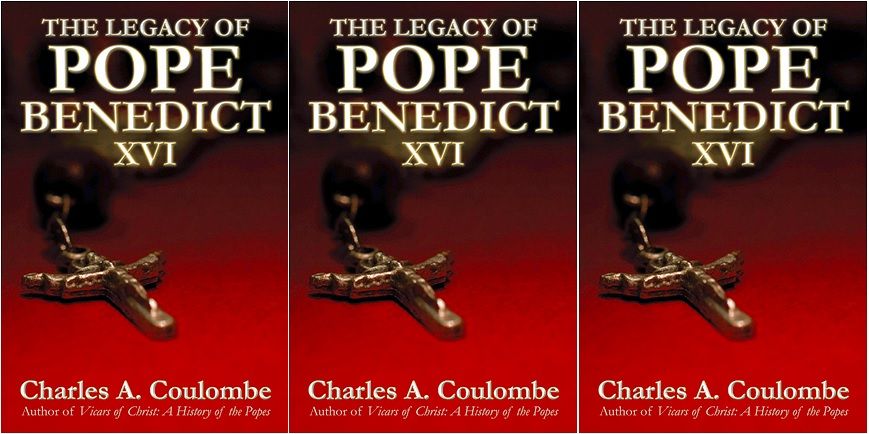
The book, released in March, discusses the Church and the office of the papacy, gives a biographical sketch of Benedict's life, and addresses the reforms which the Pope undertook during his pontificate.
“It's a good, quick introduction to both the Church and the papacy for those who don't know anything about it, and it will be useful for those trying to figure out the areas in which (Pope Francis's) papacy will be facing challenges,” he said.
The Los Angeles-based author and historian said he was inspired to write it because he considered Benedict to have been “the best Pope I've lived under.”
Coulombe is most fond of Benedict because his work seemed particularly to “reflect what people in parishes and dioceses were living through in their Catholic lives.”
While acknowledging that the other Popes, since Paul VI, have had their own strengths and accomplishments, Coulombe says that Benedict's care for such issues as the appointment of bishops were what “really concretely affects the life of the individual Catholic at the end of the day.”
“Benedict seems to understand that if you're a believing Catholic, it's been pretty tough.”
Coulombe described living through a period dominated by the “hermeneutic of rupture” – a view that sees a fundamental break between the Church as it existed before and after the Second Vatican Council in the 1960s, and of which Benedict spoke of in his first Christmas address to the Roman Curia
He said that the Bishop Emeritus of Rome was the “first authoritative individual” to address that problem “in which the average Catholic lives.”
Benedict's 2005 Christmas address to the Roman Curia, in which he defined the “hermeneutic of continuity,” is the key to understanding his pontificate, Coulombe said.
Among the four key areas of concern for him was the breach between the Church of the present and that of the past, which Benedict sought to heal with this interpretive lens.
The other three areas which Benedict's reform focused on, said Coulombe, are a “cleaning house” – or as his wrote in his book, “cleansing of the aberrations that have grown up within her – as well as reunion with other Christian bodies” and “addressing the great powers of this earth on behalf of the faith.”
These are areas in which Benedict began or continued reformation, and much remains for Pope Francis to continue with. “None of the areas Benedict worked in were 'solved,'” Coulombe said.
As Pope Francis's pontificate continues, he concluded, “this Pope, and his successor, and his successor, will have to deal with them.”
Coulombe's new work, released last month, is available in several e-book formats from Diversion Books.
[Modificato da TERESA BENEDETTA 16/04/2013 18:20] |
| |
 16/04/2013 20:07 16/04/2013 20:07 |
|
| | | OFFLINE | | Post: 26.572
Post: 9.059 | Registrato il: 28/08/2005
Registrato il: 20/01/2009 | Administratore | Utente Master | |
|

 The 'Francis effect' sprung out
The 'Francis effect' sprung out
of Benedict XVI's renunciation
by Cristiana Caricato
Translated from

April 16, 2013
When one is reposing with God, nothing else matters. But I am sure that today Benedict XVI is happy. Perhaps much more than we could imagine.
But not because his voluntary retirement shields him from that massive public attention which is such a contrast to his natural modesty but because he can celebrate 86 years of existence in humility and hiddenness, in keeping with his temperament, free to carry in his heart everything that he brings before Jesus in his daily prayers.
His conscience, which he stripped bare with an unprecedented decision, will not bear much examination. Nor a settling of accounts. Saints do not do that. They do not need to, because they know that in a sense, they have won their earthly battles.
But from the human perspective, one must say that if there is a player who has scored best in recent history, it would be Joseph Ratzinger. The latest confirmation to such a thesis - my personal own, clearly - comes in the results of a survey presented yesterday by CESNUR, the Turin-based study center on new religions.
It was carried out by a socialist and observer of contemporary religions, its director Massimo Introvigne, who is above suspicion, and who, with scientific interest and doctrinal security, wished to verify all that has been said with great satisfaction in the past month in Catholic sites and newspapers. Namely, about a great springtime for the faith, with the return of many Catholics to the pews and to the confessionals...
They call it 'the Francis effect', with the following premise: "The new Pope is very likable, the people adore him, and they understand his message of a merciful God, so the lost sheep are coming back to the flock".
This had to be verified, and CESNUR did so through a questionnaire it disseminated through the social networks. The results from limited sampling confirm that more than half of Italy appears to have undergone an increase in Church=going and confessions lately.
53% in a sample of 200 priests and religious claimed to have experienced an increase in religious practice among their parishioners over the past month. 43.8% of this increase was described as 'consistent' for at least 26% of the returnees. Not bad at all.
To the skeptics who may be suspicious of the honesty of the respondents (at the very least, the sample is biased by the interest of the respondents), Introvigne presents the results of a survey among 500 laymen, among whom 41.8& said they were aware of the 'Bergoglio phenomenon', though they seemed to be less enthusiastic about it.
Thus the reliability and concreteness of the general perception of a "Francis effect' appear to be confirmed with figures, even if to a limited extent, and surely, there will be those who will exploit it for their own purposes. Such as pastors whose own jurisdictions have been mismanaged, impoverished priests in parishes where they are forced to multi-task, the Francis fanatics who have sprung up spontaneously [Hey! I wouldn't put them down, speaking as a spontaneous instantaneous Benaddict!], the a-critical and ardent exalters of anything new for the sake of putting down the old. And Massimo Introvigne is certainly none of the above.
He has always been precise and prompt in his analyses, and is wise enough to underscore that the phenomenon is a double one, that it must be considered a 'Benedict/Francis phenomenon'.
His survey, through its carefully designed questionnaire, also shows that the wave of renewed sympathy (or interest) in many things Catholic that had been previously rejected began with Benedict XVI's renunciation of the Papacy.
What had initially provoked questions, opened many eyes, interpellated consciences, and aroused expectations among fallen-away Catholics, was the emotional reaction to Benedict XVI's abysmally humble and profoundly Christian gesture of renunciation. This all came first chronologically. {Also logically. Because a new Pope could not have been elected if Benedict XVI had not resigned! It was his renunciation that made it possible for Francis to become Pope at this time.]
So now we get back to the happiness that Joseph Ratzinger must feel on his 86th birthday. Does anyone think that a man who flung down from the bastions of history the power [and the prerogatives] that had been handed to him by the Holy Spirit, for the sake of what he perceived to be the good of the Church, would want anything else but the good of the Church?
And that is why I can be sure he is serenely content. Many people thought he had made a huge gamble. But for others, he simply placed all his trust in God by carrying out a risk that only an unshakable faith could have sustained.
And it seems things could not have turned out better, with his decision to 'climb the mountain' so that with his prayers, he could help propel Peter's boat forward.
Now we have Pope Francis, with a reactive Church that seems more alive than ever, following a quiet program of reform that the German Pope nurtured and prepared for years, with palpable and visible hope based on faith in the Risen Christ.
It is a moment of grace for the man who blew out 86 candles today. His gift? The CESNUR survey.
And so, best wishes on your birthday, Padre Santo!
And the first badge of honor and loyalty in the 'decency test' for cardinals goes to...
Cardinal Comastri:
Benedict XVI's prayers sustain
Pope Francis and all of us
Translated from the Italian service of

April 16, 2013
Benedict XVI may be hidden from the world, but the world, and especially the Church, has not forgotten him. So it is not surprising that so many - VIPs as well as the simple folk - have been sending him best wishes for his 86th birthday today.
Best wishes that go with gratitude, says Cardinal Angelo Comastri, Arch-Priest of St. Peter's Basilica, and the Pope's vicar for the Vatican, in an interview with Alessandro Gisotti:
CARDINAL COMASTRI: Pope Benedict closed out his Pontificate with a great act of humility which opened the way for the Pontificate of Pope Francis and his evangelical simplicity. On his 86th birthday, my heart feels compelled to express my gratitude to Pope Benedict for the service he has given the Church and which he continues to give. As he said, "I am not abandoning my service to the Church but continue to serve her in prayer, in silence and out of sight."
For us believers, prayer is a great help. I am convinced that Pope Benedict's prayers help sustain the work of Pope Francis, that his prayers are particularly effective for the Pontificate of his successor and for the whole Church.
This dimension of prayer is something extraordinary, because Pope Benedict has called himself a pilgrim on the mountain, praying for the People of God, even as the People of God pray for him...
It is they mystery of the Church - the Church as communion, When God is in our midst, he creates communion, because God is love. Just as Pope Benedict cannot forget us, we cannot forget him - our faith in Jesus unites us all, in a spiritual kinship defined by the blood of love. So even if Pope Benedict is out of sight, he remains part of us.
At his last public statement in Castel Gandolfo on February 28, he said that now he was undertaking the last stage of his life as a pilgrim, but it is a pilgrimage that he makes alongside all of us. We are all pilgrims towards the same destination, with the same faith, the same lamp that illuminates our way.
So many are expressing their best wishes to Pope Benedict today, from simple tweets to prayers and Masses, as a sign of love that has not faded because he retired, and may have even grown because of it...
It is a love that has been transfigured. I feel special gratitude to Pope Benedict for the lucidity of his Magisterium: We live in an age of fog, an age of great confusion, in a spiritual void - and Pope Benedict gave us the extraordinary teaching to cope with all this.
He reminded us in thousands of ways - using a language that I would say was always theologically perfect but also immediately understandable to everyone - that Jesus is the hand of God who takes us out of our prison of selfishness, and therefore, rescues is from our disquiet, uneasiness and sadness.
How many times did he say, in direct continuity with John Paul II, "Do not be afraid of Jesus - he does not take away anything, he gives everything".
In find it admirable that Cardinal Comastri did not feel compelled to 'balance out', as others might have, his words for Benedict XVI with words in praise of Pope Francis, since the interview was, after all, specifically about Benedict XVI and his birthday today.
[Modificato da TERESA BENEDETTA 16/04/2013 21:24] |
| |
 17/04/2013 13:07 17/04/2013 13:07 |
|
| | | OFFLINE | | Post: 26.573
Post: 9.060 | Registrato il: 28/08/2005
Registrato il: 20/01/2009 | Administratore | Utente Master | |
|

 Happy 86th Birthday, Benedict XVI!
Happy 86th Birthday, Benedict XVI!
And this Friday marks the 8th anniversary
of the Pope emeritus's election in 2005
By Carl E. Olson

April 16, 2013
Today is the 86th birthday of Benedict XVI, Pope emeritus, and this Friday, April 19th, marks the eight anniversary of his election to the Chair of Peter. We extend our best wishes and prayers to the Pope emeritus on this happy occasion.
In Milestones: Memoirs 1927-1977 (Ignatius) he wrote the following of his birth:
I was born on Holy Saturday, April 16, 1927, in Marktl am Inn. The fact that my day of birth was the last day of Holy Week and the eve of Easter has always been noted in our family history. This was connected with the fact that I was baptized immediately on the morning of the day I was born with the water that had just been blessed. (At that time the solemn Easter Vigil was celebrated on the morning of Holy Saturday.)
To be the first person baptized with the new water was seen as a significant act of Providence. I have always been filled with thanksgiving for having had my life immersed in this way in the Easter mystery, since this could only be a sign of blessing. To be sure, it was not Easter Sunday but Holy Saturday, but, the more I reflect on it, the more this seems to be fitting for the nature of our human life: we are still awaiting Easter; we are not yet standing in the full light but walking toward it full of trust.
Today's CWR feature, "Pope Benedict's 'First Convert'", is a testimony by Roger Dubin of his conversion to faith in Jesus Christ and the Church that was sparked in somewhat dramatic fashion by viewing, on television, the announcement of Benedict XVI on April 19, 2005. Dubin writes of that transforming moment:
Because as Pope Benedict walked onto the balcony and raised his arms, and the camera appeared to zoom in, an unstoppable power and presence came through his eyes and sliced me open. I burst into tears, and everything I ever thought I was, or wasn’t, poured out.
It was the Sword of Christ, and there would be no peace in me until I offered him mine.
CWR will be marking the anniversary of Benedict XVI's election with a couple of other essays, including a new piece by Tracey Rowland that focuses on Joseph Ratzinger/Benedict XVI and the Second Vatican Council.
The following tribute from Avvenire, newspaper of the Italian bishops' conference, was written by a theologian who was the co-editor with Ingrid Stampa of the Italian edition of the JESUS OF NAZARETH volumes.
Benedict XVI's birthday:
The faith and love of
a witness to Christ
Editorial
by Elio Guerriero
Translated from

April 16, 2013
Benedict XVI was born in the first hours of April 16, 1927m which was Holy Saturday. That is why he has said, "I have always been filled with thanksgiving for having had my life immersed in this way in the Easter mystery, since this could only be a sign of blessing..." close to the two privileged witnesses of the Resurrection, John and Mary.
In the Paschal event, we find the disciple Jesus loved under the Cross with the Mother of God. The Lord entrusted Mary to him, who from that moment on, became the model and mother of e very disciple.
Under the Cross, John also became the witness of a singular event of Jesus's passion - his death and the lance thrust that pierced his side, from which blood and water flowed - representing the two fundamental sacraments of the Church = the Eucharist and Baptism.
After the Resurrection, John became the companion of Peter, beside him almost as though to strengthen him with his presence and his love. And he was around when the Lord addressed Peter with his thrice-repeated question, "Do you love me?", which was necessary to cancel out Peter's earlier triple denial of him, but also so that he could face his ministry that Jesus predicted would be a way that would lead to the Cross.
And thus Peter also came to be close to Mary. the humble virgin from Nazareth, daughter of Zion, the woman through whom God's promise to Abraham and Moses was fulfilled. The Ark of the New Covenant open to all the generations who would proclaim her blessed, but also the mother to whom Simeon predicted that a sword would pierce her heart.
It was always in the spirit of Easter that Pope Benedict XVI carried out his Petrine ministry. First of all, he sought to clean up the vineyard of the Lord.
Many still remember the image of John Paul II gripping his pastoral staff with the Crucifix, as he begged forgiveness for all the wrongs that had been committed in the past by men of the Church.
With no less energy, Benedict XVI sought to extirpate from the Church the horrible and humiliating scourge of priestly pedophilia, and to impose transparency on the central and diocesan administration of the Church.
And he developed the dialog with the Jews. Not just with a plea for forgiveness for the dissemination of anti-Semitism by some Christians in the past, but with his acknowledgement of what Christianity owes to the People of God, who had received the promise made by God to Abraham and renewed to Moses, to be fulfilled by Jesus.
To the children of Israel, we owe the Law, perennial light through man's journey. We owe the Psalms, words with which even today the Church continues to celebrate her liturgy.
Then Pope Benedict taught us - especially in the three volumes on JESUS OF NAZARETH, written while he was Pope - to look at the Lord with the eyes of faith made wise by love.
He has since renounced the Petrine ministry, and in a way has come closer to the Apostle John by immersing himself in the life of God, accompanying with prayer the ministry of his successor Francis.
He has entrusted himself to Mary, Star of hope, who shows everyone the way that leads to the eternal meeting with the Father.
On the occasion of the birthday of the Emeritus Pope, we at Avvenire say that we wish to stay close to him with the gratitude of children, who have accepted his invitation to look and to know with the eyes of faith made more penetrating by love Jesus, Son of God, who sits at the right hand of the Father.
Conspicuously missing however is any message at all from the Italian bishops' conference. I might have hoped that at least CEI president Cardinal Angelo Bagnasco would have offered a personal greeting to Benedict XVI. There is no protocol - because the situation is unprecedented - that says cardinals may no longer publicly express some acknowledgment of the Emeritus Pope. One counts on the individual cardinal's elementary decency to do that.
Apropos, Cardinal Christoph Schoenborn finally spoke about Benedict on his birthday, in an interview with the French service of Vatican Radio, so this helps to counteract the apparent perfidy (really, an unforgivable amnesia about Benedict XVI) in his post-Conclave raves about Pope Francis. But I must say that both he and Cardinal Comastri, who spoke to the Italian service of Vatican Radio, might never have volunteered what they said about Benedict if they had not been specifically interviewed about him, not about Pope Francis. One somehow thinks they would be capable of the same 'perfidy' to Francis in the event, God forbid, they elected his successor. And yet, none of the cardinals felt compelled to distance themselves from John Paul II after his death they way they all seemed to slam the door shut on Benedict XVI after he resigned.
My greatest disappointment among the cardinals is Cardinal Ruini, whom I certainly did not expect to come out with the hagiographic words about Pope Francis attributed to him, which were as objectionable as the rest of the cardinals who had spoken out about the new Pope, not because they praised him, which they should, but in making it appear that Francis was the very thing the Church needed to get out of its pitiful condition, implying of course, that the previous Pope had done nothing about it.
I will always be bitter about this attitude because it is so un-Christian, and unthinkable for so-called Princes of the Church. But not unthinkable, obviously, because it appears to be a unanimous attitude, best expressed in that boilerplate telegram sent to Benedict XVI at the start of the pre-Conclave congregations. An attitude that is all the more perplexing after the Conclave, when Pope Francis himself has taken the lead in his thoughtful consideration if not near-deference to his predecessor. A lead no cardinal has so far followed spontaneously. What does it cost a cardinal to at least say publicly, "Happy Birthday, Your Holiness"?
Just by way of a reminder, here is what Cardinal Bagnasco and the Italian bishops wrote Benedict XVI last year on his 85th birthda. Can all their noble sentiments have vanished into thin air just because the man is no longer Pope? What a shame!

 Italian bishops' conference (CEI):
Italian bishops' conference (CEI):
Telegram of greeting and support
MOST HOLY FATHER,
In the Paschal light of the Resurrected Lord, the Church in Italy embrace you on the occasion of the happy observance of your 85th birthday and the seventh anniversary of your Pontifical election.
Our best wishes come with our prayers, with which we ask the Lord, who called you to life and who chose you to the episcopal order, to conserve you for the entire Church as the leader and pastor of the people of God.
Sustained by your enlightened Magisterium and your irreproachable witness, we wish to face with renewed conviction our pilgrimage in the footsteps of Christ, welcoming with special disposition and unanimous commitment the year of Faith.
Your decision to honor in this way the 50th anniversary of the opening the Second Vatican Council and the 20th anniversary of the Catechism of the Catholic Church finds us vigilant to intensify our reflection on the faith, on adherence to the Gospel, and on the social responsibility of announcing it with courage and directness.
Holiness, may everyone know the esteem and gratitude with which we are one with you, as we involve your paternal blessing on our ecclesial communities and on the entire Italian people.
For the Italian bishops' conference:
CARDINAL ANGELO BAGNASCO
President
MONS. MARIANO CROCIATA
Secretary
Cardinal Bagnasco wrote a separate tribute for Avvenire, teh newspaper of the Italian bishops' conference.
The Pope's 85 years:
A family celebration
by Cardinal Angelo Bagnasco
President, Italian bishops' conference
Translated from

The splendid colonnade in St. Peter's Square expresses the grand embrace that the Catholic Church has for Benedict XVI on his 85th birthday.
That ideal and strong embrace also includes the world that recognizes in him a light for all of mankind: a gentle and clear light which shows us, with the words of Jesus and of universal reason, the true and the good.
It is therefore a family celebration, with gratitude to the Lord who chose him as his Vicar on earth; to Cardinal Joseph Ratzinger, who accepted the will of Christ, knowing that one is close to Jesus only in the obedience of love; to the Holy Father, Benedict XVI, who, with prayer and thought, by word and by governance, leads the People of God.
From the beginning of his supreme ministry, Benedict XVI began his humble and joyous 'reform' of the Church, knowing full well that the urgent problem for the Church today is that of faith.
The joy of faith is the golden thread that inspires and unifies each of his discourses. And this is the most imporatnt response that the world needs in general: not organizational changes, as much as a reform of hearts, because it is hearts that animate and make fruitful all programs and structures.
Holiness - center of Pope Benedict's joyful reform - is not an abstraction nor a retreat from modernity, but on the contrary, it aims at the core of contemporary man's problems.
It means to live the faith with that joyous awareness that changes the life of individuals and generates a new humanity, new relationships, vital organisms. If faith irradiates the way we think and act, then the Lord is rendered present, and societies, cultures and States will benefit. Then, wherever there is a lump of humanity, hope will sprout.
It is along this road of renewal that the Pope is leading the Church, knowing that the world expects somehow to see the Invisible through the joy of redeemed souls. He does this very gently, almost on tiptoes, even knowing that he must serve, as he does, with the tenacity of the helmsman beset by winds that are often contrary.
By virtue of his original 'Yes' to Christ, he does not promote himself nor seek 'success'. A shy man, he hesitates from demonstrating anything personal to the Church or to the world. His only desire is to proclaim Jesus, light of the world. Herein lies his disarming freedom, and therefore, his personal peace.
His Magisterium reminds us of the beauty of faith, a beauty to be rediscovered as fresh and functional, embracing the lively and generous world of young people as well as the witness of Christians marked with misery and persecution, sometimes to a bloody end.
He reminds us that freedom rests on truth. He does not fear to tackle the most sensitive issues, not entering them with violence, and always recognizing the least bit of light. But without failing to make the truth shine forth - the truth about Christ and about man who finds in Christ his own true face.
I think that it is here where Benedict XVI's gift of 'prophecy' lies - in consistently showing the way of truth and of life. In his apostolic travels, he often reminds the faithful that mankind is in danger of losing the 'human' way, by going against himself. The Gospel is God's revelation, the offering of his life, freedom from illusions, true happiness.
His coat of arms reveals something of this man, whom Christ chose unexpectedly as his obedient instrument, and who, with the pilgrim's scallop, shows the way of the universal Church towards God's high pastures.
Thank you, Holy Father. The Church in Italy, along with all her bishops, surrounds you in her embrace, wishing to be the first and the nearest to say to you: Ad multos annos, Santita!
 OK, maybe some cardinals and bishops sent their personal greetings to Benedict XVI, but the Italian bishops have their own multimedia empire, and it seems rather parsimonious to let an editorial from Avvenire say everything for everyone!
OK, maybe some cardinals and bishops sent their personal greetings to Benedict XVI, but the Italian bishops have their own multimedia empire, and it seems rather parsimonious to let an editorial from Avvenire say everything for everyone!
[Modificato da TERESA BENEDETTA 17/04/2013 18:52] |
| |
 17/04/2013 17:56 17/04/2013 17:56 |
|
| | | OFFLINE | | Post: 26.575
Post: 9.062 | Registrato il: 28/08/2005
Registrato il: 20/01/2009 | Administratore | Utente Master | |
|
 The Council of 8:
The Council of 8:
What's the big deal?
This is greater 'collegiality' but
not democratization of the Church
Translated from

April 16. 2013
So history repeats itself. Enthusiasms which can be well- or ill-intentioned and out-of-place annoyance at the announcement that Pope Francis has constituted a group of eight cardinals, representing the five continents, to advise him on the governance of the Church and to study an eventual reform of the Roman Curia.
It is a decision that stems from a suggestion made during the General Congregations that preceded the last Conclave. Yet this is not a new organism to be super-imposed on the Curia, whose well-defined functions remain completely in force, but a space for consultation that will allow the Pope to hear the voice of bishops from the world's most important dioceses.
[Pardon me, but I still think this is a move that is more cosmetic than anything else. Nothing prevents any Pope from consulting - as often as he wants - any bishop in the world on any subject when he wants to, without naming a super-group, that IMHO, will only exacerbate existing rivalries and tensions among the bishops of the world, especially when it comes to perceived 'leadership' of a region. If cardinals can be so callous as to treat the former Pontiff like a piece of discarded junk, imagine what they could do to each other.]
With this 'group' (the choice of this modest designation also indicates its contingency nature, leaves open its work method, and dilutes the dramatism of its formation), Pope Francis apparently intends to amplify the habitual radius of papal listening to the sensibilities and concerns of the various ecclesial communities in the world. It is a sign of 'collegiality' (as intended by Vatican II), but it goes beyond communion because the Pope always acts in medio Ecclesiae (in the midst of the Church). [??? What is the condition that goes beyond communion????]
Actually, Popes have always made use of various elements and ambiences for consultation and advice. The College of Cardinals itself is the most privileged, although its size in modern times has made it less functional for habitual contact. The Pope has freely chosen the members of the Group of 8, which clearly reflects his desire for universality and a clear preference for bishops active in the world's most strategic dioceses like Boston, Munich, Kinshasa, Bombay and Sydney.
[Do Pope Francis's appointments, in fact, reflect what he thinks of the strategic importance of the dioceses represented by his nominees? Is Boston more strategic than New York or Los Angeles; is Munich more strategic than Milan; is Kinshasa more strategic than Lagos; is Bombay more strategic than HongKong or Manila; and in Latin America, why was the bishop of the world's largest diocese in the world's largest Catholic country (Cardinal Odilo Scherer of Sao Paolo, Brazil (whom even Pope Francis's sister has said she had hoped would be elected Pope) not named to the Council? In Oceania, of course, Sydney appears to be the only choice. It appears the choices were more personality-based than location-based. Not to mention the snub to leading papabili in the 2013 Conclave like Cardinal Scola of Milan, Cardinal Erdo of Hungary, and Scherer himself? O'Malley was a late-blooming papabile, but one senses he was chosen over, say, Cardinal Dolan, for North America, because is happens to be a member of a religious order, and a Franciscan Capuchin at that.]
Named to be coordinator of the 8 is the Archbishop of Tegucigalpa, Honduras, Cardinal Oscar Rodriguez Maradiaga, well-known to Papa Bergoglio during all their years of workign together in CELAM (the coference of Latin American and Caribbena bishops). The only member of the Roman Curia named to the Group of 8 is Cardinal Giuseppe Bertello, president of Vatican city state. [He is the man chosen by Benedict XVI to succeed retiring Cardinal Giovanni Lajolo as President of the Vatican Governatorate, a position that Mons. Carlo Maria Vigano claimed had been promised to him by Cardinal Bertone [And if that is true, then Cardinal Bertone had no right to promise any such appointment any way, which is the sole prerogative of the Pope. But this digression is to call attention to the fact that some of the Anglophone commentators who unquestioningly bought Vigano's tall tale of being the only upright person in Benedict XVI's Curia had suggested that Pope Francis could best underscore his resolve to 'clean up the Curia' by naming Vigano his Secretary of State. Well, it appears the new Pope thinks very highly of the man appointed by Benedict XVI to the Governatorate over Vigano, to the point that the Italian media have speculated he may even name Bertello to be his Secretary of State! So it comes full circle!] Some have seen in Bertello's appointment a sign towards his becoming Secretary of state, which may take place before the summer.
The most concrete function that the Pope has given the Group of 8 is to study the overall lines for a reform of the Curia. He could have decided all that himself, but he has decided to call for a study that would establish needs and priorities.
In fact, the present structure of the Curia corresponds to a design that is more than half a century old, and experience with perceived obstacles as well as historical changes now demand a new design. Nothing dramatic or rupture-inducing, but to underscore that the Curia is an auxiliary organ that serves the Pope in the exercise of his ministry. Obviously, any changes will be decided by the Pope alone.
This move should not be seen as putting the Church on the path of some 'democratization' which would dismantle what she was meant to be, nor as the Pope giving up any authority conferred on him by being the Successor of Peter.
But we can say that Pope Francis is seeking, as did his predecessors, the most adequate way to exercise his ministry of confirming all baptized Christians in the faith, safeguarding the unity of the Church, and promoting the New Evangelization.
The creation of the Group of 8 is nonetheless significant, and one understands the expectation it has aroused as well as the hunger for more news about it [they won't be meeting until October!], but any feeling of vertigo (whether exultant or in fright) corresponds to fantasy, not reality.
The reality remains that of a Church that lives its faith, for the faith, and to communicate the faith. The structure is always in need of maintenance and repair in order to serve its purpose. No more, no less.
Maybe I'm being too paranoid, but it disturbs me that Mr. Restan failed to include in his column, not even a brief but separate message from the above commentary to greet Benedict XVI on his birthday.
P.S. Apart from Carl Olson in Catholic World Report and Father Z on his blog, I have not seen any other Anglophone acknowledgment of Benedict XVI's birthday. Not even from CNS, CNA, and Zenit. Or the usually conscientious Catholic Herald of the UK. At least, the Italian media were not that negligent (or uncaring)!
[Modificato da TERESA BENEDETTA 19/04/2013 03:46] |
| |
 18/04/2013 01:59 18/04/2013 01:59 |
|
| | | OFFLINE | | Post: 26.576
Post: 9.063 | Registrato il: 28/08/2005
Registrato il: 20/01/2009 | Administratore | Utente Master | |
|

 Wednesday, April 17, Third Week of Easter
Wednesday, April 17, Third Week of Easter
 ST. BENEDICT JOSEPH (Benoit Joseph) LABRE (b France 1748, d Rome 1783), 'The Beggar Saint', Patron of Pilgrims and of the Homeless
ST. BENEDICT JOSEPH (Benoit Joseph) LABRE (b France 1748, d Rome 1783), 'The Beggar Saint', Patron of Pilgrims and of the Homeless
One of the least remarked coincidences is that for years before April 16 became the feast day for Bernadette Soubirous, it was the feast day of Benedict Joseph Labre, who died
in Rome 144 years before Joseph Ratzinger was born on the same day, and who would take the name Benedict XVI when he became Pope. But their life stories could not have been
more different. The saint who prefigured the Pope's names is one of the most extraordinary saints in modern times. The eldest of 18 children in a prosperous family near Boulogne,
he was educated by his uncle, a parish priest. But his education was not deemed suitable for him to be accepted by the Trappists, Carthusians and Cistercians. At age 16, he decided
he would leave everything behind and live his life as a pilgrim, walking on foot from shrine to shrine, living on alms and sharing what little he had with other beggars - the classic
'Fool for Christ' well-known in the Orthodox traditions. He eventually based himself in Rome, where he lived in the Colosseum, and came to be known as the 'beggar of Rome' as well
as 'the saint of the 48 hours' because of his devotion to adoration of the Blessed Sacrament. He was also increasingly sick due to malnutrition. One day, he dragged himself to attend
Mass at Santa Maria dei Monti near the Colosseum. He collapsed in the church and was taken to a nearby home where he died. He was only 35. At the news of his death, children
In the neighborhood went around shouting 'The saint is dead!' His wake at Santa Maria dei Monti lasted through the rest of Holy Week, attracting throngs of Romans. His cult was
immediate, and within a year, he was being written about as far as London, and his confessor had written a biography of him, in which he recounts at least 136 miraculous cures
in the first three months after he died. He was beatified in 1869 and canonized in 1881. His remains are venerated in Santa Maria dei Monti.
Readings for today's Mass:http://usccb.org/bible/readings/041712.cfm
AT THE VATICAN TODAY
General Audience - Pope Francis offered a catechesis on the words from the Credo, "He ascended into heaven
and sits at the right hand of the Father". Afterwards, he expressed his condolences for the victims of severe
earthquakes in Pakistan and Iran,
After the GA, he met with
- H.E. Saleh Mohammad Al Ghamdi, Ambassador of the Kingdom of Saudi Arabia to Italy, who brought a message
to the Pope from Saudi King Abdullah.
 One year ago today...
One year ago today...
There were no events announced for the Holy Father since it was a Tuesday. But the Vatican released the transcripts of his birthday homily the previous day at the Pauline Chapel and his remarks to the Bavarian delegation who came to Rome to greet him on his 85th birthday.
THE POPE MARKS BIRTHDAY
WITH HIS FELLOW BAVARIANS
April 16, 2012
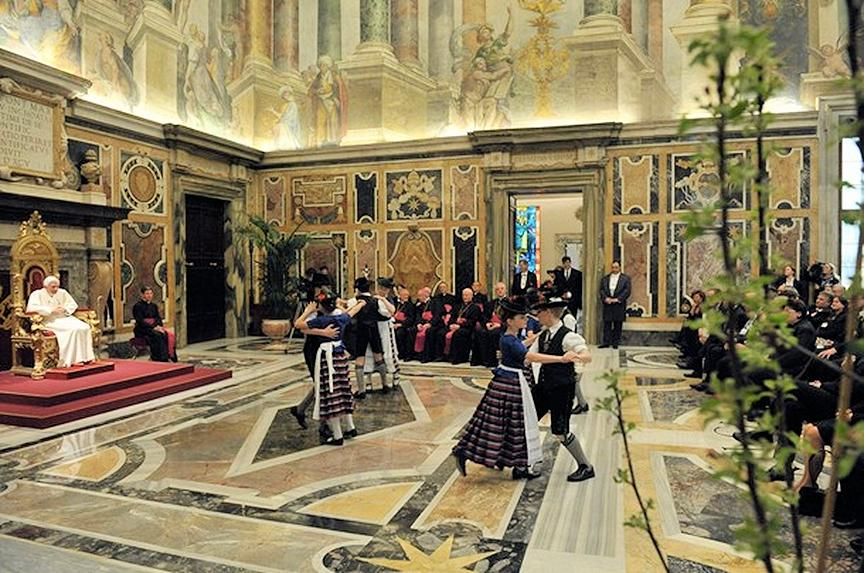
At noon yesterday, in the Sala Clementina of the Apostolic Palace, the Holy Father Benedict XVI received a delegation from Bavaria, led by Cardinal Reinhard Marx, Archbishop of Munich-Freising, and Minister President Horst Seehofer of Bavaria.
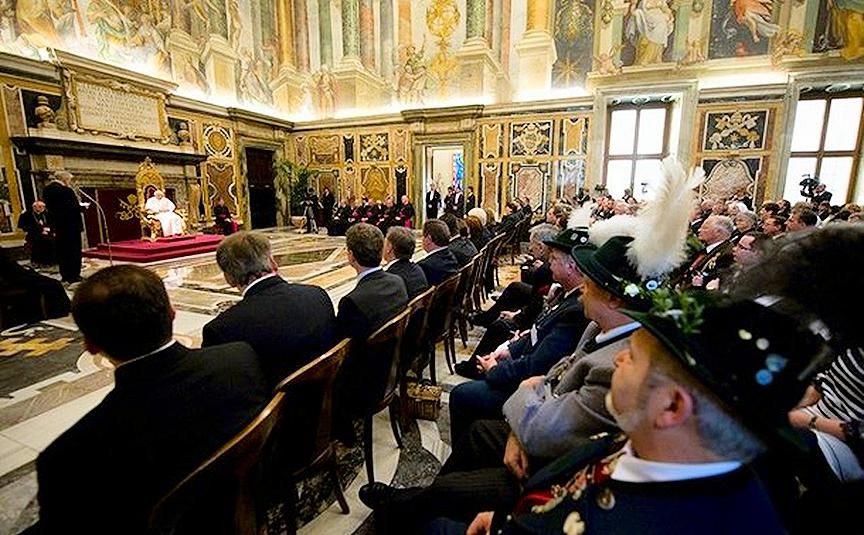
After a program of Bavarian music and dances, and presentation of gifts, the Holy Father addressed his fellow Bavarians extemporaneously. Here is a translation from the German transcript:
Dear and Honorable Minister President,
Eminence,
Dear fellow Bavarians and friends:
You must excuse me from having to mention and address everyone by your individual titles - it would be too long. But I assure you that I read the invitation list of those who have come here twice with my heart, and in doing so, I already greeted each of you interiorly. No one is anonymous here, I know each of you interiorly, happy that you are here to greet me. And so, I have had a dialog with each one - Gruess Gott to everyone!
What do I say at this time? It goes beyond words, and I must express my gratitude in place of what cannot be said. I thank you, Mr. Minister President, for your words. You have expressed the heart of Bavaria in words - a Christian, Catholic heart - which have moved me, and at the same time, you have rendered present everything that is important in my life.
And I thank you no less, dear Cardinal, with your words as the pastor of the diocese that I came from, to which I belonged as a priest, in which I grew up and to which I will always belong inwardly. In your words as a pastor, you have also presented our Christian faith in its beauty and greatness in a new light.
Dear Minister President, you have assembled here a mirror image of the inner and outer geography of my life. The external geography, which is also always an inner one - from Marktl through Aschau, Tittmonin, Hufschlag and Traunstein, and then to Pentling and Regensburg - in all these stations represented here, a piece of my life is always present, in places where I lived, struggled, and became what I am, as I now stand before you, and as I must present myself before the Lord one day.
And with all this, the entire Bavarian way of life: The living Church of our state is present. I thank the Bavarian bishops for this. And thanks be to God, there is the ecumenical dimension as well, with the presence today of the bishop of the Evangelical Church of Munich. It reminds me of the great friendship that bound me to Bishop Hanselmann and which remains one of the memories I treasure, and which tells me how we must go forward.
Likewise, I remember the Jewish community with Dr. Lamm and Dr. Snopkowski - with whom I had heartfelt friendships which brought me closer interiorly to our Jewish people, and to the Jewish people in general - and who are very much present in my memory.
We also have the media here, who have reported to the world what we do and what we say - sometimes we must correct what they think of us - but what would we be without their service?
Then, Mr. President, you also presented the living Bavaria in the children, in whom we see that Bavaria continues to be faithful to herself, and remains young. And precisely because she remains faithful to herself, she grows and prospers.
To this, I must add the music which I have heard, which reminded me how my father played „Gott grüße Dich" on the zither, bringing back the sounds of my childhood, which is also the sound of the present and the future: „Gott grüße Dich" - God greets you…
A full heart calls for many words but at the same time keeps me from saying more because what I have to say is too great to say. But in the end, they all come together in the words with which I would like to end, „Vergelt’s Gott" (God will reward you!).
Other photos of the event available from the news agencies:
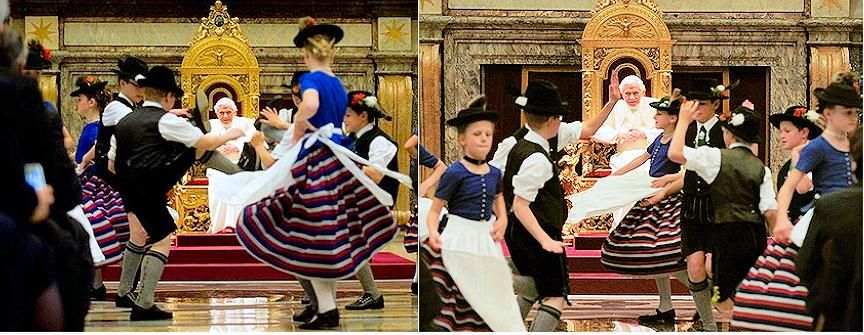
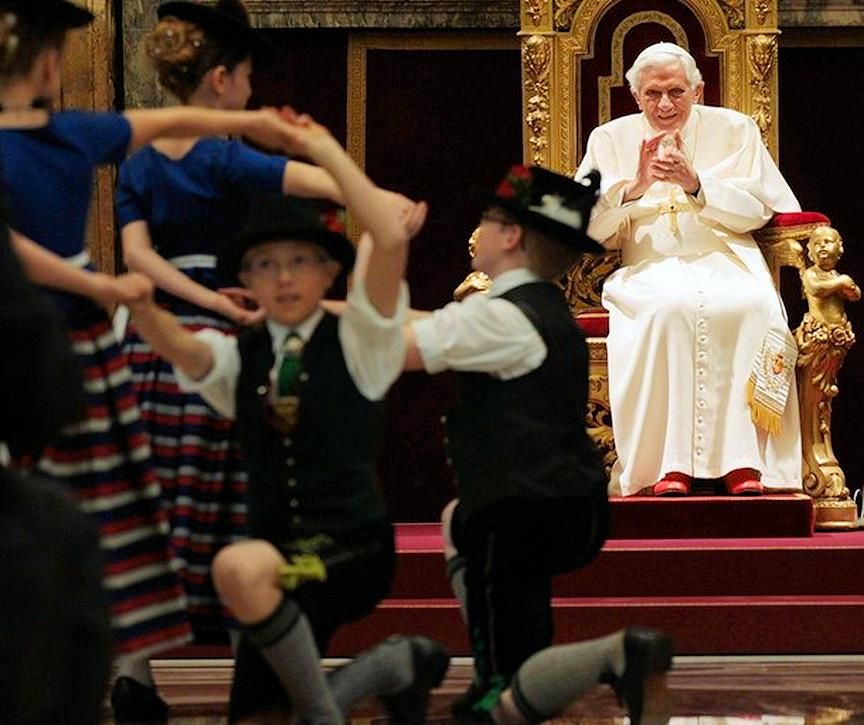 The Pope receives a Bavarian bouquet of edelweiss and gentians:
The Pope receives a Bavarian bouquet of edelweiss and gentians:
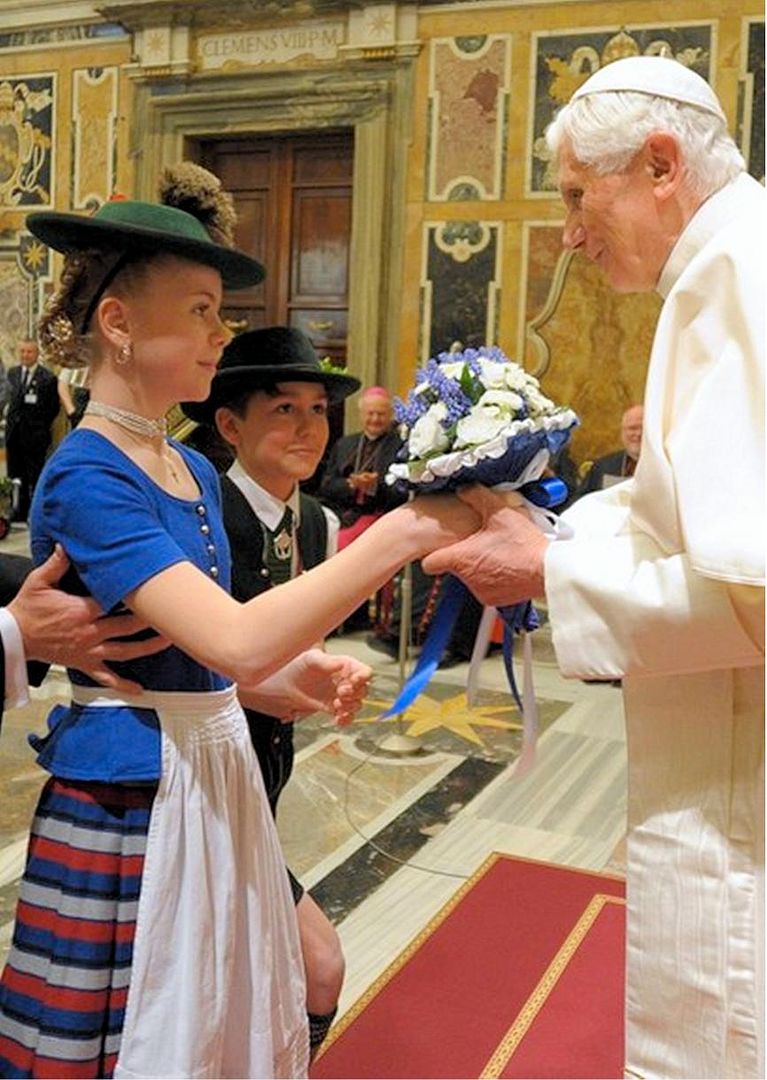 One of the gifts presented to the Pope by President Seehofer was a crucifix:
One of the gifts presented to the Pope by President Seehofer was a crucifix:
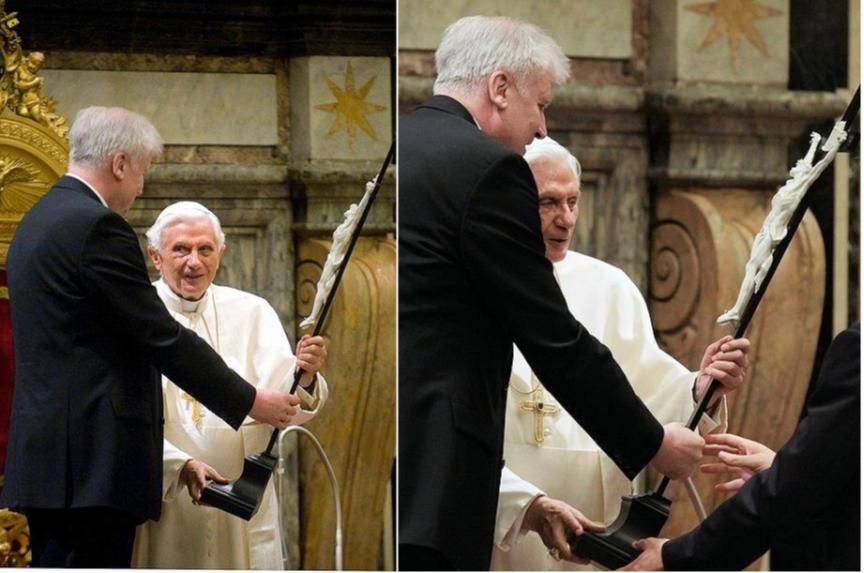
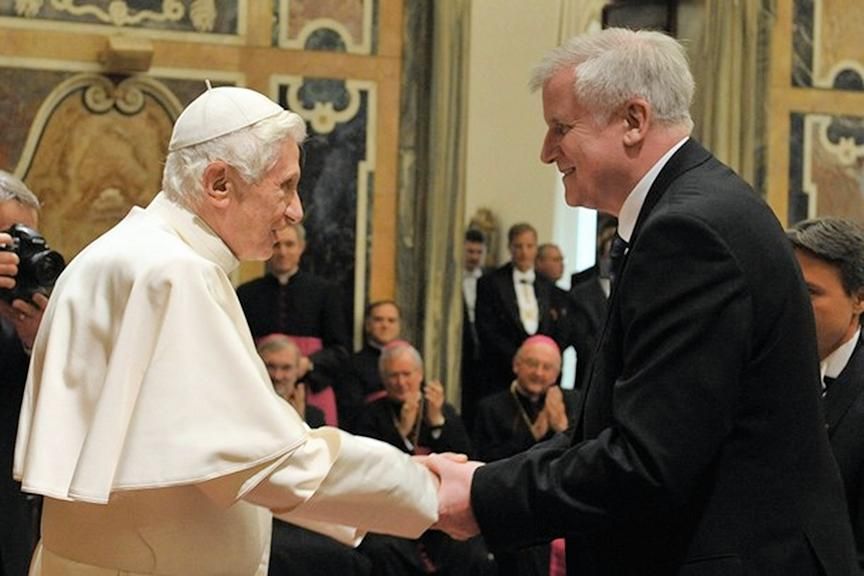
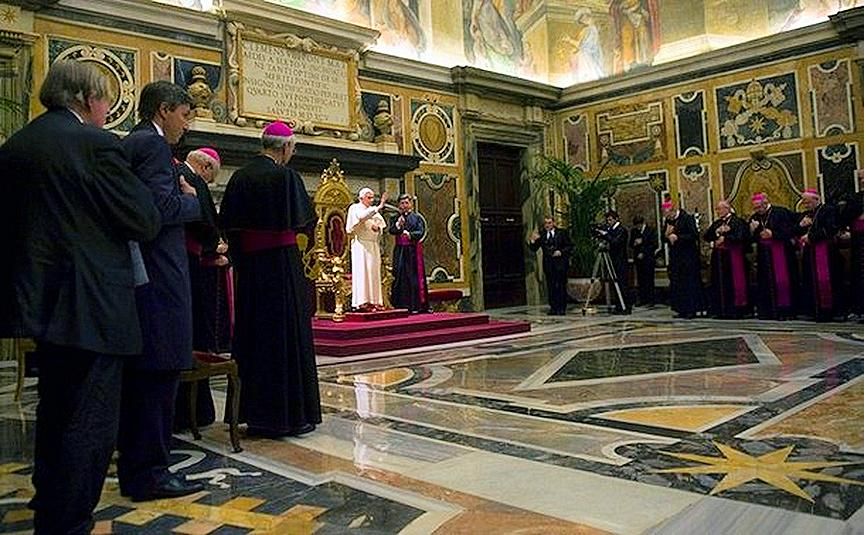

|
| |
 18/04/2013 15:57 18/04/2013 15:57 |
|
| | | OFFLINE | | Post: 26.577
Post: 9.064 | Registrato il: 28/08/2005
Registrato il: 20/01/2009 | Administratore | Utente Master | |
|

 Thursday, April 18, Third Week of Easter
Thursday, April 18, Third Week of Easter
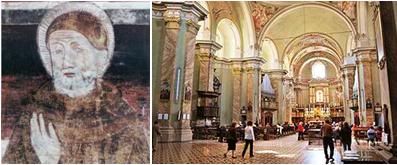 BLESSED JACOPO DA LODI [James of Oldo] (Italy, 1364-1404)
BLESSED JACOPO DA LODI [James of Oldo] (Italy, 1364-1404)
Widower, Franciscan priest
He was a well-to-do citizen of Lodi near Milan who married well and had two daughterS.
He lost both children during a plague, and after that, he and his wife became lay
Franciscans dedicated to helping the poor and the sick. When his wife died, he became
a priest and continued his apostolate with the poor and the sick. Soon after he died,
at least 12 miracles were officially attributed to him, and his body was found incorrupt
when exhumed decades later. He is buried in the Church of Santa Maria Maddalena in Lodi,
his hometown. He was beatified in 1933.
Readings for today's Mass:
www.usccb.org/bible/readings/041813.cfm
AT THE VATICAN TODAY
Pope Francis met today with
- H.E. António Carlos Carvalho de Almeida Ribeiro, Ambassador of Portugal to the Holy See,
who presented his credentials.
- His Beatitude Gregorios III Laham, Patriarch of Antioch of the Greek Melkites (Syria)
- Eight bishops from the northeast Italian regions on ad-limina visit
One year ago today...
After a flurry of articles in past days by leading Vaticanistas in Italy and France anticipating a final positive resolution of the FSSPX issue, the FSSPX itself issued a statement saying flatly that 'the reality is different'. It said FSSPX Superior-General Mons. Bernard Fellay submitted a response on April 17, 2012, to the CDF which on March 16, 2012, had requested a clarification on the FSSPX position regarding the proposed Doctrinal Preamble to any reconciliation, and that this response was but a stage in the process. (As we all know, Fellay's response was reviewed by the CDF and Benedict XVI himself, and subsequently rejected as inadequate because the FSSPX is adamant about its opposition to Vatican II as Church Magisterium.)
And in the annals of Benedict XVI's Pontificate -



On this day last year, the Holy Father resumed his catechetical cycle on Christian prayer, in which earlier, he had begun to reflect on the prayers recounted in the Acts of Apostles. At the end of his plurilingual greetings, he expressed sincere thanks for all the wishes sent to him for the seventh anniversary of his
election as Pope and for his 85th birthday last Monday. He added:
 Here is the entire post on that GA - and I am indulging in a full re-post not just because of the catechesis but also because of the photos that looked particularly impressive for an 85-year-old man...
Here is the entire post on that GA - and I am indulging in a full re-post not just because of the catechesis but also because of the photos that looked particularly impressive for an 85-year-old man...
Full in the panting heart of Rome,
beneath the apostle’s crowning dome,
from pilgrims’ lips that kiss the ground
breathes in all tongues one only sound:
“God bless our Pope, the great, the good!”
- Nicholas Cardinal Wiseman (England, 1802-1865)
Cardinal Wiseman was the first Archbishop of Westminster after re-establishment of the Catholic hierarchy in England and Wales, 1950. He had a remarkable career and was a great speaker and writer but he has tended to be overshadowed by the other 8reat English cardinal of the 19th century, Blessed John Henry Newman.
GENERAL AUDIENCE TODAY
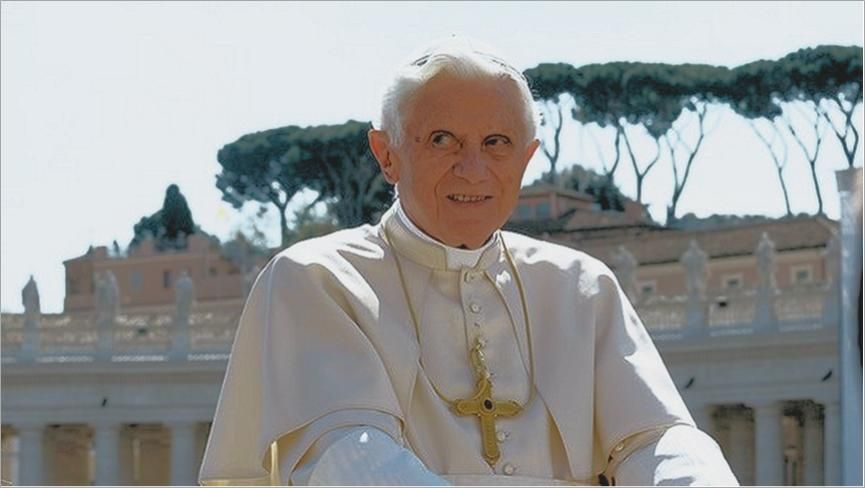 Remarkable insta-portraits of our beloved Benedict at 85 years and 2 days, in most of the news snapshots today. In the photo above, the Roman pines on the top of the nearby Janiculum hill provide a great background.
Remarkable insta-portraits of our beloved Benedict at 85 years and 2 days, in most of the news snapshots today. In the photo above, the Roman pines on the top of the nearby Janiculum hill provide a great background.
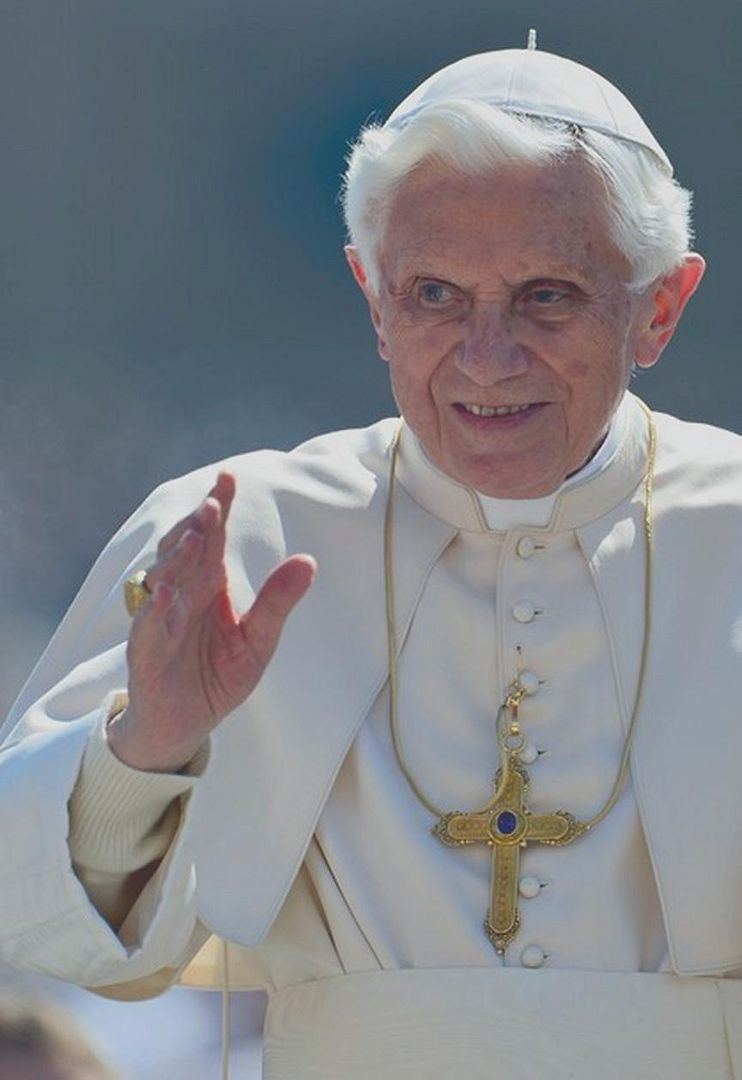
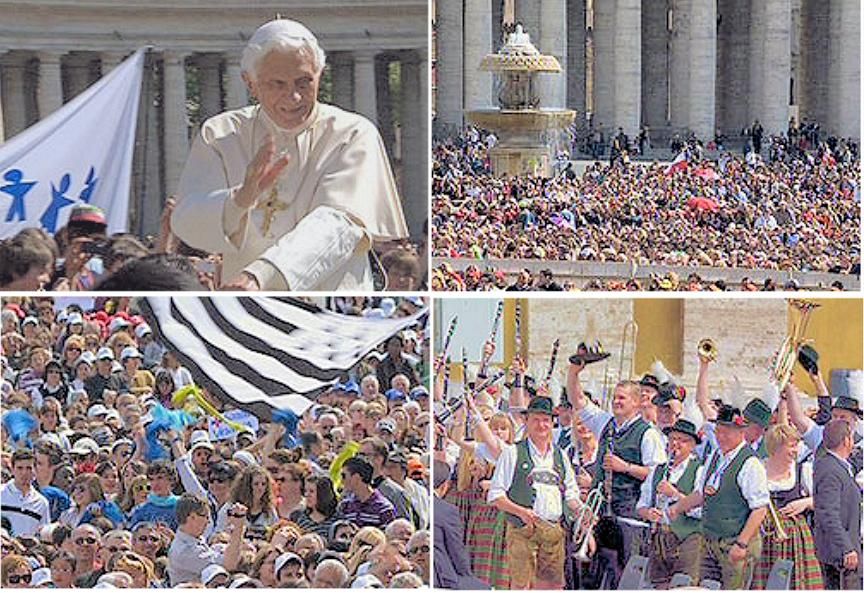
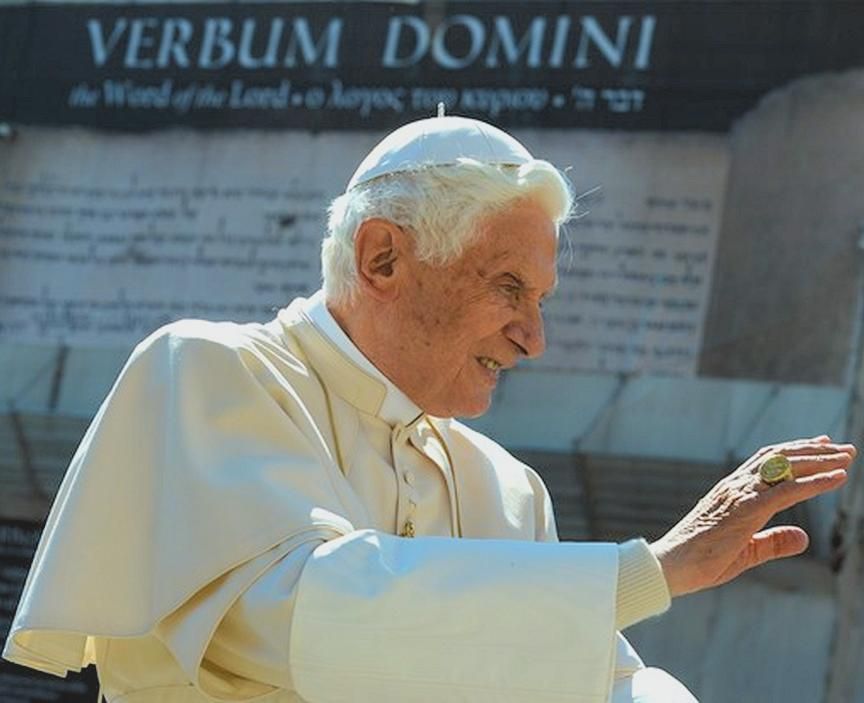
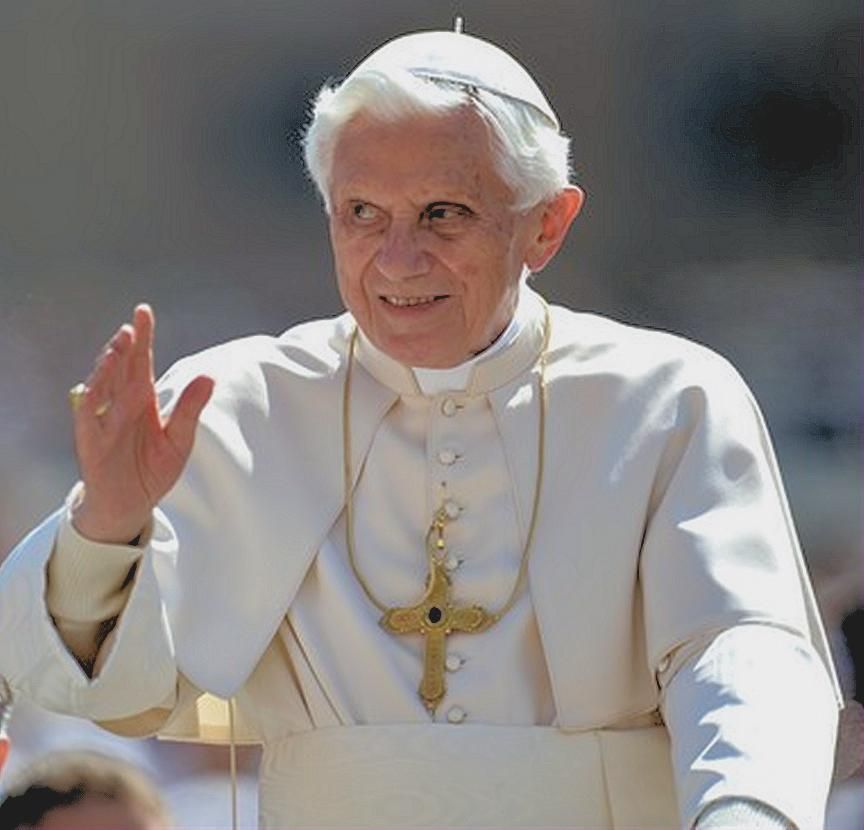 Even in persecution, the Church prays
Even in persecution, the Church prays
to be able to proclaim the faith

April 18, 2012
The Easter holidays may be over but there was an atmosphere of celebration in St Peter’s Square today as an estimated 40,000 pilgrims cheered Pope Benedict XVI and, in diverse languages, wished him a happy 85th birthday and “many more years” as Pastor of the Universal Church on the eve of the 7th anniversary of his election as Pope.
The Holy Father toured the piazza in an open-topped Popemobile, before and after the catechesis, and appeared well-rested after his six-day rest last week at the summer residence in Castel Gandolfo.
Some of the pilgrims held up giant banners expressing their best wishes for him. Later, he asked them to pray for him so that he may “persevere in his service to Christ and His Church”.
After a break of a few weeks in his catechetical cycle on Christian prayer - on account of his trip to Mexico and Cuba, his report on the trip, the Paschal Triduum, and a post-Easter catechesis - the Holy Father resumed the cycle by reflecting on the 4th chapter of the Acts of the Apostles, inspired by the story of Peter and John who were imprisoned - after healing a paralytic - because they had announced the resurrection of Jesus.
Here is a translation of the full catechesis:
Dear brothers and sisters,
After the great feast days, let us now return to the catecheses on prayer. In the audience before Holy Week, we dwelt on the figure of the Blessed Virgin Mary, present among the Apostles in prayer at the moment they were waiting for the descent of the Holy Spirit.
A praying atmosphere accompanied the first steps of the Church. Pentecost is not an isolated spirit, since the presence and the action of the Holy Spirit constantly guides and animates the journey of the Christian community.
In the Acts of the Apostles, in fact, St. Luke - beyond recounting the great effusion that descended over the Cenacle 50 days after Easter (cfr Acts 2,1-13),, refers to other extraordinary irruptions of the Holy Spirit, which return in the history of the Church.
Today, I wish to dwell on that which has been called the 'little Pentecost' which took place at the climax of a difficult phase in the life of the nascent Church.
The Acts of the Apostles narrate that, following the healing of a paralytic near the Temple of Jerusalem (cfr Acts,3-10),. Peter and John were arrested (cfr Acts 4,1), because they had been announcing the Resurrection of Christ to all the people (cfr Acts 3,11-26).
After a summary trial, they were set free, they went back to their brothers and told them what they had to suffer because of the witness that they been bearing about Jesus the Risen One. At that time, St. Luke says, "they raised their voices to God with one accord" (Acts 4,24).
Here, St. Luke reports the most ample prayer of the Church that we can find in the New Testament, at the end of which, as we heard, "the place where they were gathered shook, and they were all filled with the holy Spirit and continued to speak the word of God with boldness. (Acts 4,31).
Before considering this beautiful prayer, let us note an important basic attitude: In the face of danger, of difficulties, of menace, the first Christian community did not seek to analyze how they would react, nor look for strategies on how to defend themselves, nor measures to adopt, but put to the test, they proceeded to pray, to make contact with God.
And what characteristic dis this prayer have? It was unanimous and agreed upon by the entire community who were facing a situation of persecution on account of Jesus. In the original Greek, St. Luke uses the word homothumadon - everyone together, in agreement - a term which appears in other parts of the Acts of the Apostles to underscore this unflinching and unanimous prayer (cfr Acts 1,14).
This unanimous concord is the fundamental element of the the first community and it must always be fundamental for the Church. Therefore it was not just the prayer of Peter and John who had found themselves in danger, but of the whole community, because whatever the two Apostles experienced did not just concern them but the whole Church.
In the face of persecutions they had to undergo because of Jesus, not only was the community not frightened nor were they divided, but were profoundly united in prayer, as one person, to invoke the Lord.
This, I would say, is the first miracle that takes place when believers are put to the test because of their faith: unity is consolidated instead of being compromised, because it is sustained by a steadfast faith.
The Church must not fear persecutions, which she has been forced to undergo in her history, but must always trust, as Jesus did on Gethsemane, in the presence, the help and the strength of God, whom we invoke in prayer.
Let us take another step. Wat does the Christian community ask God in this time of trial? They do not ask that their lives be saved in the face of persecution, nor that the Lord deal with those who had imprisoned Peter and John. They only ask to be allowed "to continue to proclaim the Word of God with boldness" (cfr Acts 4,29) - that is, they pray not to lose the courage of faith, the courage to announce the faith.
First, however, the community seeks to understand in depth what had happened, it seeks to read events in the light of faith, and they do this precisely through the Word of God, which enables us to decipher the reality of the world.
In the prayer that they raise to the Lord, the community starts by remembering and invoking the greatness and immensity of God: "“Sovereign Lord, maker of heaven and earth and the sea and all that is in them" (Acts 4,24).
It is an invocation to the Creator: we know that everything comes from him, that everything is in his hands. This is the awareness that gives us certainty and courage - everything comes from him, everything is in his hands.
They then proceed to acknowledging how God has acted in history - so, the prayer begins with the creation and continues with history - how he has stayed close to his people, showing himself to be a God who is interested in man, who has not retreated, who does not abandon man, his creature.
Here Psalm 2 is explicitly cited, in the light of which one must read the situation of difficulty that the Church was experiencing at that time. Psalm 2 celebrates the enthronement of the King of Judea, but refers prophetically to the coming of the Messiah. "Why did the Gentiles rage and the peoples entertain folly? The kings of the earth took their stand and the princes gathered together against the Lord and against his anointed" (Acts 4,25-26).
The Psalm says this of the Messiah, and this rebellion of the powerful against the might of God is characteristic in all of history. In reading the Word of God, the community could say its prayer to God: "Indeed they gathered in this city against your holy servant Jesus whom you anointed... to do what your hand and [your] will had long ago planned to take place. (Acts 4,27-28).
What happened must be read in the light of Christ, who is the key to understanding even persecution: the Cross, which is always the key to the Resurrection. The opposition to Jesus, his passion and death, must be reread, through Psalm 2, as the realization of the plan of God the Father for the salvation of the world.
Here we also find even the sense of the persecution which the first Christian community was experiencing. This first community was not just a simple association, but a community that lives in Christ; and so, what was happening to them was part of God's plan.
Just as it happened with Jesus, eh disciples too encountered opposition, incomprehension, persecution, In prayer, meditation on Sacred Scripture in the light of Christ's mystery, helps us read the reality within the story of salvation that God is working on the world, but always according to his way.
Because of this, the request that the first Christian community of Jerusalem formulated to God in prayer was not to be defended, to be saved from being tested, from suffering- it was not a prayer asking for success, but only to be able to proclaim the Word of God with paressia - with boldness, freedom and courage. (cfr Acts 4,29).
They then add the request that this announcement may be accompanied by the hand of God so that healings, signs and wonders could take place (cfr Acts 4,30), namely, that the goodness of God be made visible, as a force that transforms reality, which changes the heart, the mind, the life of men and bears the radical newness of the Gospel.
At the end of the prayer, St. Luke notes, "the place where they were gathered shook, and they were all filled with the holy Spirit and continued to speak the word of God with boldness" (Acts 4,31). The earth shook, that is, faith has the power to transform the earth and the world.
After the prayer of the Church, the same Spirit who spoke through Psalm 2 floods the house and fills the hearts of all those who had invoked the Lord. This is the fruit of the unanimous prayer that the Christian community raised to God: the effusion of the Spirit, gift of the Resurrected One who sustained and guides the free and courageous announcement of the Word of Dog, which impels the disciples of the Lord to go forth without fear and bring the Good News to the ends of the earth.
Even us, dear brothers and sisters, we must know how to bring the events of our daily life into our prayer in order to find its profound significance. And like the first Christian community, we too, allowing ourselves to be enlightened by the Word of God, through meditating on Sacred Scripture, can learn to see that God is present in our life, present even in and especially during our difficult moments, and that everything - even incomprehensible things - are part of a superior plan of love in which the final victory over evil, sin and death is truly that of goodness, of grace, of life, of God.
As it was for the first Christian community, prayer helps us to read our personal and collective history in the most correct and faithful perspective, that of God. We too would like to renew a request for the gift of the Holy Spirit, who warms hearts and illuminates minds so we can recognize how the Lord answers our invocations according to his loving will, and not according to our ideas.
Led by the Holy Spirit of Jesus Christ, we shall be capable of living with serenity, courage and joy through every situation in life, and with St. Paul, we can "boast of our afflictions, knowing that affliction produces endurance; and endurance, proven character, and proven character, hope. And hope does not disappoint, because the love of God has been poured out into our hearts through the holy Spirit that has been given to us. (Rom 4,3-4). Thank you.
At the end of his customary plurilingual greetings today, the Holy Father said this:
I ask you all to always sustain me with your prayers, so that with the help of the Holy Spirit, I may persevere in my service to Christ and to the Church.
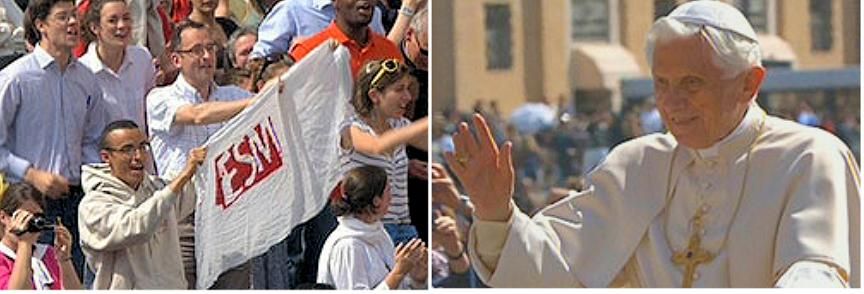
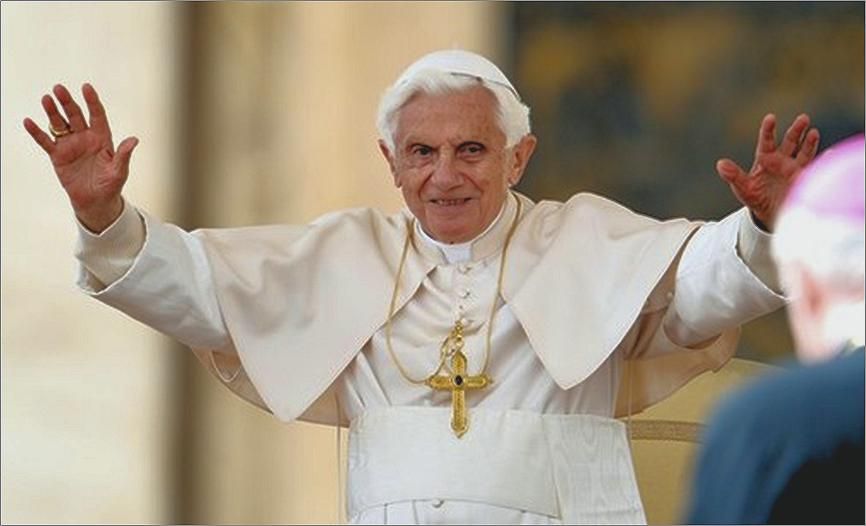
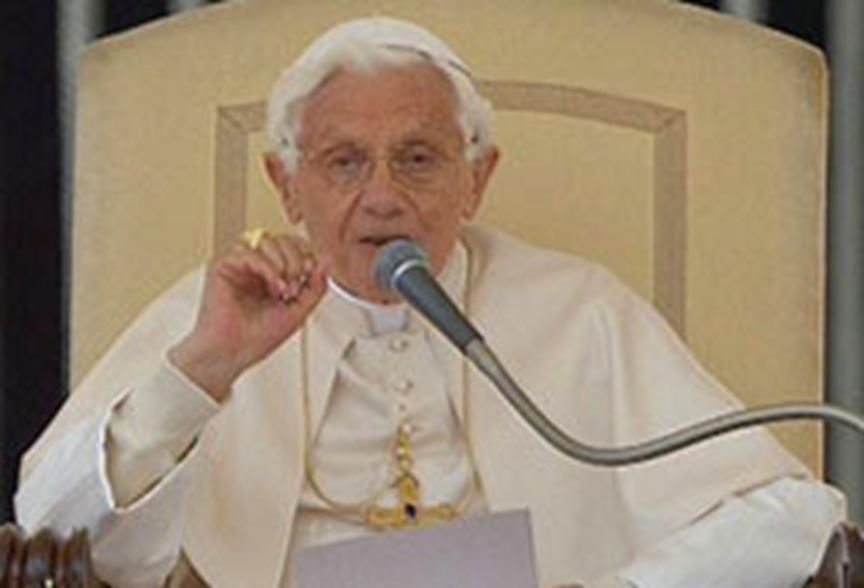
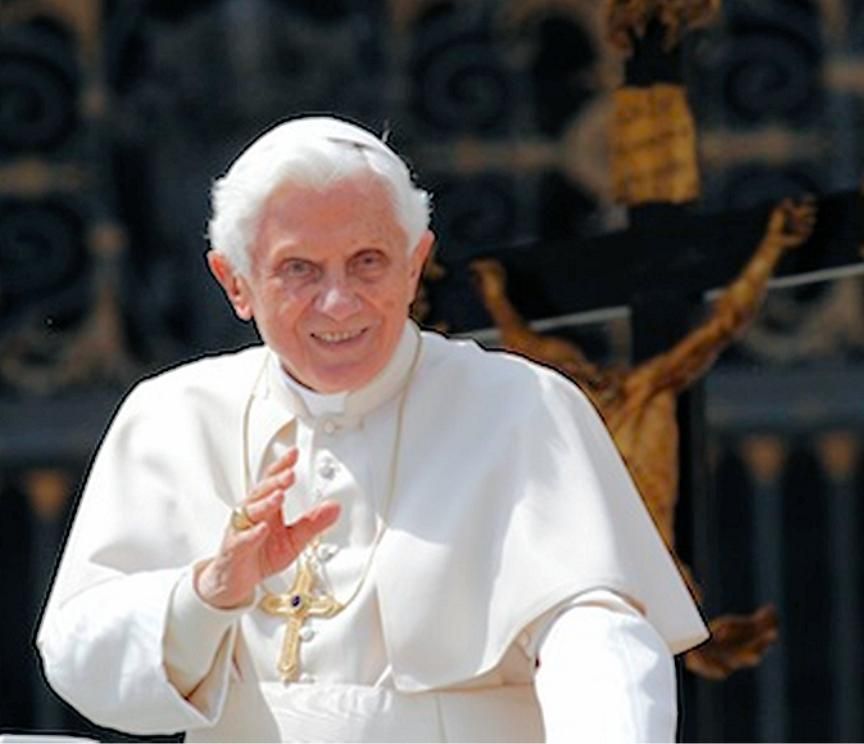
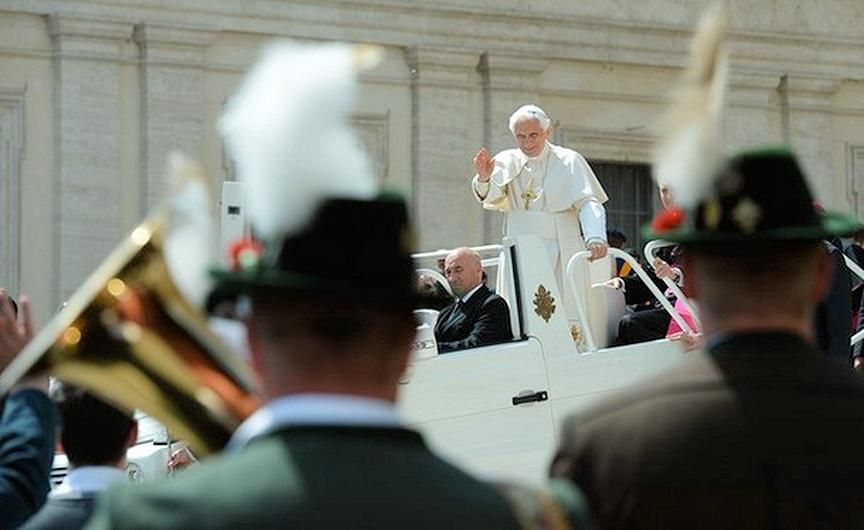
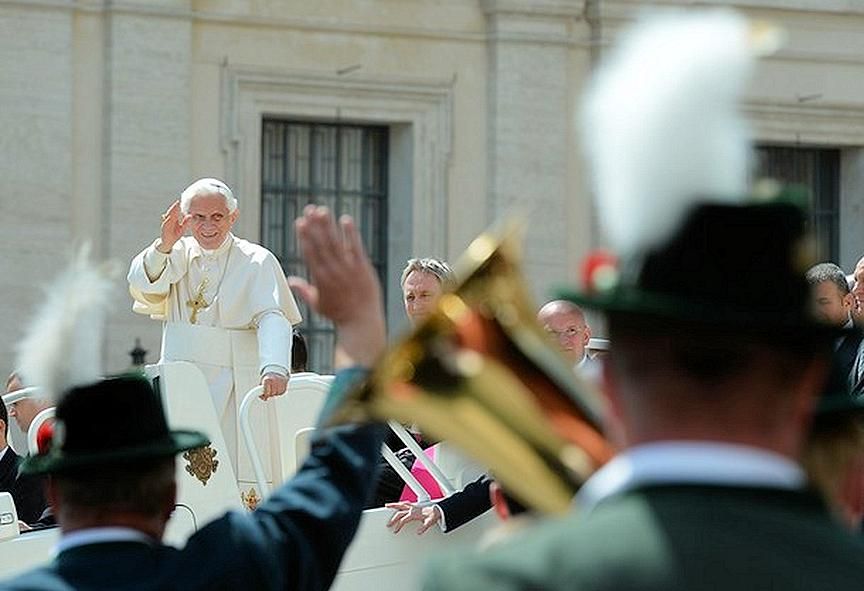


|
| |
 19/04/2013 13:40 19/04/2013 13:40 |
|
| | | OFFLINE | | Post: 26.579
Post: 9.066 | Registrato il: 28/08/2005
Registrato il: 20/01/2009 | Administratore | Utente Master | |
|
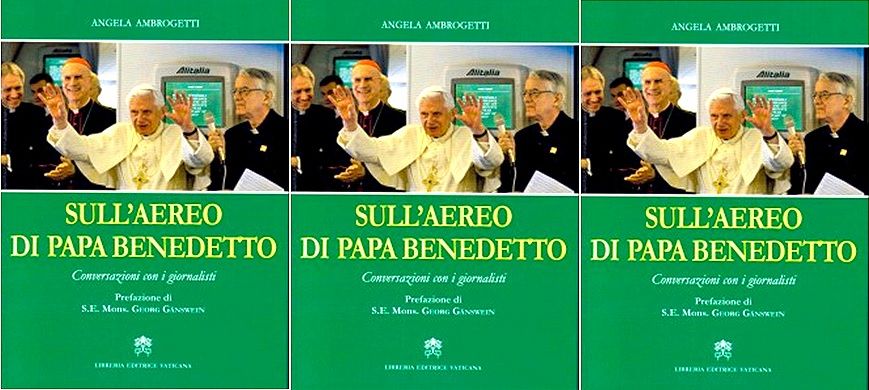 A birthday book for Benedict XVI on his 86th from the Vatican publishing house LEV and Vatican correspondent Angela Ambrogetti, editor of the online Catholic magazine korazym...I do have a few comments on some of her observations which I consider inexact based on my having followed all of these inflight interviews, from the initial reports filed by about them to translating them into English immediately from the first transcripts posted by the newsmen travelling with the Pope (mostly Andrea Tornielli and John Allen).
Benedict's inflight interviews
A birthday book for Benedict XVI on his 86th from the Vatican publishing house LEV and Vatican correspondent Angela Ambrogetti, editor of the online Catholic magazine korazym...I do have a few comments on some of her observations which I consider inexact based on my having followed all of these inflight interviews, from the initial reports filed by about them to translating them into English immediately from the first transcripts posted by the newsmen travelling with the Pope (mostly Andrea Tornielli and John Allen).
Benedict's inflight interviews:
Introduction to the book
by Angela Ambrogetti, ed.
Translated from

April 16, 2013
Today, Pope Emeritus Benedict XVI turns 86. Beyond our greetings for his birthday, we wish to pay him homage by publishing excerpts from the Introduction to the book Sull'aereo di Papa Benedetto edited by Angela Ambrogettti and published by Libreria Editrice Vaticana, the Vatican publishing house.
The book contains the texts of the news conferences that Benedict XVI has had with newsmen travelling with him on the way to his 24 apostolic visits outside Italy. The Preface of the book is by Mons, Georg Gaenswein, private secretary of the emeritus Pope and Prefect of the Pontifical Household, with an introduction from Fr. Federico Lombardi, Vatican news director.
When Benedict XVI went to Mexico and Cuba, he registered a first in the Papacy - he became the oldest Pope ever to travel outside Italy. This explains much of the significance of the foreign travels of the theologian Pope who inherited the Papacy from the traveler Pope John Paul II.
When, on April 19,2005, the cardinal electors chose Joseph Ratzinger as the 264th Successor of Peter, no one had imagined that Benedict XVI would travel as much as his immediate predecessor. He had just turned 78, and as Prefect of the Congregation for the Doctrine of the Faith for almost a quarter century, he had dedicated his time primarily to examining texts [though surely that was not the main task of the CDF Prefect!] - he was the theological soul of John Paul II's Pontificate, and he was certainly no traveler.
But the world knew him well. Around the world, the faithful met him every day through the stories of the bishops who came to see him in Rome during their ad-limina visits to confide their problems and to seek his advice. That is how the Bavarian cardinal kept in touch with all the churches around the world during his almost 25 years as CDF Prefect.
As Pope, Benedict XVI wished to respond to all the invitations sent to him from abroad by sending his Secretary of State, Cardinal Bertone, instead. Outside of those for which he had to be present in person.
As in Cologne, for World Youth Day in August 2005, the first such assembly since the death of the father of WYD, John Paul II. Benedict XVI took on the assignment and introduced a 'novelty' to WYD - Eucharistic Adoration.
It marked the start of a new history for WYD and for the style of papal trips. Slowly, the organizational mechanism at the Vatican adapted to the new style. There were those who feared that Benedict XVI's characteristically minimal style would result in empty squares and streets.
Instead, in one trip after another, the modest and reserved Benedict XVI amazed everyone as each of his trips became a huge success. One could almost say that Benedict XVI gave the best of himself on the great stage of the world, far from a certain atmosphere that was Italian, Roman and curial. [I would disagree that Benedict XVI's public appearances - or those of any Pope, for that matter - are particularly associated with the Curia in the minds of the faithful. The Pope is so distinct and far above and beyond any other figure in the Church that it is unlikely the faithful would even think of any other Church figure in his presence! Besides, his reception in all the Italian dioceses he visited was just as successful as his foreign trips.]]
Among the 'legacies' that Benedict XVI carried on from John Paul II and transformed was his relationship with the newsmen who travelled with him on the trips abroad.
John Paul II had 'created' a new way of dialog with the media in utilizing the in-flight hours on the way to a travel destination. It was a very direct way, initially somewhat chaotic even - questions and answers on every topic, eventually becoming true and proper news conferences.
Benedict XVI, who as cardinal, had freely given interviews to newsmen in an organized way, made himself available to the media for these in-flight interviews.
His answers soon became small lessons offered by Professor Ratzinger to the media. But these were not arid or academic words, but words full of emotion, of recollections and of personal comments. He wove together history, theology and ecclesiology to offer the media a key to reading the trip he was undertaking, but he also faced 'thorny' issues that are daily raised in the media.
This way, he established a relationship that was calm and at times, distant. He knows that communications is important, but did not wish to be drawn into specious controversies over Church issues.
Nonetheless, each inflight news conference became a media event. The newsmen on the flight hastened to report the highlights, and some even sought to transcribe the half-hour event for immediate posting on the Internet, with the result that often, this story tended to overshadow the Pope's arrival statement at his destination. A media dynamic that Benedict XVI apparently did not mind.
As a cardinal, he was always open to any question asked of him during a news conference. But if he was asked for an individual interview, he requested to be sent the questions beforehand. As Pope, Benedict XVI was interviewed by Peter Seewald for the book-length Light of the World, in which one notes that he continued to pay extreme attention and care to prepare for the interview.
Besides, Benedict XVI also allowed himself to be questioned by regular folk in the Good Friday 2011 broadcast of RAI Italian state TV's program 'A Suo Immagine'. He answered three questions on the courage of faith in the face of great sorrow and persecution, and four questions on the truth of the faith.
To a seven-year-old Japanese girl, who had been among those displaced by the Fukushima earthquake and nuclear crisis, he said, "At this moment, it is important that you remember this - God loves me, even if he seems not to know me". To the mother of a boy in coma, he said: "I an certain that his hidden soul feels your love profoundly, even if he does not understand details or words - the presence of love is felt". To the Christians of Baghdad, he said, "We wish to work for reconciliation, for understanding, even with the government, to help it in the difficult job of repairing a lacerated society".
He spoke of dialog with Islam, of peace, of life after death, what the Resurrection is: "Jesus will not die again - he is above the laws of biology and physics, because under such laws, a person dies. So there is a new and different condition that we do not know but which is actually demonstrated by Jesus - it is thereat promise for us all that there is a new world, a new life, towards which we are journeying".
Difficult topics that Benedict XVI faced with clarity and simplicity. Words which reach the mind and the heart.
And yet, Joseph Ratzinger seems to have been little understood by the media. Despite his directness and h is availability to the media, many among them nonetheless wrote about his 'communicative inability'. The truth is that Prof. Ratzinger wants to be listened to in calm.
He has confronted difficult topics with clarity and simplicity. Words which reach the mind and the heart.
The discourses of Benedict XVI require attention and preparation. As a professor who was used to address students as well as to interact with other professors, he developed an ample and complete discourse which requires to be followed in its entirety. Whereas the media has mostly sought only to catch an easy soundbite, a sort of slogan, in 140 characters since Twitter began, that can be launched quickly on the social networks.
Here is were the mistakes arise. Just as it was in Regensburg with his historic lecture at the University. Superficiality and haste threatened to destroy one of the most important steps forward made for the dialog between Christians and Muslims.
The media chaos caused real chaos which placed human lives in danger [and did cost the life of an Italian nun working in Somalia] All of this obviously farthest from what Benedict XVI had intended.
After this 'incident', the Pope had to face other similar episodes. In part, the Pope himself acknowledged, the responsibility lay with him and the Curia. As in the announcement that he had lifted the excommunication of the four FSSPX bishops, one of whom was a Holocaust denier. [In fact, the 'acknowledgment of responsibility' was only made for this particular case, not for any of the other misreporting 'episodes'.]
But even the Williamson episode was an obvious case of media manipulation of facts which, if they had been explained in their entirety, would not have had the same consequences.
Moreover these media episodes were highlighted much more than in previous Pontificates when Benedict XVI's predecessors had their own problems with the media.
Even John Paul II, who was considered the media Pope par excellence, was for many years referred to as 'a Polish bigot' by some media circles, and many of his gestures were misinterpreted. [One would have welcomed it if Ambrogetti had cited a couple of examples]
But for the media, the years of his illness transformed him into a silent icon of suffering and the fiery words directed against him in the 1980s were forgotten.
Benedict XVI liked his intimate and direct relationship with the faithful. In the parishes of Rome that he visited, he often did not simply read his homilies but spoke extemporaneously to express his reflections on the readings for the day.
Before large crowds, he read his texts which were distributed to everyone so they could follow him. [Is this a fact? I have never come across it before! I know Peter Seewald reports in his 2005 biography of Joseph Ratzinger that when he was Archbishop of Munich, the diocese had to print as many as 50,000 copies of each of his very popular homilies in response to public requests. Journalists had the duty to read these texts at leisure, but they apparently did not do so, because they were only looking for whatever was 'newsy', forgetting that for a Pope, the only news is the Gospel. [The Pope's regular texts, but not the inflight interviews, were usually available promptly in their original version on the Vatican site, and in English translation in the English service of Vatican Radio.]
John Paul II's Pontificate in its later years had accustomed the media to gleaning 'political slogans' from his discourses which spoke of human rights, social justice, and the presence of the Church in the world. All this as a natural consequence of announcing the Gospel. But the consequence received far more attention than what motivated it.
In the new historical era we are living [post John Paul II and at the dawn of the new millennium], Benedict XVI explained to the world why the Church speaks of human rights, peace and social justice. But the media world seemed even less prepared to convey these explanations. And so news became newsbites, which led in the long run to losing the more ample meaning of his Pontificate.
The year 2012, 60th anniversary of the opening of the second Vatican Council, also marked the moment when the media started once more to speak about ideas and facts rather than indiscretions and gossip. [How can anyone say this about the year of Vatileaks???? And what ideas and facts about the Pontificate and the Church did the media discuss in 2012?]
Let us try to reread the words that Benedict XVI said directly to the international media in his inflight interviews, following the example of John Paul II but in a way appropriate to his own personal traits.
It was a personal communication, man to man, a dialog that involved reason and intelligence despite the simplicity of his expositions. The texts of Benedict XVI's inflight encounters with the media were immediately made public on the Vatican website. [Not until the last few trips! Before then, one had to rely on the tape transcriptions by some of the newsmen travelling with the Pope.]
In his first few trips, these consisted of brief greetings when spokesman Joaquin Navarro-Valls [who continued for 15 months as Vatican news director under Benedict XVI] reprised the practice that had been discontinued since 2000 with the worsening of John Paul II's ailment.
In fact, Benedict XVI's first foreign trips were preceded by televised interviews with selected journalists from the countries he was visiting - before WYD in Cologne in 2005, and before his visits to Poland and Bavaria in 2006.
This book was born precisely in order to set forth the ideas and reflections that Benedict XVI offered to the world media as he set off on his apostolic trips abroad.
These are integral texts which allow the reader to understand more fully the thinking of the theologian Joseph Ratzinger who was also Pope Benedict XVI, but also to recognize his profound humanity and his desire to communicate to the world the only true news which changed history.
In some cases, the newsmen themselves asked the questions, but eventually, Fr. Federico Lombardi chose to pool the various questions submitted by the journalists and summarize the essential questions to the Pope in various languages.
The Pope replied most often in Italian, the working language of Vaticanistas, but also used French, Spanish, English or German as needed.
But the Pope is a perfectionist, and the transcripts were generally reviewed by the Secretariat of State before being published by the Vatican, but without modifying the freshness of the style. [In fact, the Vatican transcripts were generally faithful to those published earlier by the journalists who taped the sessions, except for the misbegotten attempt to 'soften' what he said about condoms on the way to Cameroon in March 2009.]
Obviously, these conversations do not begin to cover the richness of themes that the Pope would address in the discourses made during the actual visit, but they do provide an easier orientation to his Magisterium.
They are also a journey into the heard of the 'great lover' who made love and joy the key words of his entire Pontificate.
|
| |
 19/04/2013 13:45 19/04/2013 13:45 |
|
| | | OFFLINE | | Post: 26.580
Post: 9.067 | Registrato il: 28/08/2005
Registrato il: 20/01/2009 | Administratore | Utente Master | |
|

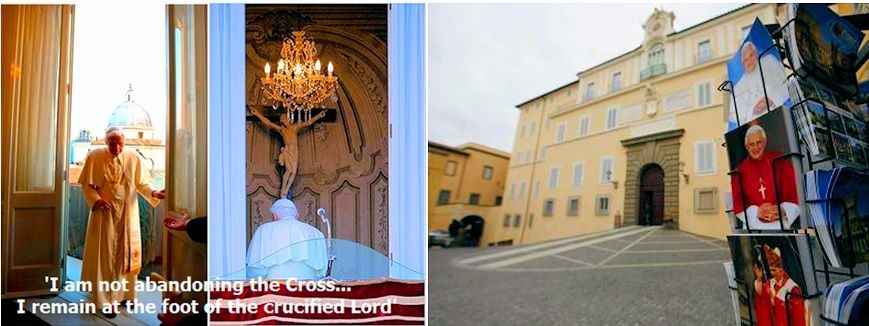 Some birthday/anniverary items from the Italian media...
The eloquent silence
Some birthday/anniverary items from the Italian media...
The eloquent silence
of Benedict XVI
by Fabio Ciardi
Translated from

April 16, 2013
Today is the birthday of Joseph Ratzinger. For a day, the spotlights may turn back on for the emeritus Pope, but tomorrow they will be turned off again.
The spotlights are all fully turned on for Pope Francis, who is 76 years old, which is not too old for a Pope, and who appears youthful, dynamic and creative. He continues to be a daily topic for conversation. His books and books about him are selling very well, and his videoclips available on Youtube are very much watched.
Meanwhile, the ‘old Pope’ has entered into a media eclipse. Today, there may be a brief flicker of acknowledgment to mark his 86th birthday. But tomorrow, it will be silence again, even if not oblivion. [It might as well be oblivion. Lack of precedent has apparently led even the Vatican communications machinery itself – but thankfully, not Pope Francis, whose generous attention and near-deference to his predecessor his minions have totally failed to emulate – to ignore common sense about how to treat a living former Pope decently.]
And it is precisely silence which characterizes this phase of Benedict XVI’s life. Not so much the silence about him, but his own silence. We know that he is at the papal residence in Castel Gandolfo, but he no longer shows himself on the balcony and he is no longer heard on Wednesdays and on Sundays.
We know where he is but we do not know what he is doing. [We do have a general idea – he prays, he meditates, he reads, he watches the news at night; perhaps he continues to write, to play the piano, to listen to music. It is a contemplative life in which, like all the contemplatives around the world, his only responsibility is to pray and meditate, for the good of the Church, the men and women who work in her service, and all the faithful.]
Since February 28, all we have seen is a photograph stolen by some ingenious cameraman and the brief video of his meeting with Pope Francis. Otherwise, nothing. He seems to have disappeared. [Of course, we have also been notified of the telephone calls made to him by Pope Francis, for which we are all grateful, not just for the Pope’s thoughtfulness, but for the fact that, since they are legitimate events to report about the new Pope,the Vatican has necessarily informed us about these calls.]
The ‘old Pope’ no longer speaks. That is, he no longer speaks to us directly. He continues to speak, but his voice is addressed elsewhere, up high. He said about his renunciation, “The Lord calls me to ‘climb the mountain’, to dedicate myself even more to prayer and meditation”.
It is his new way of serving the Church, with the same dedication and love that he did as Pope, but “in a way more appropriate to my age and remaining strength”.
We do not see what he is doing, But we know what it is. He is following Jesus, who at night, would go up the mountain to pray. And what did Jesus tell the Father in those long and solitary conversations? We do not know.
But on the last night of his earthly life, he spoke to his Father aloud, allowing us to share that ‘conversation’. He prayed for his disciples, he prayed for all those whom the Father had entrusted to him, fore the future Christian community, for all mankind, that all may be one. Perhaps only in that moment, thanks to that prayer, his disciples first realized how much Jesus loved them.
If we could enter the chapel where Benedict XVI prays, we too would find someone like Jesus who continues to pray to the Father for us, and as disciples, we too would realize how much he loves us. Just as there is the Jesus who goes among the people, announces the Gospel and performs miracles, there is also the Jesus who raises his eyes to the Father and sustains the life and work of the Church.
In his silence, Benedict speaks to God, but he also speaks to us. In a new way compared to how he spoke to us in the past eight years. But how eloquent is his silence!
He tells us that without the presence of the Lord, our work could be all in vain; that without roots, a tree cannot grow; and that without the right foundation, a house can collapse.
He proclaims the fruitfulness of humility which, in tis Latin etymology, goes back to humus, the word for the good earth, which is capable of bearing good fruit, that which it is supposed to give according to the seasons.
He reminds us that true power is in caring for others, in serving them.
And so Benedict XVI continues to do what he said he would when he first presented himself to the world as Pope on April 19, 2005, and called himself ‘a simple humble worker in the vineyard of the Lord’.
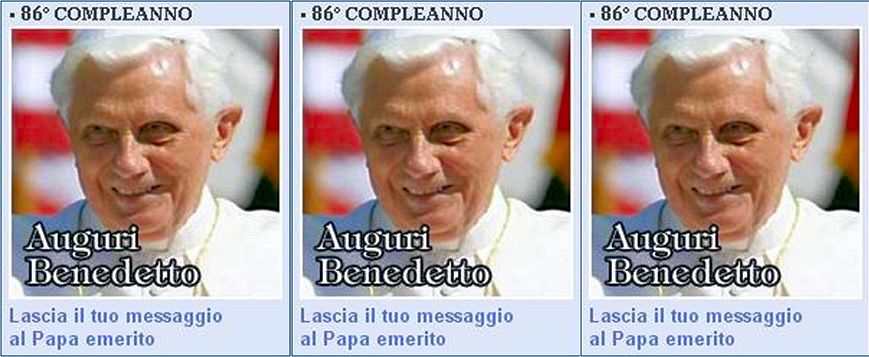 A cascade of wishes
A cascade of wishes
for Benedict XVI on his birthday
The faithful embrace a hidden but ever-close presence
by Antonella Mariani
Translated from

April 18, 2013
Best wishes poured in for a beloved person who is unreachable yet somehow close. Someone we now do not see at all, but whose choice to retire in monastic seclusion we all respect.
“I wish you all the best in the world”.
“I miss you so much”.
“A huge embrace”.
“I wish to say something beautiful which will make you smile, but the best I can do is to say I love you”.
These are spontaneous greetings, as one makes to a beloved family member. Almost as though they were just waiting for the opportunity to express themselves – more than a thousand persons who in just a few hours posted their birthday greetings for Benedict XVI on the Avvenire site.
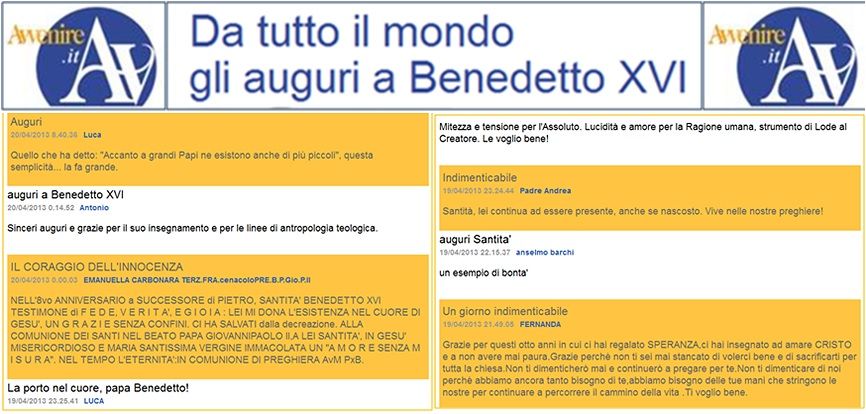 The top of Page 1 of some 160 pages of online pages in Avvenire containing greetings from the faithful to Benedict XVI on his double anniversary.
The top of Page 1 of some 160 pages of online pages in Avvenire containing greetings from the faithful to Benedict XVI on his double anniversary.
A response that was impetuous, as though they had just been waiting to break their silence, to bridge the distance, to renew their contact. “Wish you all the best”, someone wrote in English from Indonesia. Dozens of ‘Felicidades’ from Spain. Messages from Germany, the Philippines, Poland…
Benedict is in the heart of the Christian people. The sudden separation may have stunned many but it has not interrupted a relationship. It was the first opportunity to express themselves. As if their new affection for Pope Francis, the expectations that have been raised daily by his words, rest on their tender friendship and profound communion with his predecessor. As if, indeed, they were two beloved members of the family. As they really are.
Those who wrote Benedict XVI include persons who have experienced a close encounter with him, like a paraplegic Spanish woman who remembers meeting him when he consecrated the Basilica of the Sagrada Familia in Bercoleona in 2010.
There are those who carry him in their heart because of his teachings and writings. Like Sergio paronetti of Pax Christi, who is thankful to him for “educating us to love and joy, and in the idea of omnipotence that is unarmed and disarming”.
There are the simple folk who were moved by the courage of his unprecedented decision to renounce the Pontificate. “Thank you for teaching us that even great men like you can humble themselves”, wrote the family Innocenti from Buccinasco.
These birthday greetings seemed to embody what Benedict XVI had told the faithful at his last Angelus on February 24: “The Lord has called me to ‘climb the mountain; to dedicate myself even more to prayer and meditation. But this does not mean I am abandoning the Church. I will continue to serve the Church but in another way”. And he asked them to continue to feel his spiritual closeness.
Many posts grasped the evangelical dimension of the emeritus Pope’s new hermit-like life.
“We have the strong certainty that your life is a gift to the very end for our Church”, wrote Suor Teodora from Pietrarubia. A sentiment echoed by Giovanna who expresses the wish that “your prayers will bear even more fruit from all the good that you have previously instilled in us”.
It is as if Benedict XVI’s prayers complement the gestures of Pope Francis, in an unprecedented and extraordinary communion that involves the entire Church down to her littlest and humblest members.
“We miss you as father and teacher, as theologian and exegete,” writes Francesco from Acireale, “but we know that you are always close to us in the great communion of the Church”.
Short and simple messages that evoke the image of a People of God who wish the best for their pastors. And who in looking at them, rediscover the one authentic treasure of the faith: Christ.
Thanks to Benedict XVI,
nothing remains extraneous to me
by Roberto Fontolan
Translated from

April 19, 2013
It was genuine humility that Benedict XVI expressed at the start of his Pontificate with a phrase that seemed to me at the time to be too modest. ‘A worker in the vineyard of the Lord’? Of course, but…
Over time, I verified and understood. Papa Ratzinger has never once used words simply ‘in a manner of speaking’, he has never used words in place of others more precise, he never indulged in approximations nor confusion nor involution. A quality of speech that is almost supernatural. No one could express ideas as clear and precise and refined as he does.
With the light but sure hand of a great surgeon, he is able to penetrate every depth and difficulty, bringing light where there was darkness, and simplifying things where there seems to be a labyrinth.
The prodigious talents of the cardinal became his unmistakable trademark as Pastor of the universal Church. No thought was too elevated that he could not make accessible and intelligible. No topic was too embarrassing for him to restore to a disarmingly acceptable truth. No question posed to him failed to gain his consideration.
The grand design of God-Logos in his Regensburg lecture. The brilliant metaphor of the bunker during his first German trip. His cutting criticism of the evils within the Church (the ‘filth’ he evoked in the Good Friday meditations less than a month before he was elected Pope, to the zero tolerance he decreed towards priests who abused minors, and the lack of internal unity which he lamented to the very end of his Pontificate). His praise of ‘disquiet’ for God in his last Epiphany homily. His catecheses on Augustine and a marvelous catechesis on Creation. His identification with the mystery of suffering. His continual admonitions for man to ask himself about God and his own humanity. The extraordinary musical ‘reviews’ he gave at the end of concerts given in his honor...
Following him, I have progressed along a luminous straight path, setting my feet down on stones that have been dramatically smoothened, to find myself facing the goal – the spring of truth, the spectacle of the ocean – almost without effort.
Benedict XVI constructed his syntaxis with the millimetric detail of Caneletto and the gentle discretion of Vermeer – nothing is extraneous, and because of this, nothing has remained extraneous to me. Not even the humility of a Pope who after having worked so much and so hard, confesses that he can no longer do the task he was asked to do.
[Modificato da TERESA BENEDETTA 20/04/2013 16:01] |
| |
 19/04/2013 14:43 19/04/2013 14:43 |
|
| | | OFFLINE | | Post: 26.581
Post: 9.068 | Registrato il: 28/08/2005
Registrato il: 20/01/2009 | Administratore | Utente Master | |
|
 Then, there were these three articles on the writings of Joseph Ratzinger, two of them featured in L'Osservatore Romano on April 17, the day after the emeritus Pope's 86th birthday.
The books of Joseph Ratzinger:
Then, there were these three articles on the writings of Joseph Ratzinger, two of them featured in L'Osservatore Romano on April 17, the day after the emeritus Pope's 86th birthday.
The books of Joseph Ratzinger:
Tracing a course of faith and reason
by Franco Garelli
Translated from

April 19, 2013
To celebrate God who is love; to make him credible in this world; to strengthen he faith of his brothers; to oppose the decadence of the West; to promote a dialog between faith and reason, faith and science; to show how relativism has impoverished modern culture; why men should not lose their desire for Truth; the truths about men that Jesus has taught us – these are just some of the great and vital themes in the theological output of Joseph Ratzinger, as articulated in the years of his formation, then as a professor of theology in the most prestigious German universities and as Archbishop of Munich-Freising, and finally in Rome, in the service of the Church under John Paul II, and finally as Pope himself.
The many books he has written reflect not just a solid and highly refined theology but a confrontation with the major theological currents of the 20th century, offering singular perspectives of study and research, but also communicating to his contemporaries the novelty and rationality of the Christian message.
Initially, his books were scientific, aimed at qualified scholarly circles. But in recent decades, after he came to Rome, the content of his books were accessible to the wider public, from an intellectual who never ignored pastoral concerns and who did not wish to keep his spiritual reflections only to himself.
The roots of his theological thought (and therefore of his first works) derive from those whom Benedict XVI has not failed to acknowledge as his ‘travelling companions’ in his theological reflections and throughout his life.
His doctoral dissertation in 1951 was about the idea of the People of God in St. Augustine, who in his dialog with the culture of his time, offered decisive points that defined the essence of the Christian religion. For the Bishop of Hippo, Christianity was not in continuity with previous religions but was aligned with a philosophy that celebrated the triumph of reason over superstition.
For Joseph Ratzinger, Augustine was also a teacher of life, who is very relevant to the contemporary age which considers relativism the ‘truth’ that ought to guide man’s thought and behavior. Augustine’s incessant thirst for knowledge brought him beyond pseudo-truths to find out that it is not man who discovers God, but that it is God himself who comes after us and takes hold of us.
Another intellectual source in the formation of Joseph Ratzinger was St. Bonaventure, who was the subject of his dissertation in 1955 to earn his Habilitation, or license to teach at German universities. In particular, Bonaventure’s theology of history.
Ratzinger clarified the idea of the great Franciscan theologian of the 13th century that human history is a succession of events that tend toward a single conclusion. And that history has dynamism and significance thanks to the action and revelation of God in the world. That, in fact, Revelation precedes and ‘justifies’ Scripture – it is something that anticipates and gives meaning to events which are subsequently recorded.
These are the foundations on which the theologian Ratzinger based his vast scientific and essayistic production which over time applied to the issues of the Church, the spirit of liturgy, Christian anthropology, the relationship between faith and reason, the rationality of Christianity.
Ecclesial and pastoral concerns that would lead him to play a role alongside one of the prime movers of Vatican II, Cardinal Frings, Archbishop of Cologne (to whom he provided the canvas for a decisive intervention at the start of the Council, and earlier, at a pre-
Council conference of bishops in Genoa); to found the theological journal Communio with his senior colleagues Henri de Lubac and Hans Urs von Balthasar; to be called to Rome by John Paul II to his Prefect for the Congregation for the Doctrine of the Faith and to complement the mission of the first non-Italian Pope in centuries with his theological guidance, with books and important documents.
Among his most important books, we cannot forget Introduction to Christianity, which was translated into 17 languages, and is considered by many to be the most communicative masterpiece of theologian Ratzinger: a work that offers a new understanding of the faith, and is intended as a resource for the contemporary world to discover its true humanity [???? It is first of all a theological textbook, based on the lectures in fundamental theology that he gave in Tuebingen, in which he presents Christianity, to believers and non-believers alike, through the articles of faith that we profess in the Credo.]
Then there are his most demanding dogmatic and ecclesiological texts (such as The new People of God (1969), Faith and the future (1970); Dogma and preaching (1973), The salvation of man (1975), etc.), all meant, on the one hand, to reaffirm the mystical character of the Church (rescuing her from some arbitrary post-Conciliar interpretations), and on the other, to offer a response to the many questions raised about the inculturation of the faith and distancing the Church from an a-critical acceptance of modernity.
But the more recent output by Joseph Ratzinger are those works that have been read by the wider public.
Such as the works about the faith-and-reason relationship, the Christian roots of Europe, and what it means to be a Christian in the third millennium. These are texts that arose sometimes from his dialog with intellectual non-believers, whom Ratzinger reminds of the Judeo-Christian roots of European civilization, from his denunciation of a West that appears to hate itself and forgets what had made its civilization great, and from his admonitions to Christians not to obscure the image of God and in so doing, open the doors to non-believing. “Only through men touched by God can God return among men”.
[A major category that the writer misses out are the interview books, with the groundbreaking Rapporto sulla Fede (The Ratzinger Report) with Vittorio Messori in 1984, to the interviews with Peter Seewald, the pre-Pontificate Salt of the Earth and God and the World and the equally unprecedented interview with a sitting Pope, Light of the World.]
His last books, as everyone knows, constitute the trilogy by Benedict XVI on JESUS OF NAZARETH. A work that the theologian Ratzinger had always planned to undertake but which was finally realized during his Pontificate [There was always the consciousness that he had to do it while he had the opportunity because he did not know how much time the Lord would give him.]. Almost as if it was a reflective oasis to refresh and compensate for the laborious task of governing the Church.
Books which he signed Joseph Ratzinger-Benedict XVI to underscore that they were not part of his Magisterium, but simply the reflections of the believer Ratzinger about the figure of Christ. Sustained by the belief that the Jesus of the Gospels is a figure who makes historical sense and is convincing as someone who represented something extraordinary in the world, who brought salvation to mankind that radically surpasses every human expectation.
In these books, Joseph Ratzinger renders great credit to the capacity of contemporary man to understand the Christian mystery, in a way that was not always apparent in his generally pessimistic view of history and culture. [I don’t get this not infrequently expressed notion by some commentators who say Joseph Ratzinger, author of that brilliant encyclical on hope, Spe salvi, has a ‘pessimistic view’ of history and culture because he presents a realistic analysis of the times. To be realistic is not to be pessimistic, especially since he consistently points out how turning to God and the message of Jesus is the way out of modern man’s dilemmas.
[The writer inexplicably overlooks the Vatican publications of Benedict XVI’s Magisterium, not just in the formal series of ‘Teachings’ published for ech year of the Pontificate, but through the anthologies of his various catechetical cycles as Pope, from his reflections on the major figures that shaped Christianity through the ages, starting with the Apostles to the Doctors of the Church and outstanding Christian women, but also on Christian prayer, from the prayers of the Patriarchs and Prophets to the Psalms to Christ’s own prayers, and those of Mary and the Apostles after the Resurrection. Not to mention the three encyclicals and the Post-synodal Apostolic Exhortations on the Eucharist and the Word of God. All of them best-sellers.]
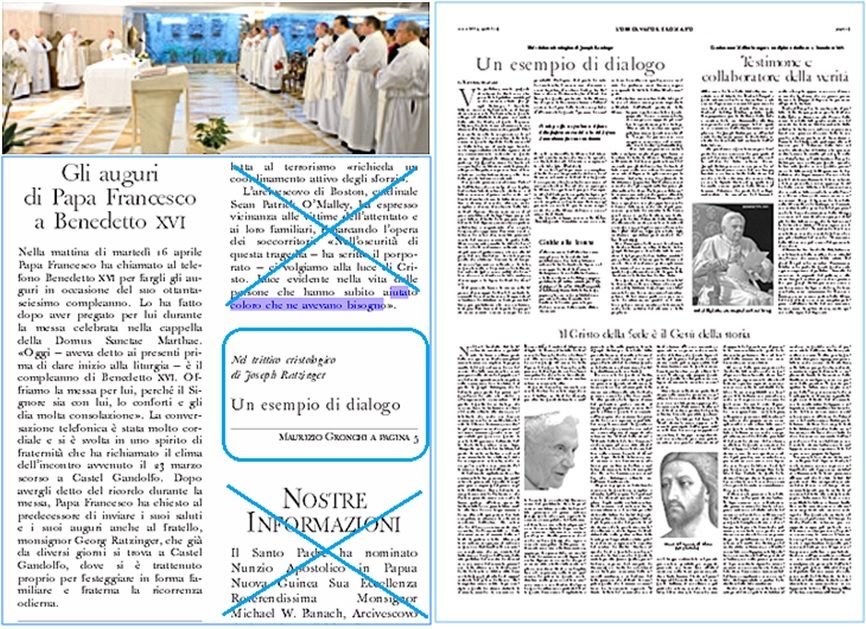 On April 17, 20l3, the OR, which carried not a single line about Benedict XVI's birthday in its April 16 issue, did report on Page 1 about Pope Francis offering his daily Mass and making a telephone call to Benedict XVI to greet him on his birthday. At the same time, it devoted an inside page to a couple of essays about the emeritus Pope's JESUS OF NAZARETH books...
An example of dialog:
On April 17, 20l3, the OR, which carried not a single line about Benedict XVI's birthday in its April 16 issue, did report on Page 1 about Pope Francis offering his daily Mass and making a telephone call to Benedict XVI to greet him on his birthday. At the same time, it devoted an inside page to a couple of essays about the emeritus Pope's JESUS OF NAZARETH books...
An example of dialog:
Benedict XVI's Jesus triptych
by Maurizio Gronchi
Translated from the 4/17/13 issue of

The public ministry, the Paschal event, and the infancy of Jesus are the three panels of the Christologic triptych offered to us by Joseph Ratzinger/Benedict VI in a manner that is traditional but also unusual.
Traditional insofar as it draws on the theological treatment of the mysteries of the life of Jesus, in the classical form that Thomas Aquinas presented it in classical form in his Summa theologicae. Unusual, because the author is “guided by the hermeneutic of the faith, but at the same time, taking account responsibly of the historical reason that is contained in that faith” (Jesus of Nazareth, Vol. II).
Thus, we are faced with a profound Christologic meditation which draws from the Gospels, including their background in the Old Testament, in the light of the Church’s great Tradition.
The Forewords for each of the three books clarify the intention of the author, who addresses two types of readers –the scholar of religion and the ordinary reader. To the scholar, he offers a confrontation with exegetic and historical literature. To the ordinary reader, the content of our faith in the Lord Jesus, presented simply and clearly.
Without sacrificing scientific rigor, the theologian Pope offers every reader the results of his own research “to know the face of the Lord” without any claims of speaking ex cathedra or magisterially.
Thus, one cannot fail to appreciate the humble and effortful effort of someone who, though invested with the supreme service of leading the universal Church, accepted the challenge of public contestation and cultural mediation in examining the texts most dear to Christians about their founding figure.
Therefore, what we have is both a cultural as well as a faith operation, since it places the message and the figure of Jesus of Nazareth at the disposal of everyone, believers (all who can read) as well as those who do not share the Christian faith.
His personal work of research on the figure and message of Jesus showed the need to confront historico-critical exegesis and undertake a constructive dialog in order to contribute to its theological evolution. The Pope intended this work as a service by way of conducting an inquiry.
From the standpoint of content, the Pope’s work has shown clearly and without effort the continuous dialog between the Old and New Testaments, between the Jesus of the Gospels and the Jesus professed by the faith [Is there a difference? I think he means ‘the Jesus of the Gospels’ and ‘the Jesus according to historico-critical exegetes'), between the rigor of scientific research and the theological illumination of the Gospel sources.
Through this process of ‘renewal in continuity’, the Church of the future can orient herself with her eyes fixed on Jesus – he who gives both the beginning and the fulfillment of the faith (cfr Heb 12,2).
That a theologian-Pope could bring to bear a long life of study and reflection on the mystery of Jesus Christ is a grace given to us for which we must thank God. But its consequence for the Church today perhaps is in the ongoing dialog among exegetes, theologians and pastors. In other words, what has been going on, in a singular manner, with the author, represents a model for the various components of the Church who study and announce Christ.
From what we read in Benedict XVI’s Verbum Domini [his post-Synodal Apostolic Exhortation on the Word of God], this is a task that must not only be placed on the agenda of the Church, but an exercise to be carried out without fear, even with the awareness of all the difficulties it entails.
“The authentic hermeneutic of faith carries with it some important consequences for the pastoral activity of the Church. The Synod Fathers recommended, for instance, a more assiduous contact among pastors, theologians and exegetes. It would be good for the bishops’ conferences to favor encounters that will promote such a communion in the service of the Word of God” (Proposition 28).
Such a cooperation would help everyone to carry out their own work for the benefit of the whole Church. In fact, to have this clear in the perspective of pastoral work means, even for scholars, to read Sacred Scripture as a communication from the Lord to men for their salvation.
Therefore, as the Dogmatic Constitution Dei Verbum says, it is recommended that “Catholic exegetes and others who cultivate sacred theology, collaborating together with zeal, do all they can in order that, under the vigilance of the Sacred Magisterium, they may study and explain with appropriate teaching aids, so that the greatest number possible of ministers of the Divine Word, are up to the task of offering fruitfully to the People of God the nourishment of the Scriptures to enlighten the mind, to sustain the will, and to inflame the hearts of men with love of God [Dei verbum,23)]” (Benedict XVI, Verbum Domini, 45).
With the image of Jesus’s blessing hands raised high, the Holy Father Joseph Ratzinger/Benedict XVI concluded the 876 pages of his Christologic triptych, his last great act of love for the Church and for the world. [Next to last! The last was his renunciation of the Papacy.]
With the same gesture, he had started his Pontificate, appearing as Pope for the first time in the central loggia of St. Peter’s Basilica.
With the same gesture of hope, he bade farwell to the world in his last General Audience on February 27, 2013, after having chosen freely to renounce the Petrine ministry.
We are grateful to him, not because he chose to retire, but because he was a good father and a reliable teacher, and so he will be even from the cathedra of silence and prayer.
The Christ of faith and the Jesus of history:
Joseph Ratzinger’s Christological triptych
Translated from the 4/17/13 issue of

In 2012, Benedict XI finally finished and published the third and last part of his work on Jesus, around 900 pages written from 2004-2012. An exceptional and unprecedented fact in the history of the Papacy, just as the profile of Joseph Ratzinger – who dedicated the first fifty years of his life to study and university teaching – has been truly singular in the succession of Popes.
The profile is that of a theologian who knows Christian tradition well and is very attentive to history, an intellectual who never abandoned his reading and research, despite his new and grave responsibilities as a bishop, and later as the responsible authority for the doctrinal organism of the Church, and finally as Pope.
The worldwide impact of the three books, from the mediatic angle and the success they have had with readers, has been of remarkable consequence even if the intentions and the real weight of the work have somehow been obscured. [???]
The first chapter of the third volume, dedicated to the canonical Gospel accounts of the childhood of Jesus, and which the author presents as a brief prologue to the entire work, says it explicitly, beyond the Forewords for each of the three books (of which the first has the greatest weight and breadth).
It is a little book written at the end of long study in which one finds, beyond an explanation of the Gospel texts, the author’s concluding reflections. An author who has the gift, unanimously acknowledged, of going to the essence and of clarity in the service of being able to speak to everyone.
The third volume opens with a scene - almost a flashback to the previous narrative which began with the Baptism on the Jordan, and therefore the start of the public life of Jesus – from John’s account of the last hours of Jesus when he was brought to Pontius Pilate, who represented the imperial power of Rome.
Pilate asked him, “Where do you come from?” (19,9). A question that is immediately placed alongside that asked by some residents of Nazareth in the Gospel of Mark: “Is this not the carpenter, son of Mary, brother of James, Jude and Simon? And are his sisters not among us?” (6,3).
At the heart of the entire work is the question about who Jesus is, as presented in the two Gospel texts cited, from persons who saw him as just another person but who did seem to sense dimly at the same time that he was different.
To this question, which has recurred down the centuries, the author has responded with his triptych on Jesus of Nazareth, three-fourths of it written during and despite the immense burden of the Pontificate. According to the Foreword of Volume 1. which examines the Gospel texts of the life of Jesus from his Baptism on the Jordan to the Transfiguration, he decided to undertake this work “after a long interior journey”.
In the Foreword to Volume II (2011), which follows the Gospel narratives from Jesus's entry into Jerusalem to the Resurrection, he expresses the hope that “I have been able to come close to the figure of our Lord in a way that can be useful to all readers who which to encounter Jesus and to believe in him”. To the hope expressed in the foreword to Volume III, that in this way, he may be able “to help many persons in their journey towards and with Jesus”.
A work therefore of spiritual reflection? Certainly, this dimension is explicit and present in these pages, signed by Joseph Ratzingfer/Benedict XVI to underscore its nature as a personal study that does not claim papal authority (even if the distinction, which is very clear, is subtle and objectively not easy to make) [The writer of this article is creating a difficulty where there is none. How can the distinction be ‘very clear’ and then be called ‘subtle’? And no one has had any difficulty in understanding that Benedict XVI, even if he published all three books as Pope, is not presenting the JESUS books as part of his Magisterium, only as part of his personal theological work.]
But it is not merely a spiritual reflection, as the Foreword to Volume 1 makes clear. The work also illustrates the tension between the two classic poles of scientific research on the life of Jesus that has gone on for more than two centuries. In other words, from the historical figure of the Judean preacher who lived in the time of the emperors Augustus and Tiberius, how much is conserved in the image evoked by the writings of his first followers, especially those of the canonical Gospels?
Thus, the question concerns – following a now-classic scheme – the relationship between ‘the Jesus of history’ and ‘the Christ of the faith’ – two dimensions that increasingly grew wider apart in the 20th century after the work of Rudolf Bultmann, to the point of casting doubt and historically discrediting the sources of the Gospel. A critical point that Joseph Ratzinger met head on in the JESUS OF NAZARETH books from the outset.
The work thus examines the simple and radical question about the figure of the preacher from Nazareth who is present in all the New Testament books. What happened in the two decades between his crucifixion and the Christology that is attested by the letters of
St. Paul?
To this question, the author replies: “Is it not more logical, even from the historical angle, that the greatness was there from the beginning, and that the figure of Jesus had shattered all available categories that it could be understood only by starting from the mystery of God?” He answers Yes, and by doing so, overturns the thesis according to which high Christology (such as that expressed in the Gospel of John) was the fruit of subsequent theological elaboration by the Christian communities.
He is convinced that the Jesus of the Gospels – whom 20th-century research has called ‘the Christ of the faith’ – coincides with the historical Jesus: “I am cnonvinced of this, and I hope that the reader will agree, that this figure is much more logical, and from the historical point of view, even more understandable then the reconstructions which we have been presented with in recent decades. I maintain that this Jesus – the Jesus of the Gospels – is a figure who is historically sensible and convincing”.
The insistence on historical truth brings Ratzinger in his second Foreword to say that he has not attempted to write a Christology, but “to find the true Jesus”, on the basis alone of which a ‘Christology from the base’ can be possible.
The historical Jesus, as he appears in the main current of historic-critical exegesis on the basis of its assumed hermeneutic, is too insignificant in substance to have exercised such a great historical power. Moreover, he is too circumscribed by the past to make it possible to have a personal relationship with him.
And finally, in the Foreword to Volume III, the statement that “one cannot just leave the (Gospel) texts in the past” because in the face “of a text like the Bible, whose ultimate and most profound author, according to our faith, is God himself, the question about the relationship of the past with the present becomes indispensably part of the same conclusion". With which the seriousness of historical research is not diminished but augmented.
At the heart of Benedict XVI’s concerns – and in this work, he shows once again that he is both a theologian who is rigorously mindful of history as well as a wise pastor – is once more the credibility of the faith and its compatibility with reason. Which nonetheless do not coincide, even if reason is no foe to the heart from which the work was born.
Indeed, Joseph Ratzinger continues, with methodological awareness, in the Foreword to Volume I: “Of course, to believe that though he was a human being, he was God, and that he had made this known indirectly through his parables in a manner that became increasingly clear, goes well beyond the possibilities of the historico-critical method. On the contrary, if in the light of this conviction of faith, the texts are then read through the historico-critical method, by opening up to something far greater, these texts will disclose a life and a figure worthy of faith”.
For Benedict XVI, therefore, if the perspective of faith is quite distinct from that of history, neither is it in opposition to it, but that both perspectives enrich each other.
In the Preface to Volume II, Benedict XVI refers once more to historic-critical exegesis. He notes with satisfaction the reactions to Volume I and “the fact that the discussion over the method and hermeneutic of exegesis as well as of exegesis as a historical discipline that is also theological, is becoming more lively, notwithstanding the not inconsiderable resistance to new steps forward”.
After Volume I was published, some critics wrote that Joseph Ratzinger showed adequacy in employing the historico-critical method while having a dismissive attitude, although in the Foreword to that volume, he expressed great acknowledgment for the contributions of the method, calling it “an irremovable dimension of exegetical work’ and as a method that is “indispensable in considering the structure of the Christian faith”.
Of course, he also underscores the limitations of the method, because “individual Biblical texts must somehow relate to the vital process of Scripture which is at work in the texts”. In other words, the Biblical texts must be “reprised, understood and read in a new way. In re-reading, in progressive reading, through corrections, analyses and amplifications, the formation of Scripture is configured as a process of the word”.
In this perspective, the Bible is better understood through ‘canonical exegesis’ which developed in the United States especially during the 1980s, characterized by reading and interpreting Scriptural texts in relation to the whole as articulated in the canons of Judaism and Christianity.
Rztzinger defines it as ‘reading single texts from the Bible in the context of its entirety’, underscoring that it is “an essential dimension of exegesis that is not in opposition to the historico-critical method, but develops it in an organic manner to arrive at true and proper theology.”
In short, faith and history are woven together in the Pope’s work on Jesus, which has both heart and reason, to interpellate the reader, as he summarizes it well in the Foreword to Volume III: “Is it true what has been said? Does it concern me? If it does, how?”
Dense with content and at the same time fluid reading, the almost 900 pages of JESUS OF NAZARETH teem with topical themes and can be read at various levels. With many emphases and important statements that will certainly have consequences.
Among this, his attention to Judaism in Jesus’s time, his evident interest in an increasingly more profound relationship with contemporary Judaism, his ecumenical openness, the unified view of the Gospels with his evident and significant appreciation of the Gospel of John, and his dialog with contemporary Catholic and Protestant exegesis.
And through it all, the work captivates and fascinates with evident immediacy because of the personal involvement of the author. As the Swabian Lutheran Johann Albrecht Bengel, who had been one of the founders of textual analysis of the New Testament in the 18th century, advocated in Latin, "Apply yourself wholly to the text: apply the whole matter to yourself".
[Modificato da TERESA BENEDETTA 20/04/2013 11:49] |
| |
 19/04/2013 14:52 19/04/2013 14:52 |
|
| | | OFFLINE | | Post: 26.582
Post: 9.068 | Registrato il: 28/08/2005
Registrato il: 20/01/2009 | Administratore | Utente Master | |
|





On what would have been the completion of
THE EIGHTH FULL YEAR
OF YOUR BLESSED PONTIFICATE...
AD MULTOS ANNOS, SANCTE PATER EMERITE!
THANK YOU FOR ALL YOU HAVE BEEN
AND CONTINUE TO BE
FOR THE CHURCH, THE WORLD, AND ALL OF US.
WE COULD NEVER LOVE YOU ENOUGH.

 
 Friday, April 19, Third Week of Easter
Friday, April 19, Third Week of Easter
 Today's saints:
Today's saints:
 BLESSED LUCHESIO AND BUONADONNA (Italy, d 1260), Husband and Wife, First Lay Franciscans
BLESSED LUCHESIO AND BUONADONNA (Italy, d 1260), Husband and Wife, First Lay Franciscans
Luchesio was said to have been a ‘greedy merchant’ who lived in Poggibonzi near Siena and was probably born in the late 12th century since he met Francis of Assisi in 1213, an event that changed his life. He began to perform acts of charity. This troubled his wife Buonadonna who thought he was giving away too much. One day she answered the door to another stranger in need, and her husband told her to give him bread. Unhappy about this, she went to the pantry anyway, where she found more bread than there had been. This changed her own outlook. They sold their business, turned to farming to provide for their needs and to help others. At that time, some pious couples, with the Church’s consent, separated to become religious, or to join a group like Francis’s, if they were childless or if their children were grown up. Francis set up the secular Franciscan order (the so-called third Order) to accommodate couples like Luchesio and Buonadonna who wanted to share religious life but outside the cloister. The couple from Poggibonzi became the first lay Franciscans. Pope Honorius approved their Rule in 1221. As with many other saints, the couple never seemed to lack for resources to help those who came to them. They died on the same day in 1260, and he was beatified in 1273. She was never formally beatified but she has been venerated as Blessed like her husband.
Readings for today's Mass: www.usccb.org/bible/readings/041913.cfm
AT THE VATICAN TODAY
Pope Francis met with
- H.E. Rafael Correa Delgado, President of the Republic of Ecuador, with his delegation
- His Beatitude Ignace Youssif III Younan, Patriarch of Antioch of the Syrians (based in Lebanon)
- H.E. Antun Sbutega, Ambassador from the Republic of Montenegro, on his farewell visit.
One year ago today...

April 19, 2012
- I do not know what mindless people at the CDF or the Vatican Press Office decided that today was the day to release the report on the apostolic visitation of women religious orders in the United States - since all the headlines read 'VATICAN CRACKS DOWN ON U.S. NUNS' and the main target group that was found to habitually disseminate anti-Catholic ideas immediately took the occasion to say the 'crackdown' was because of the nuns' support for Obamacare and his attempts to violate freedom of conscience in the implementation that law!... Good intentions and charitable work do not excuse lying, as in this absurd statement, much less the habitual violation of the sisters' vows of obedience to the Magisterium which apparently they never intended to observe. Perhaps worse than disobedience is their overriding sin of pride and ego-above-all.
As for the usual media hamhands at the Vatican, could they not have left this week at least free of any occasions that could possibly bring new hurt (I mean the media reaction) to our beloved Pope?...

- On a happy note, those who may want to relive the days that led to the election of Benedict XVI {with pictures and news accounts of the day-to-day events, all the way to the Mass to inaugurate his Petrine Ministry), along with how various individuals experienced it and reacted to it, may want to check out, if they have not seen it before, a special section entitled THE EXPERIENCE OF APRIL 19, 2005 in the PAPA RATZINGER FORUM at this link:
freeforumzone.leonardo.it/discussione.aspx?idd=354517&p=1
It never fails to bring back all the emotions - and floods of joyous and sentimental tears! The scene is indelibly etched in our memory but always worth reliving.
And herewith, my favorite personal recollection about Benedict XVI:
 Perhaps of all the words that the Holy Father said during his never-to-be-forgotten visit to the United States and to the United Nations - and every word was precious and significant - what will remain etched in my brain are the spontaneous words he spoke to thank the congregation at St. Patrick's for remembering the third anniversary of his Pontificate. All the more since I heard the words 'directly' as he spoke them, through the front-door speakers of the cathedral's audio system. These were his extemporaneous words delivered in English:
Perhaps of all the words that the Holy Father said during his never-to-be-forgotten visit to the United States and to the United Nations - and every word was precious and significant - what will remain etched in my brain are the spontaneous words he spoke to thank the congregation at St. Patrick's for remembering the third anniversary of his Pontificate. All the more since I heard the words 'directly' as he spoke them, through the front-door speakers of the cathedral's audio system. These were his extemporaneous words delivered in English:
At this moment I can only thank you for your love of the Church and Our Lord, and for the love which you show to this poor Successor of Saint Peter.
I will try to do all that is possible to be a worthy successor of the great Apostle, who also was a man with faults and sins, but remained in the end the rock for the Church.
And so I too, with all my spiritual poverty, can be for this time, by virtue of the Lord’s grace, the Successor of Peter.
It is also your prayers and your love which give me the certainty that the Lord will help me in this my ministry. I am therefore deeply grateful for your love and for your prayers.
And my answer to all that you have given to me in this moment and this visit is my blessing at the end of the Holy Mass.
- BENEDICT XVI
St. Patrick's Cathedral, New York
April 19, 2008.
 2013 P.S. I have been extremely remiss not to have taken note earlier that five years ago, Benedict XVI undertook an apostolic visit to the United States on April 15-22, during which he also addressed the United Nations.
2013 P.S. I have been extremely remiss not to have taken note earlier that five years ago, Benedict XVI undertook an apostolic visit to the United States on April 15-22, during which he also addressed the United Nations.
 For an extensive coverage of that visit, please visit the special thread dedicated to it in PAPA RATZINGER FORUM, starting on Page 15
For an extensive coverage of that visit, please visit the special thread dedicated to it in PAPA RATZINGER FORUM, starting on Page 15
freeforumzone.leonardo.it/discussione.aspx?idd=7092407&p=15
The earlier pages were devoted to all the material leading up to the visit.

 One must note with regret that today's issue of L'Osservatore Romano does not devote a single word to the anniversary of Benedict XVI's election, although it had a news item about Fr. Lombardi receiving a 'Communicator of the Year' award from some insurance group. Nor did the OR remember Benedict XVI on his 86th birthday, although the following day, April 17, it had a full page containing three articles about his JESUS OF NAZARETH books [about which more later, in a belated post for which I have left some space above], but without any reference to his 86th birthday. Thankfully, the Italian service of Vatican Radio has not been remiss on both anniversaries, and today it features interviews with Mons. Vincenzo Paglia, president of the Pontifical Council for the Family, and with Mons. Marcello Semeraro, Bishop of Albano, which is the diocese of Castel Gandolfo.
One must note with regret that today's issue of L'Osservatore Romano does not devote a single word to the anniversary of Benedict XVI's election, although it had a news item about Fr. Lombardi receiving a 'Communicator of the Year' award from some insurance group. Nor did the OR remember Benedict XVI on his 86th birthday, although the following day, April 17, it had a full page containing three articles about his JESUS OF NAZARETH books [about which more later, in a belated post for which I have left some space above], but without any reference to his 86th birthday. Thankfully, the Italian service of Vatican Radio has not been remiss on both anniversaries, and today it features interviews with Mons. Vincenzo Paglia, president of the Pontifical Council for the Family, and with Mons. Marcello Semeraro, Bishop of Albano, which is the diocese of Castel Gandolfo.
My initial survey today shows only one acknowledgment of this anniversary for Benedict XVI - that of Father Z, which is cited in the UK Catholic Herald's 'morning Catholic must-reads', without the CH itself making its own acknowledgment of the anniversary. Nothing illustrates better the infinite gulf between being Pope and being no-longer Pope. Of course, the Church can only have one Pope at a time, but that does not excuse an overt snub of the emeritus Pope's important anniversaries when he is still very much alive.
[Modificato da TERESA BENEDETTA 19/04/2013 16:35] |
| |
 19/04/2013 17:01 19/04/2013 17:01 |
|
| | | OFFLINE | | Post: 26.583
Post: 9.070 | Registrato il: 28/08/2005
Registrato il: 20/01/2009 | Administratore | Utente Master | |
|
 As editor Carl Olson promised, CWR does mark the eighth anniversary of Benedict XVI's Pontificate with this article by Tracey Rowland, a leading analyst of the emeritus Popo's Magisterium.
Benedict XVI and the end
As editor Carl Olson promised, CWR does mark the eighth anniversary of Benedict XVI's Pontificate with this article by Tracey Rowland, a leading analyst of the emeritus Popo's Magisterium.
Benedict XVI and the end
of the 'Virtual Council'
Up to the final days of his pontificate, Benedict XVI emphasized the importance
of interpreting the Council in continuity with what came before it.
by Tracey Rowland

April 2013 issue
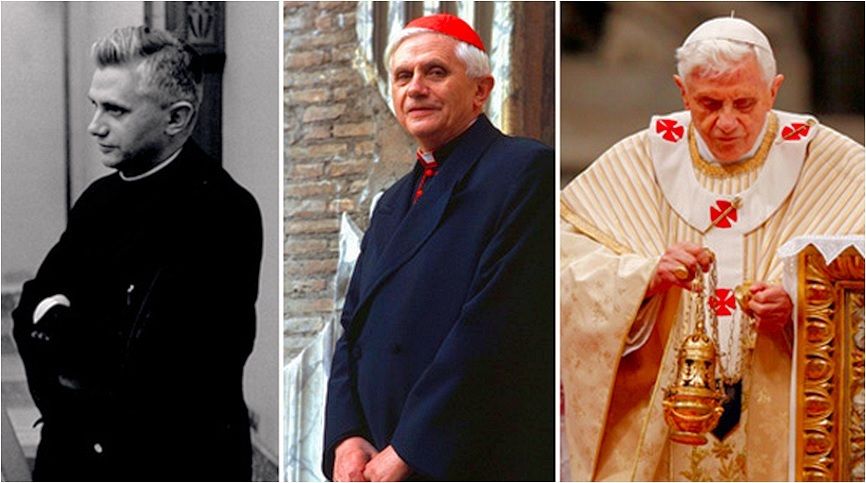
In one of the last acts of his pontificate, Benedict XVI gave an address to the clergy of the Diocese of Rome on the Second Vatican Council. In the address he drew a distinction between what he termed the Virtual Council, or Council of the Media, and the Real Council or Council of those who actually produced the documents.
He observed that since the Council of the Media was accessible to everyone (not just to students of theology who studied the documents), it became the dominant interpretation of what happened at Vatican II, and this created “many disasters” and “much suffering.”
Specifically, he mentioned the closure of seminaries and convents, the promotion of banal liturgy, and the application of notions of popular sovereignty to issues of Church governance. He concluded, however, that some 50 years after the Council, “this Virtual Council is broken, is lost.”
From what comes across my desk in theological literature there is still a lot of life in the Virtual Council, though it is true that it holds no enchantment for young seminarians or members of new ecclesial movements. Thus, the Church of the future, as a matter of demography, will be more closely oriented to the documents of the Real Council.
The end of the “Virtual Council”
When Blessed John Paul II lay dying he said to the youth who had travelled to Rome to offer their prayerful support: “I have searched for you, and now you have come to me, and I thank you.”
Less irenically he might have said, “I have tried to get through to you, notwithstanding layers and layers of deaf and dumb bureaucrats, and now that I am dying, the fact that you are here means that at least some of you understood, and this is my consolation.”
Similarly, Benedict seemed to be saying to the clergy of Rome, notwithstanding all the banality, all the pathetic liturgies, all the congregationalist ecclesiology, the Virtual Council of the Media has lost its dynamism. It is no longer potent. It no longer sets the course of human lives; it no longer inspires rebellion. It too has become boring and sterile.
In this particular address Benedict divided the documents of the Council into two broad categories: first, there were the documents inspired by what he called the “Rhineland alliance”—the network of young theologians from France, Germany, Belgium, Holland, and Austria. These were the documents on the liturgy (Sacrosanctum Concilium), on the Church (Lumen Gentium), on Scripture, Tradition and Revelation (Dei Verbum) and on ecumenism (Unitatis Redintegratio).
In some ways these documents were mopping up the unfinished business of the First Vatican Council, which was brought to an untimely end by the Franco-Prussian war. Certainly, the theology which underpinned these documents had been developing in the decades between the two world wars and did not suddenly crop up at the Council.
While the members of the Rhineland alliance were interested in ecclesiology and liturgical theology, ecumenism and scriptural exegesis, the Americans wanted a declaration on religious liberty to deal with their politico-theological problems, the French were similarly concerned with the whole complex phenomenon of modernity, and yet others, deeply horrified by what had happened to the Jewish people in ostensibly Christian countries, saw the need for some statement about the covenant of the Old Testament and Judaism in general. As a consequence, the documents Dignitatis Humanae, Nostra Aetate, and Gaudium et Spes became a second “very important trilogy.”
Revelation and ecclesiology
Of all these documents the two closest to the heart of Ratzinger/Benedict were Dei Verbum, the Dogmatic Constitution on Divine Revelation, and Lumen Gentium, the Dogmatic Constitution on the Church.
As a young conciliar peritus (expert theological advisor), Professor Ratzinger was involved in the drafting of Dei Verbum, and his patron Cardinal Frings also intervened extensively in the debate on this document.
Ratzinger’s reflections on these interventions were published in an article in the journal Communio in 1988. In this article he recalled Cardinal Frings’s argument that when one speaks of the two sources of revelation as Scripture and tradition one is right at the level of epistemology; we do experience what revelation is from Scripture and from tradition.
Nonetheless Frings also argued that the “Scripture and tradition two-sources formula” was false if looked at from a metaphysical perspective, since both Scripture and tradition flow from revelation as their common source. The problem with the epistemological focus is that “if one does not hold that revelation precedes its objectification in Scripture and tradition, remaining always greater than they, then the concept of revelation is reduced to the dimensions of the historical and simply human.”
In Dei Verbum the Fathers of the Council overcame various theological problems by holding that Christ himself is the revelation of God the Father to humanity and that both Scripture and tradition flow from this revelation.
Dei Verbum is thus a classic example of how the Council reformed an area of theology which had given rise to a rather large number of problems from at least as far back as the 16th century.
In particular, in an article published in 1969 in Herbert Vorgrimler’s Commentaries on the Documents of the Council, Ratzinger stated that in the drafting of Dei Verbum the Council Fathers were “concerned with overcoming neo-scholastic intellectualism, for which revelation chiefly meant a store of mysterious supernatural teachings, which automatically reduces faith very much to an acceptance of these supernatural insights.”
This was the archetypically Suarezian account of revelation which contemporary historical scholarship (see for example, the work of John Montag), now regards as a reversal of the position of classical Thomism. For Suarez, revelation did not disclose God himself, but rather pieces of information about God.
When Ratzinger was a student the Suarezian account was dominant, to such a degree that when he criticised it in his habilitation thesis, preferring the position of St. Bonaventure, he was forced to withdraw the criticism or suffer the penalty of not passing the thesis. At Vatican II, however, the Council Fathers were persuaded of the merits of the approach advanced by Cardinal Frings, which had no doubt been influenced by the ideas of the young Professor Ratzinger.
While Dei Verbum addressed the topics of Scripture, tradition and revelation, Lumen Gentium focused on ecclesiology. The “reform” engendered here was one of moving away from a primarily juridical account of the Church focused on the distinction between clerical and lay members to an understanding based on multidimensional relationships.
With reference to the notion of sacramental relations, Henri de Lubac emphasised that the sacramental form of relationality is one that ties together the Church as the mystical body of Christ with the Church as the historical people of God. Moreover, the Church not only links the visible with the invisible, time with eternity, but also the universal and the particular, the Old and New Covenants. This link between the invisible and visible elements of ecclesial communion constitutes the Church as the sacrament of salvation.
Thus, in chapter 1 of Lumen Gentium one finds the following declaration:
Christ, the one mediator, set up his holy Church here on earth as a visible structure, a community of faith, hope and love; and he sustains it unceasingly and through it he pours out grace and truth on everyone. This society, however, equipped with hierarchical structures, and the mystical body of Christ, a visible assembly and a spiritual community, an earthly church and a church enriched with heavenly gifts, must not be considered as two things, but as forming a complex reality comprising a human and divine element. It is therefore by no mean analogy that it is likened to the mystery of the Incarnate Word.
Concomitant with this move away from a focus on a juridical notion of the Church, with its primary distinction between priestly and other religious members on the one side, and lay members on the other, was the Council’s endorsement of a universal call to holiness.
Notwithstanding this affirmation of a variety of spiritual missions in the life of the Church, some lay and some clerical, Lumen Gentium nonetheless affirmed the authority of the Petrine Office and the sacerdotal priesthood. There was nothing in this document that could in any way justify the subsequent attacks on the papacy and the priesthood which were some of the more infamous products of the Virtual Council in the decade of the 1970s and beyond.
“Theological Star Wars”
In 1972, Joseph Ratzinger, along with Hans Urs von Balthasar and Henri de Lubac, founded the theology journal which they named Communio. It would be too simplistic to describe it as a response to the Virtual Council because in addition to the Virtual Council there was also the Council of other Conciliar periti who, as the 1970s wore on, closely associated themselves with the rival journal Concilium.
The English historian Philip Trower has described the intellectual battle between the two different interpretations of the Council as presented in the pages of Communio and Concilium as “a theological star wars” played out over the heads of the faithful.
In other words, what people in parishes received as the “teaching of the Council” was often the residue of ideas floated by the former periti in one or other of these journals. Since the Concilium interpretations were often a lot closer to the interpretations of the Virtual Council, during the final years of the pontificate of Paul VI they tended to dominate.
However, in 1985 Blessed John Paul II called a synod to reflect on the various interpretations of the Council, and following this synod the Communio ecclesiology began to receive strong magisterial endorsement.
Pope Benedict obliquely referred to this in his address to the clergy of Rome. Speaking of the concept of communion, he remarked that although, philologically speaking, it was not fully developed at the Council, it was nonetheless as a result of the Council that “the concept of communion came more and more to be the expression of the Church’s essence, communion in its different dimensions: communion with the Trinitarian God—who is himself communion between Father, Son, and Holy Spirit—sacramental communion, and concrete communion in the episcopate and in the life of the Church.”
In this address he added that the application of the Communio ecclesiology to the life of the Church is “not yet complete” and that “more needs to be done.”
Interpreting 'Gaudium et Spes'
The Conciliar document which was least acceptable to Ratzinger/Benedict was Gaudium et Spes. Along with Cardinal Walter Kasper and others he argued that a major problem with this document is that it was poorly drafted. In particular the first sections were not well integrated with the later sections.
The anthropology of the first section has been described as “merely theistically coloured,” whereas the anthropology of later sections is explicitly Trinitarian. It is well known that Blessed John Paul II was deeply influenced by paragraph 22 of this document and that this particular paragraph looks as though it was lifted almost word for word from an earlier work of Henri de Lubac’s.
Paragraph 22 is explicitly Christocentric. Ratzinger/Benedict also strongly approved of Paragraph 22 and described the document as a whole as offering a “daring new” theological anthropology which he endorsed, although he thought it had not been well articulated.
As a consequence of the drafting issues and of the under-developed theology in some areas, Gaudium et Spes tended to give rise to two different interpretations of the relationship of the Church to the world and two different pastoral strategies.
In short-hand terms they could be described as the Christocentric Trinitarianism of John Paul II and Benedict, and the correlationism of theologians such as Edward Schillebeeckx. Both care about the “world” and regard it as the theatre of salvation. Neither favours a retreat to the ghetto. However, one looks for points of convergence between the faith and contemporary fashionable philosophies, the other is much more sacramental in its orientation and seeks to transform the world, to “restore all things in Christ.”
Another way to put this is to say that the correlationist strategy tends to separate “Christian values” from “Christian sacraments” and to find points of agreement between the so-called “Christian values” (distilled from actual belief in Christ and participation in the sacramental life of the Church) and non-Christian values.
The most common example of this is the promotion of Christian philanthropic projects. The idea is that the “sacramental stuff” is a private matter for private consumption while working for social justice is a public enterprise.
Today it is becoming increasingly common for Catholics who find themselves in debates with atheists to refer to the philanthropic works of the Church as a justification for the Catholic faith. Atheists typically respond with indignation because it is quite clear to them that it is possible to have philanthropy without being burdened by Christian morality.
Ratzinger took the atheists’ point in an article he published in 1969 on the subject of human dignity in Gaudium et Spes. He suggested that according to one reading of Gaudium et Spes (one might call it the Virtual Council reading, though he didn’t use that expression in 1969), there is no reason why the average person of good will should suddenly be burdened with the story of Christ. In other words, some readings of Gaudium et Spes beg the question: does the Incarnation actually make any difference?
If one zeroes in on paragraph 22 and treats it as the hermeneutical lens through which the remainder of the document is studied, then the Incarnation is absolutely central and not something that can be distilled.
In his Trinitarian encyclicals ( Redemptor Hominis, Dives in Misericordia, and Dominum et Vivificantem) John Paul II followed through the logic of this paragraph with the development of a theological anthropology which became one of the most significant theological achievements of his pontificate. Ratzinger/Benedict was completely behind this project.
Lessons in liturgy
In his own pontificate, however, Benedict focused more on the problem of Virtual Council interpretations of Sacrosanctum Concilium than on secularist renderings of Gaudium et Spes (which John Paul II had gone a long way toward resolving, at least at the intellectual level).
In his books A New Song for the Lord, Feast of Faith, and The Spirit of the Liturgy, and in his apostolic exhortation Sacramentum Caritatis, Ratzinger/Benedict offered a remedial liturgical theology.
In his address to the clergy of Rome he also offered the following summary of the Virtual Council’s approach to the liturgy:
There was no interest in liturgy as an act of faith, but as something where comprehensible things are done, a matter of community activity, something profane. And we know that there was a tendency, not without a certain historical basis, to say: sacrality is a pagan thing, perhaps also a thing of the Old Testament. In the New Testament it matters only that Christ died outside: that is, outside the gates, in the profane world. Sacrality must therefore be abolished, and profanity now spreads to worship: worship is no longer worship, but a community act, with communal participation: participation understood as activity. These translations, trivializations of the idea of the Council, were virulent in the process of putting the liturgical reform into practice; they were born from a vision of the Council detached from its proper key, that of faith.
If one combs through the many homilies and articles and books written by Ratzinger/Benedict for comments on the Council the consistent thread running through everything is that the Conciliar documents need to be read with a Christocentric Trinitarian accent.
The central message of Dei Verbum is that Christ is the revelation of the Father to humanity; the central message of Gaudium et Spes is that the Incarnation explains what it means to be human; the central message of Sacrosanctum Concilium /G] is that worship is about an encounter with God, a participation in the life of the Trinity, not mere duty parade; and the Communio theology implicit in Lumen Gentium is thoroughly Trinitarian.
When it comes to the relationship between the Old Testament and the New, it is Christ who is the bridge. Even “the sacred mystery of the unity of the Church…finds its highest exemplar and source in the unity of the Persons of the Trinity: the Father and the Son in the Holy Spirit, one God.”
There is nothing at all in this Trinitarian hermeneutic about Vatican II being a romance between the Holy Spirit and the Zeitgeist of the 1960s.
(Note: The treatment of Dei Verbum in this article is a redaction of a longer article on Joseph Ratzinger’s Hermeneutic of Reform published in Polish in the journal Ethos of the Catholic University of Lublin.)[Modificato da TERESA BENEDETTA 20/04/2013 05:37] |
| |
|
|
|
|